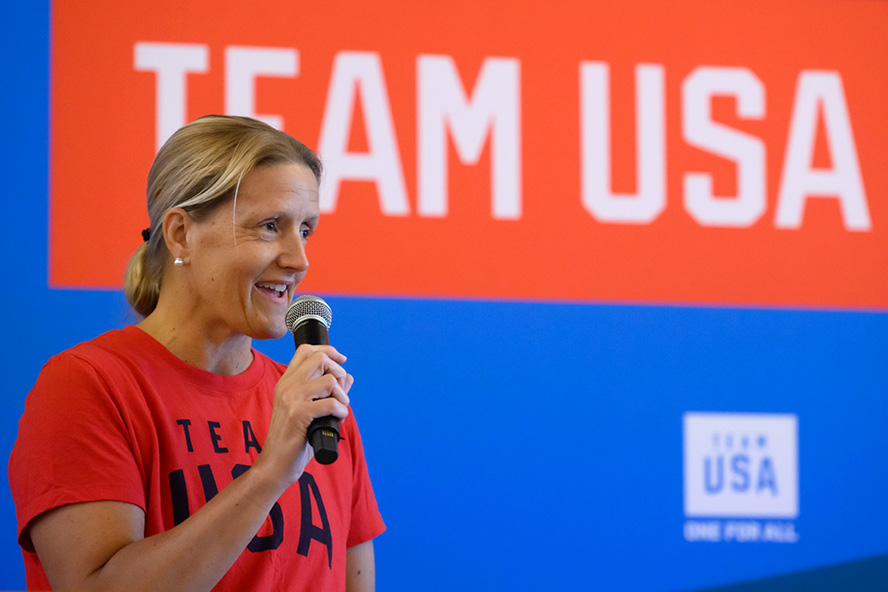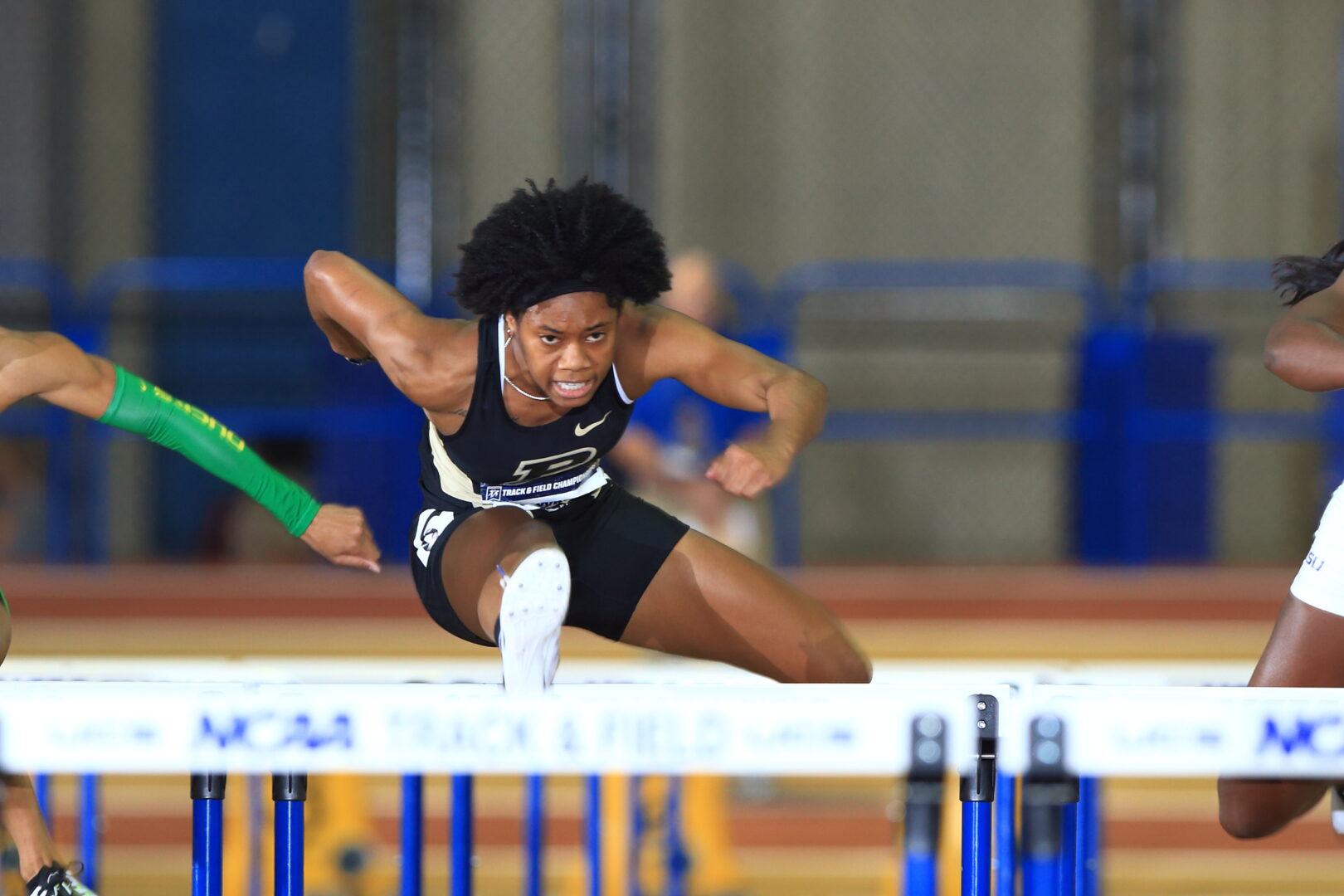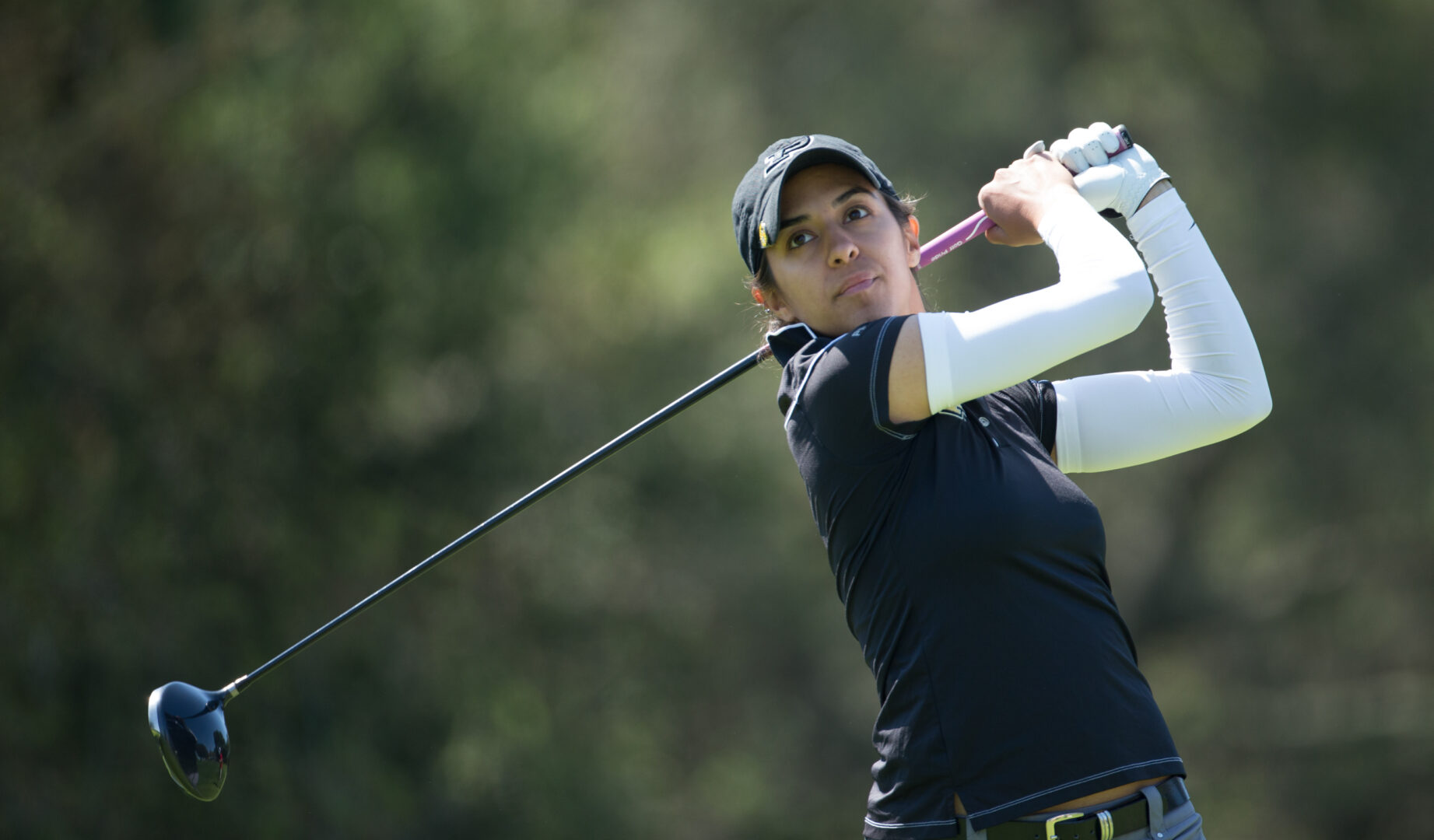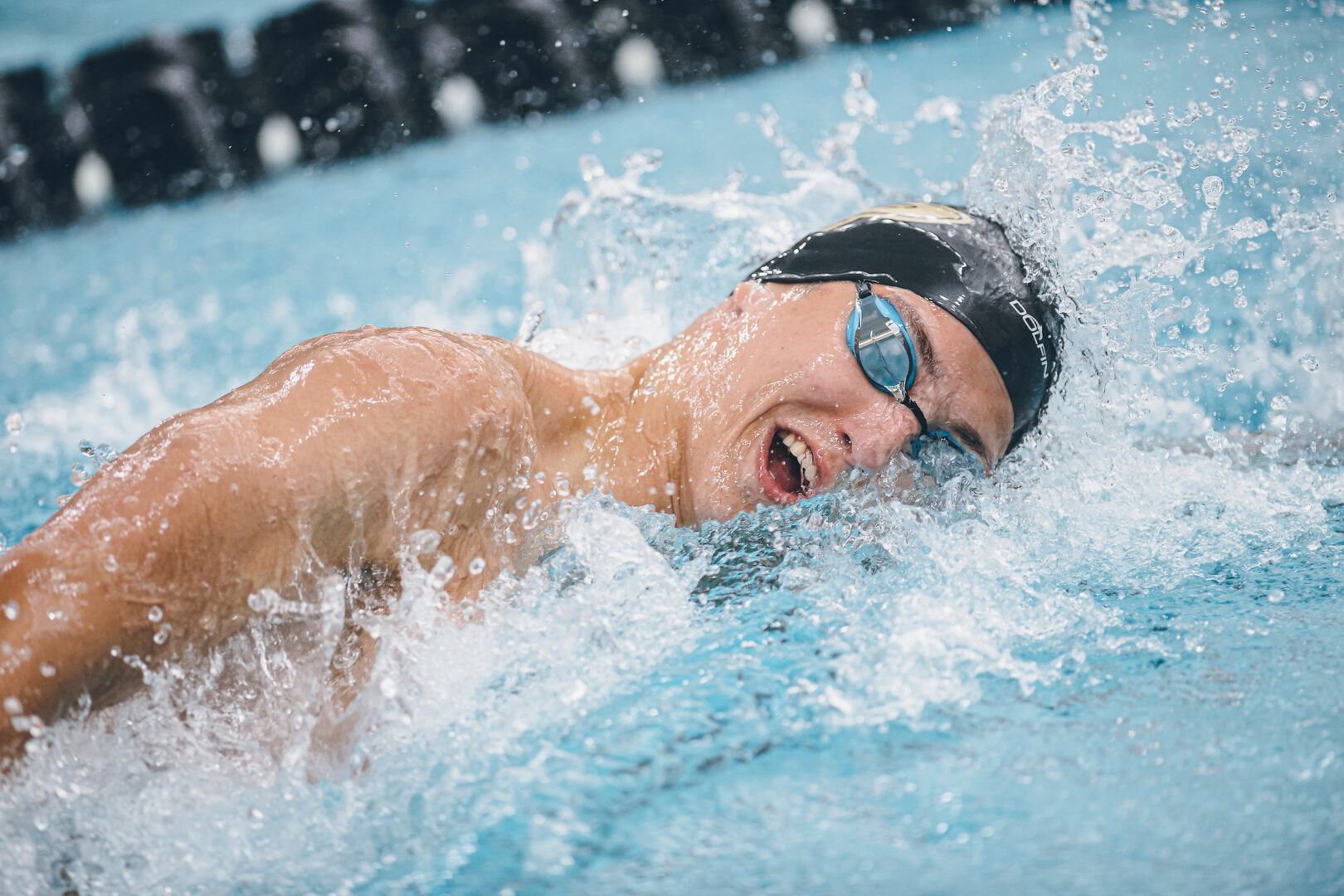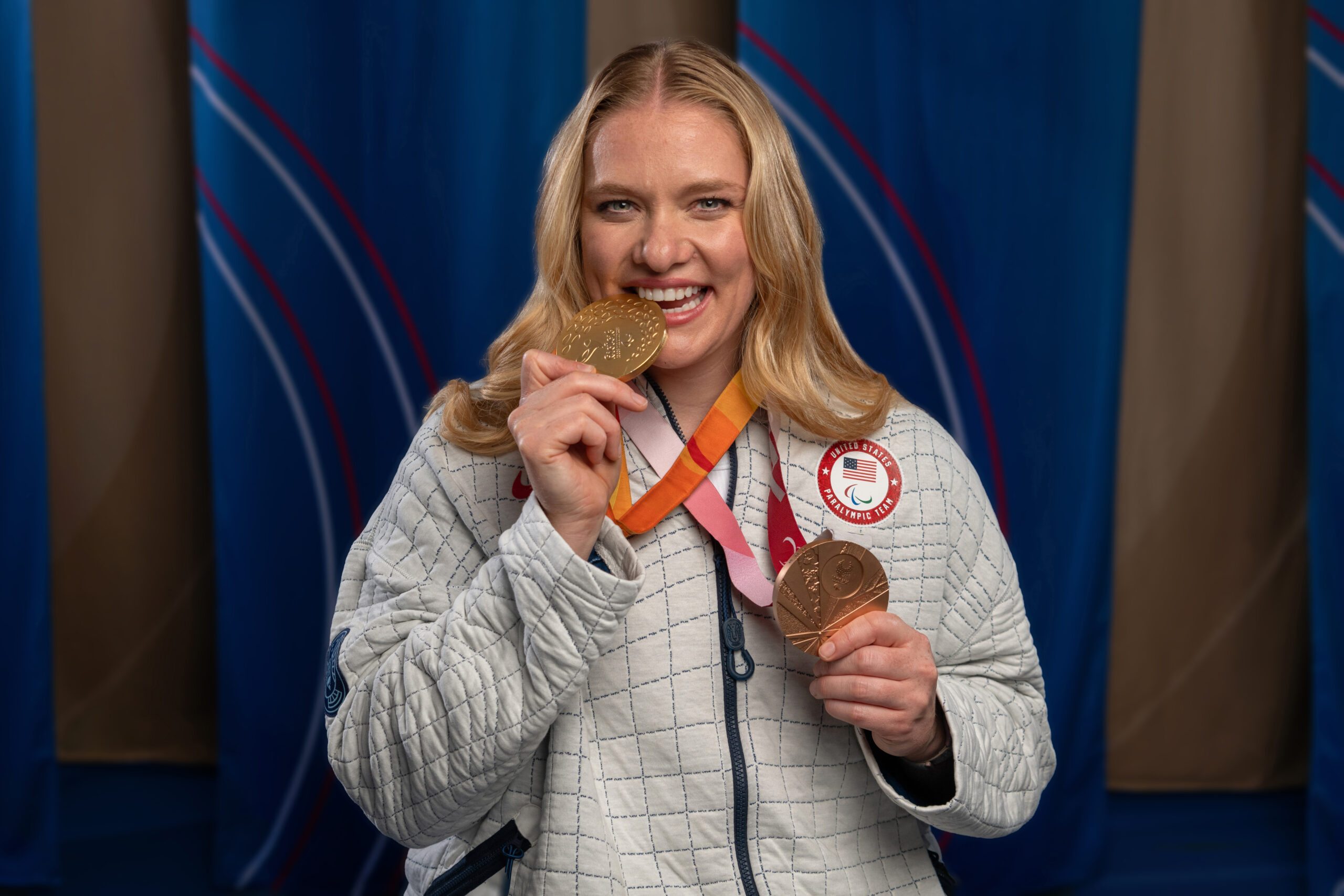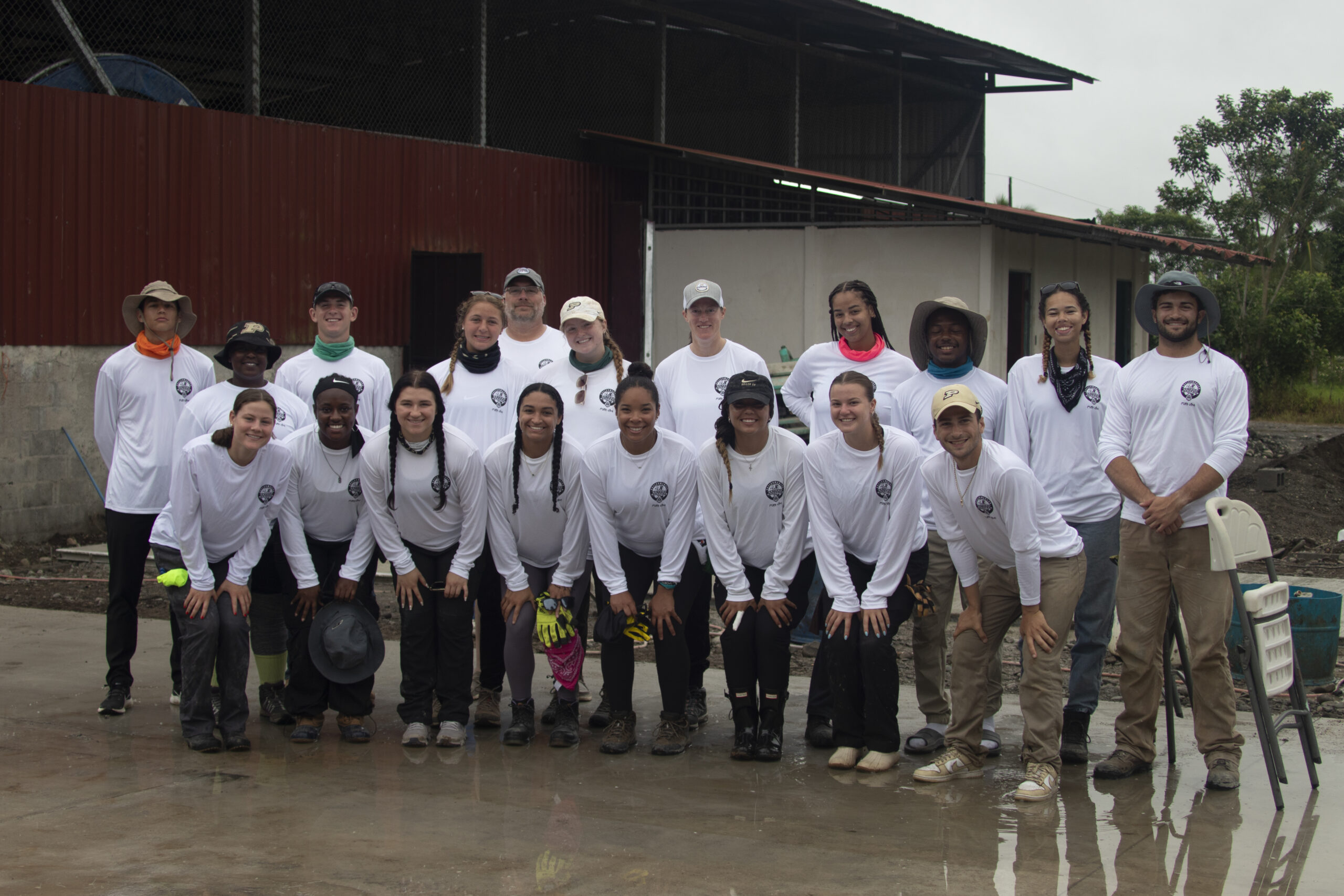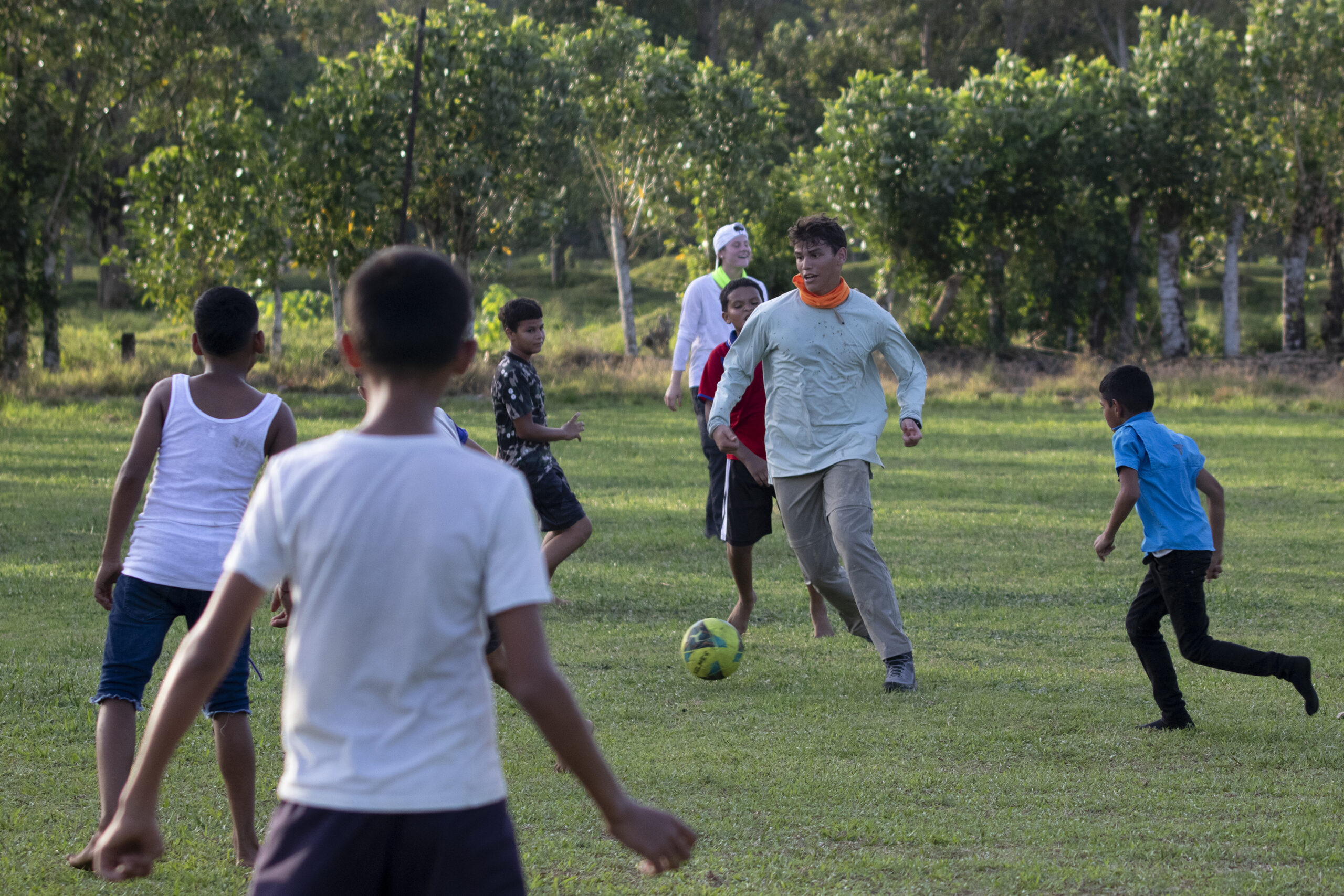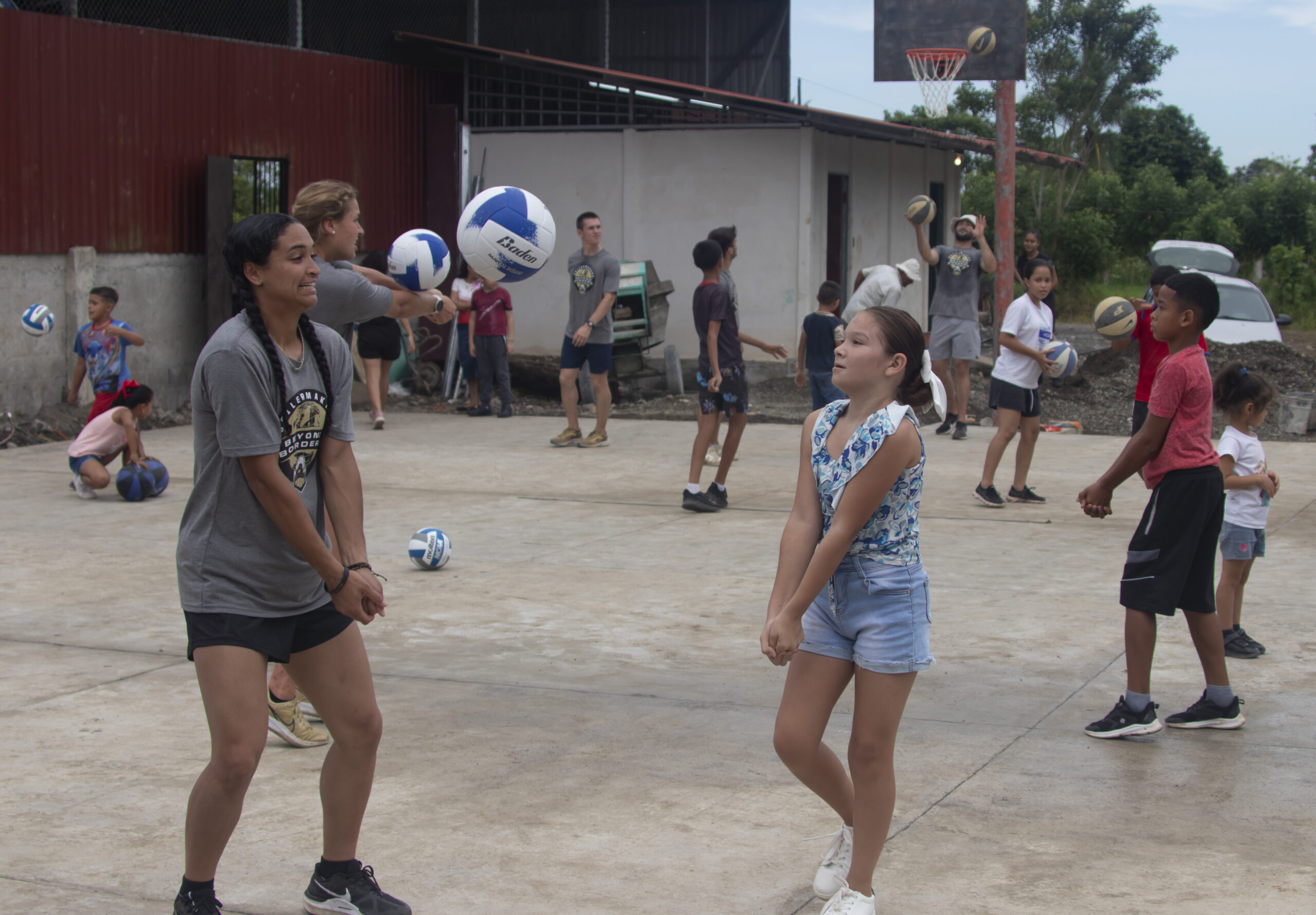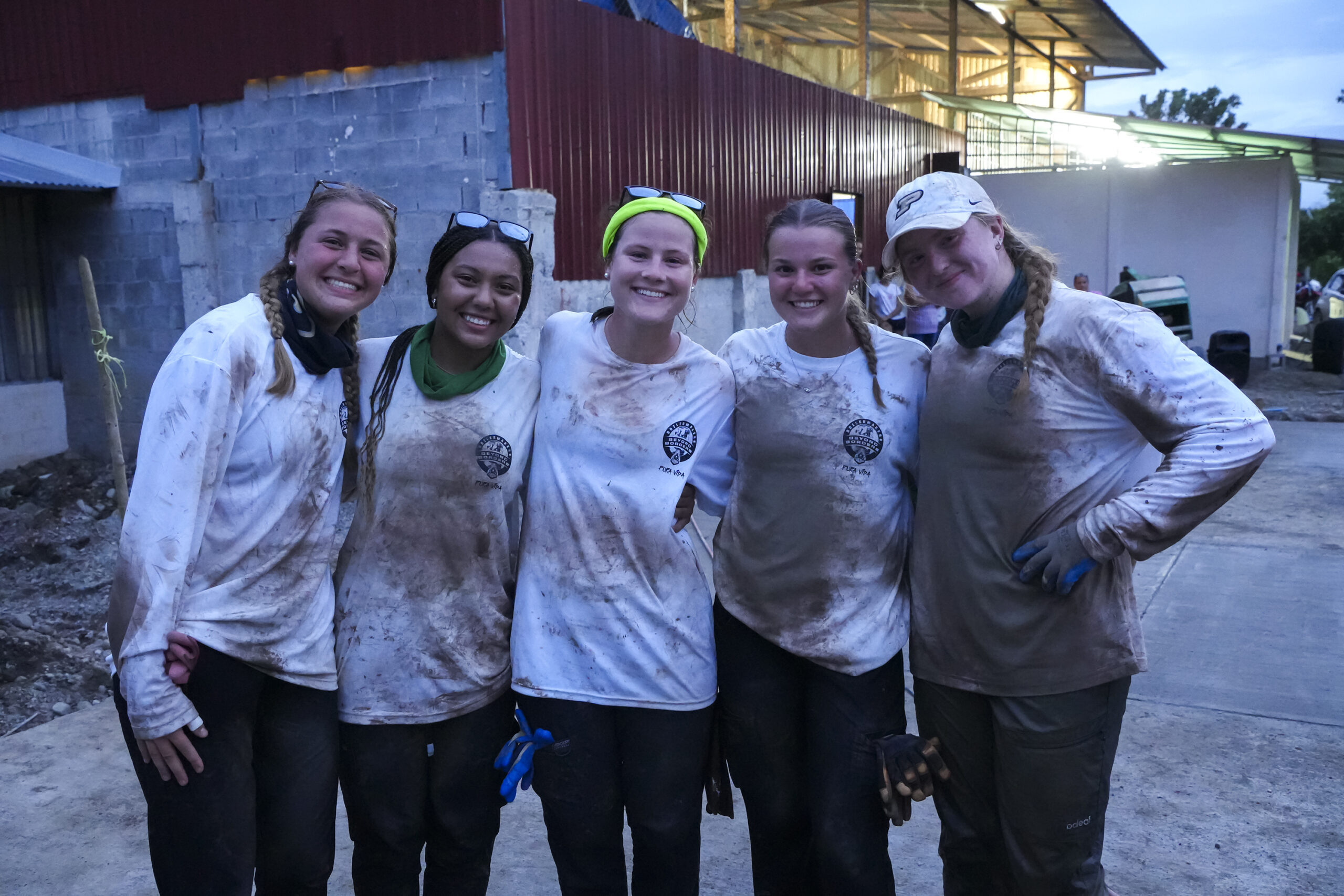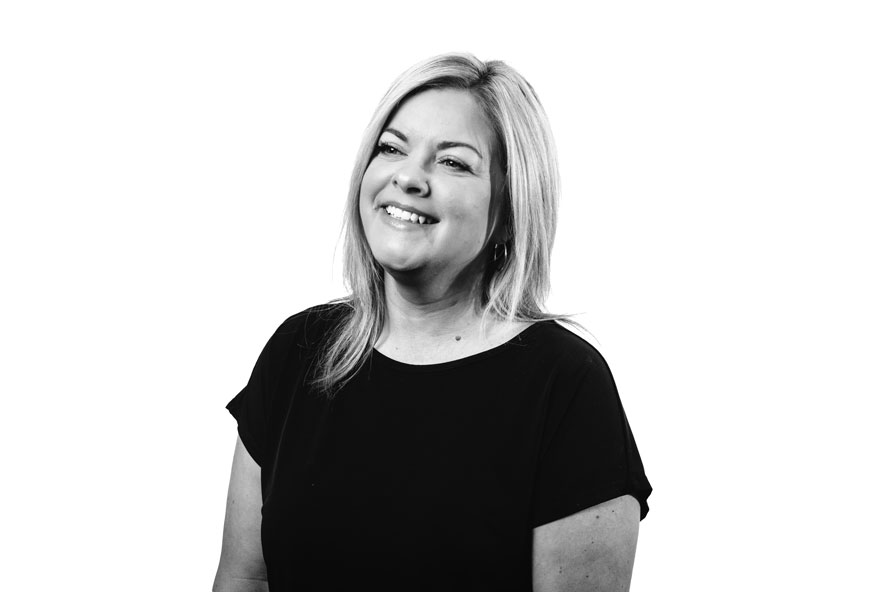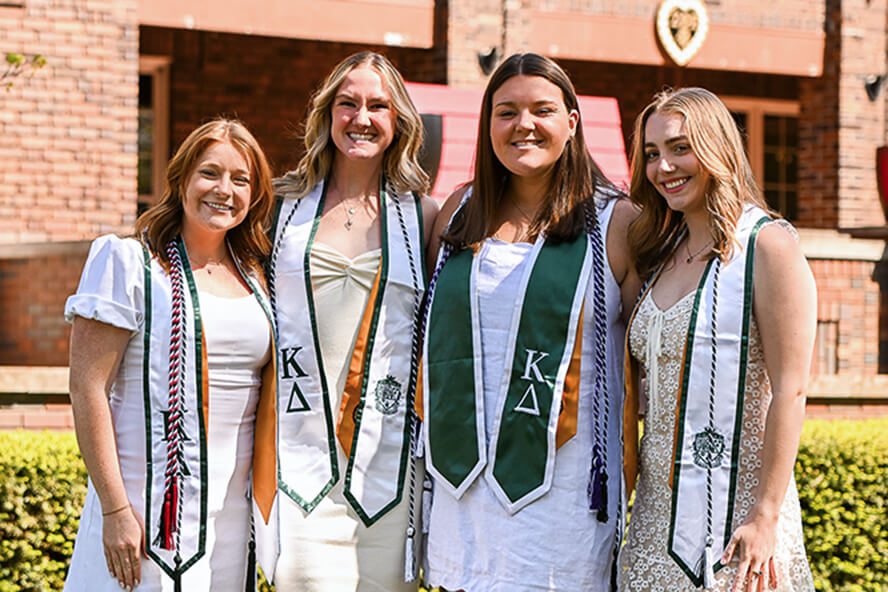Threads of Old Gold & Black: Purdue’s football uniform then and now
It was a small, tight, committed group of people. It had to be. There could be no leaks during the design process for Purdue’s new football uniforms.
Director of football creative services Ryan Long and associate director of equipment Kyle Gergely. Deputy athletics director Tiffini Grimes and director of creative services Paul Sadler were part of the circle, too.
“We had to keep it quiet,” Gergely says. “I had my wife and kids asking me all the time. But I wasn’t saying anything.”
Lips were zipped.
The new uniforms were a long time coming … seven years, to be exact, since the program’s base design changed back when Jeff Brohm hit town in 2017.
There was going to be a change in 2020. Then, COVID hit. And, well, you know …
Now, the new uniforms are here! It was a long process to get to this point, with Purdue unveiling its new look in July.
“We had to get it out before the debut of the EA Sports college football video game,” Long says. “Our new uniforms are in the game.”
No video game was gonna spoil this surprise.
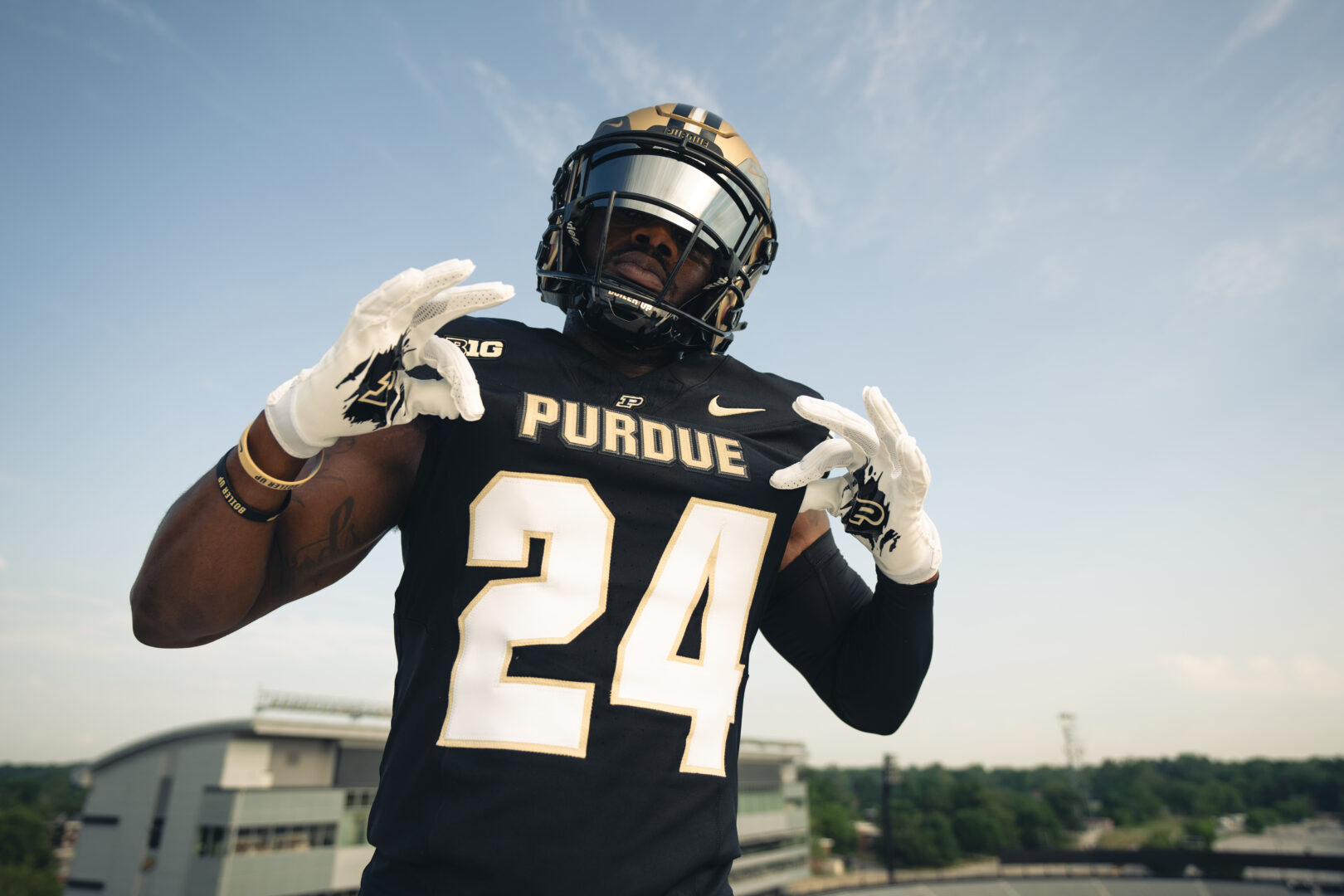
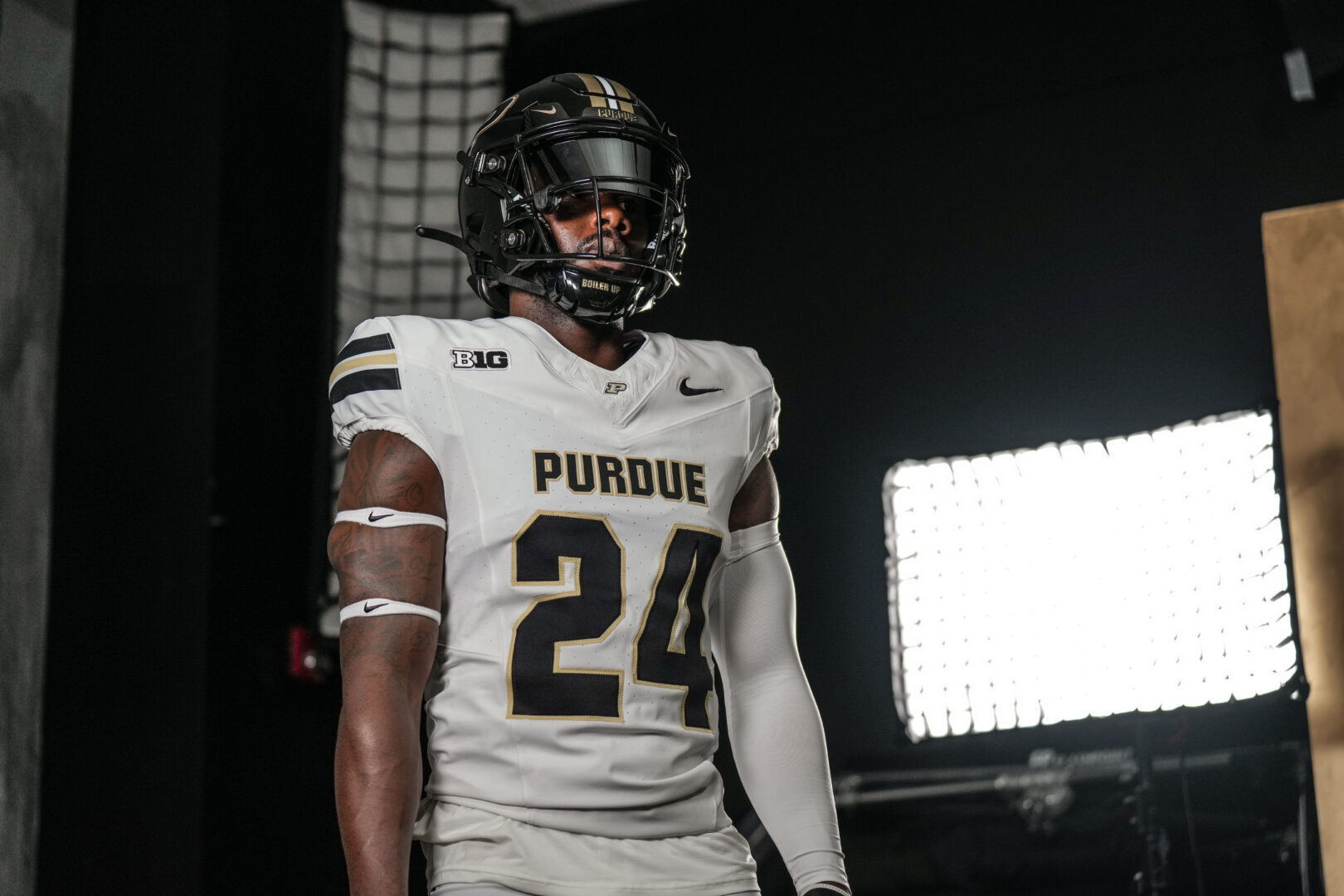



The new togs have received two thumbs up from fans. It’s a basic, clean look designed around Purdue’s classic gold and black colors.
“We wanted to stay true to Purdue,” Gergely says. “Brand identity was huge.”
The biggest change: “PURDUE” across the top of the chest.
“We went back and looked at jerseys that had ‘Purdue’ on the front,” Long says. “If you look at our jerseys for a long time, the ‘P’ on the helmet is the only thing that screamed ‘Purdue.’ Nothing says the word ‘Purdue,’ right? You had the letter ‘P.’
“Going back to the Mike Alstott era (1992-95) and putting ‘Purdue’ front and center, and making sure that from a branding perspective, at a glance, you knew who we were, was a big thing.”

The design process started almost two years ago.
“When we first met about it, the first thing we did was lay out a bunch of stuff in the equipment room,” Long says.
“Kyle went through and pulled a bunch of old jerseys, old stuff that we had so that we could look at all the elements and figure out what feels the most ‘Purdue’ about this stuff.”
Long and Co. had myriad details to consider. What type of stripes did they want on the pants? The shoulders? What color pattern looks the best on black jerseys versus white jerseys? On and on it went — details, details, details. None were too small.
“And so that whole process was just about identifying those elements,” Long says.
The result: Purdue has black and gold primary jerseys to match with black, gold or white pants. The helmet? There’s a gold and black one.
“And we have a special jersey and pants that are going to come out (for the Friday, Oct. 18 Oregon game),” Long says. “There will be a one-off helmet, too. It will be different from the standard black helmet.
“Coach wanted to have a strong, ‘Here’s our white look, here’s our black look,’” Long says. “We can switch it up with different pant combos. But we want to be consistently brand identifiable.”
There will be no mistaking Purdue for anyone else.
Purdue football uniforms through the years
1880s-1920s
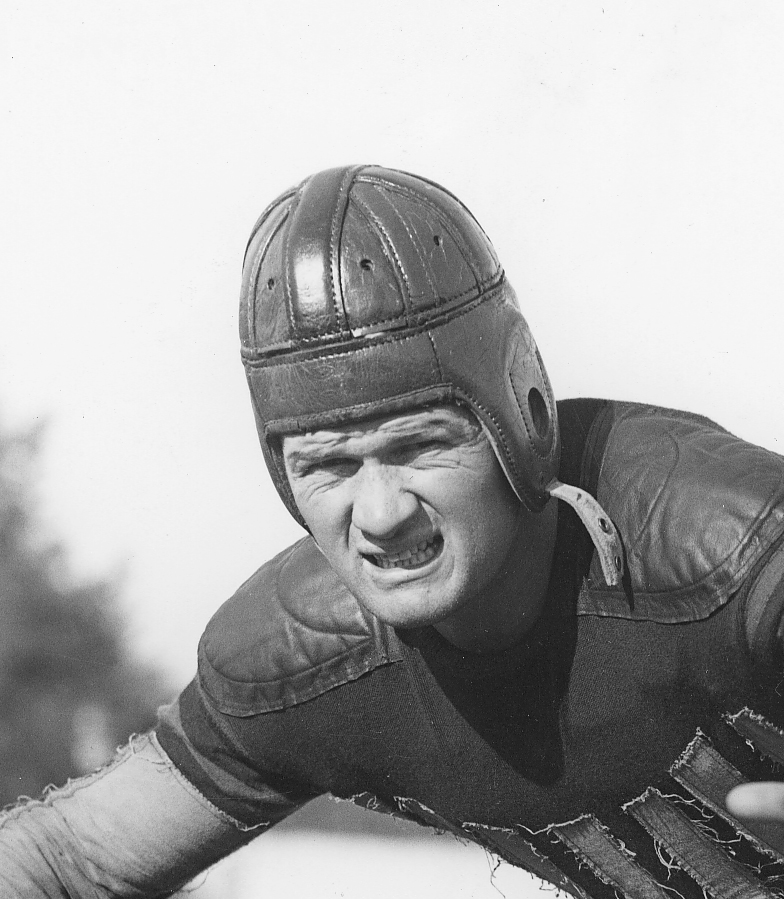
Bulbus leather helmets defined this era. Facemasks? Ha! Yeah, right. These were men with names like “Elmer Sleight” who rubbed dirt on wounds and got back in the game. The early teams sported stocking caps with a bobo on top! It’s good to wear on the sideline today, but these chaps played with it on. The pants were loose-fitting. The socks had some flair with rings. The jerseys had solid rectangular blocks on the front and stripes on the arms. It’s unclear why. Where were the numbers? In the 1890s, there was a “P” on the jersey.
1930s

Say “hello” to the leatherheads. A “P” adorned the forehead of the winged headgear. The pants? Loose-fitting, baggy. The jerseys were solid black with gold numbers. Another variation of the jersey was a black base with blocks and squares filled in around a number.
1940s

Strap on your leather helmet and take a lap around the field with Alex Agase.
Nothing fancy in this decade. Shiny gold pants were a staple. The jerseys? White and black. The white jersey had three stripes around the biceps. The thigh-high black socks were a nice touch.
The helmets were black with gold wings, a popular look then. Purdue looked good in them while going unbeaten in 1943 and ranking No. 4 in the final AP poll for coach Elmer Burnham with an eclectic roster featuring players from across the nation during World War II.
1950s
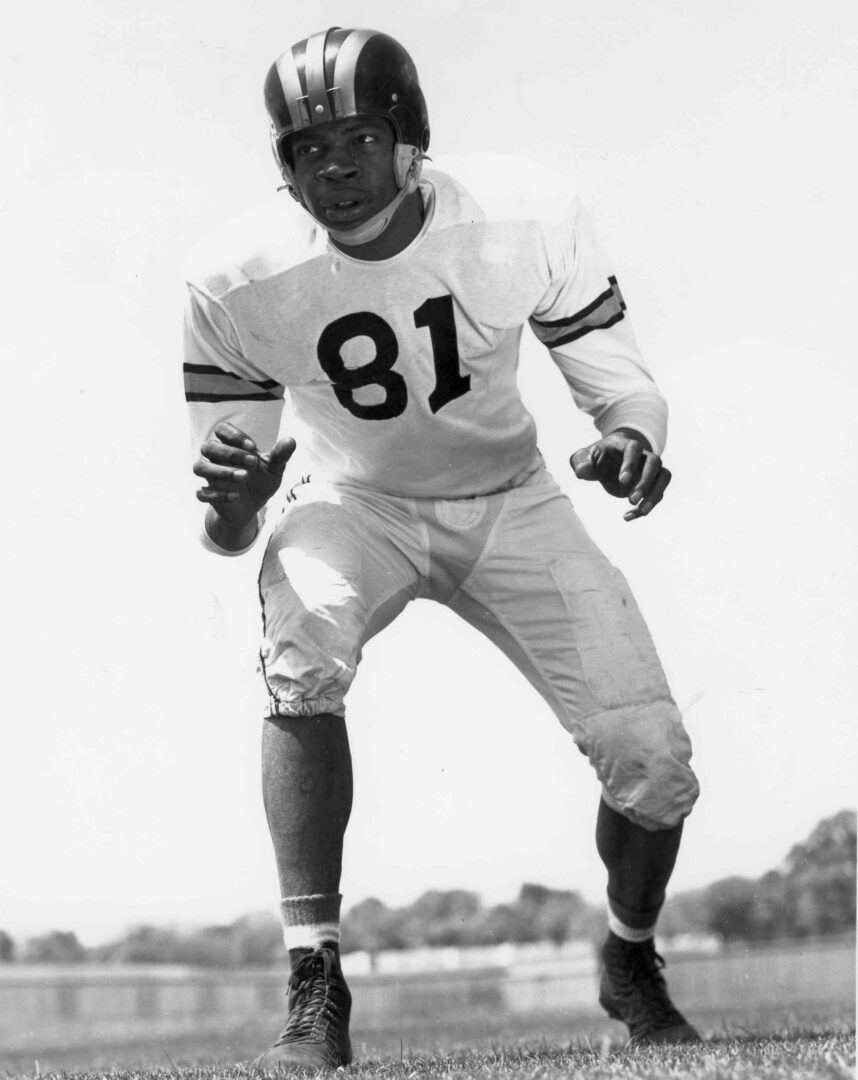
Understand, the 1950s were a conservative time. The country was coming off a world war, families were started in prefabricated houses, leafy suburbs were spawned, and Detroit churned out four-door sedans to take the kids to grandma’s house over the river and through the woods.
The uniforms worn by 1952 All-America end Bernie Flowers in this era reflected that. The pants? Basic white. Defensive end Lamar Lundy terrorized quarterbacks while sporting a white or black shirt with thin black-gold-black armbands on each sleeve.
The helmet base worn by Len Dawson and Dale Samuels, as they engineered upsets of Notre Dame, was black painted with three stripes running from front to back. By the decade’s end, the three stripes had been replaced by one and numbers were painted on both sides.
No doubt, Dwight Eisenhower would have approved of the staid design. No need to be pretentious. The garish 1970s were still 20 years away.
1960s


The days of rage, with protests from Berkeley to Chapel Hill, saw Purdue dominate the sport while fashioning a classic, conservative look.
Close your eyes and imagine Bob Griese wearing deep gold pants while dropping back to pass to Jim Beirne. Or think about Mike Phipps rolling out wearing a black jersey with a two-inch gold stripe running along the shoulder from neck to arm as he tosses a dart to Ashley Bell.
The Purdue uniforms during this golden era were basic and classy. The gold helmet with the single black stripe down the middle? It featured each player’s number stenciled to the sides so Jack “The Ripper” Mollenkopf knew who he was yelling at.
The 1960s jerseys also saw Purdue have a black/gold/black band on the outer shoulder sleeves. The Boilers also had a basic black jersey with gold and black piping on the sleeves. Simple and understated.
Purdue had a special helmet during the university’s centennial in 1969, featuring a gold block “P” that incorporated a “u” in it with a “100” below all encased in a football. And each player’s number was affixed in giant numbers on the back of the helmets. Even an alum from the 1920s would have no issues seeing those from a high perch in the end zone on a cool Saturday afternoon in November.
1970s
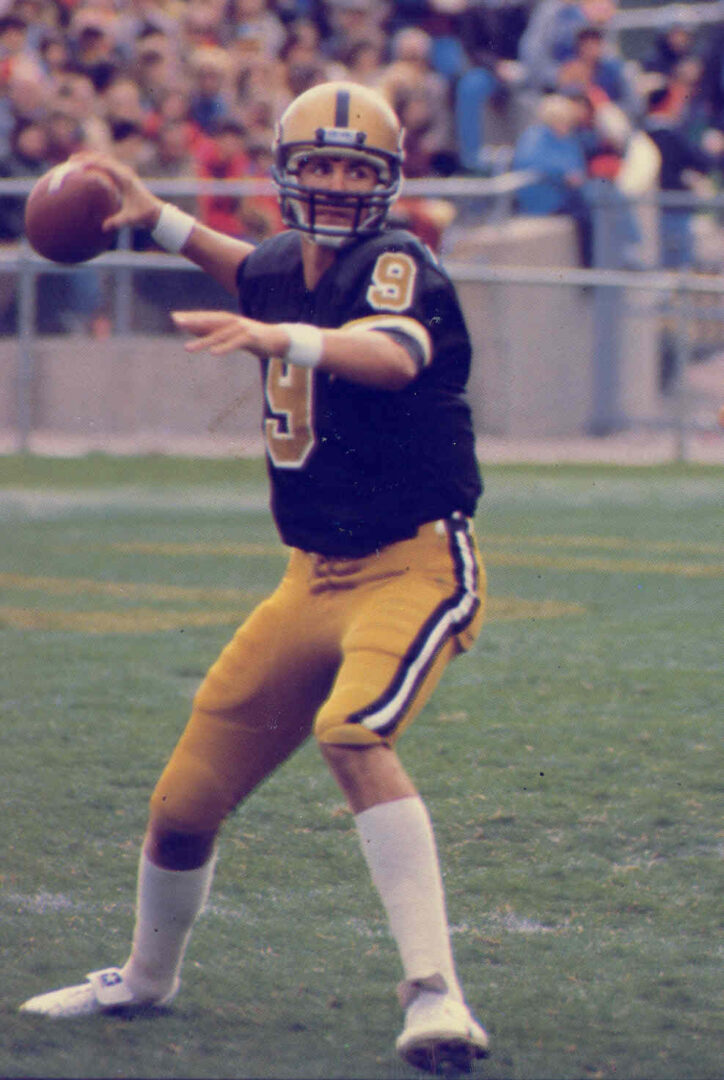
Say “hello” to the block “P” on the helmet, a classic fixture from a groovy decade that remains to this day. The headgear was accented by a single black stripe down the middle and player numbers on the back. Otis Armstrong made them come alive while streaking to pay dirt.
Scott Dierking looked good upsetting No. 1 Michigan in 1976 in a jersey with gold/white/gold stripes on the upper shoulders, which defined the first part of the decade.
By the time Mark Herrmann aerials were piercing the October sky above Ross-Ade Stadium in the late 1970s, mesh jerseys and BIKE helmets were the order of the day. The jerseys came alive with some outlining.
One common theme in the 1970s: The pants remained in a deep old gold hue.
Oh, and names were on the back of the jersey for the first time. Now, you could use your binoculars to spy the Junk Defense members’ names. Who got that sack? “Turner.” A uniform template had been laid as a dominating late-1970s run gave way to the 1980s.
1980s
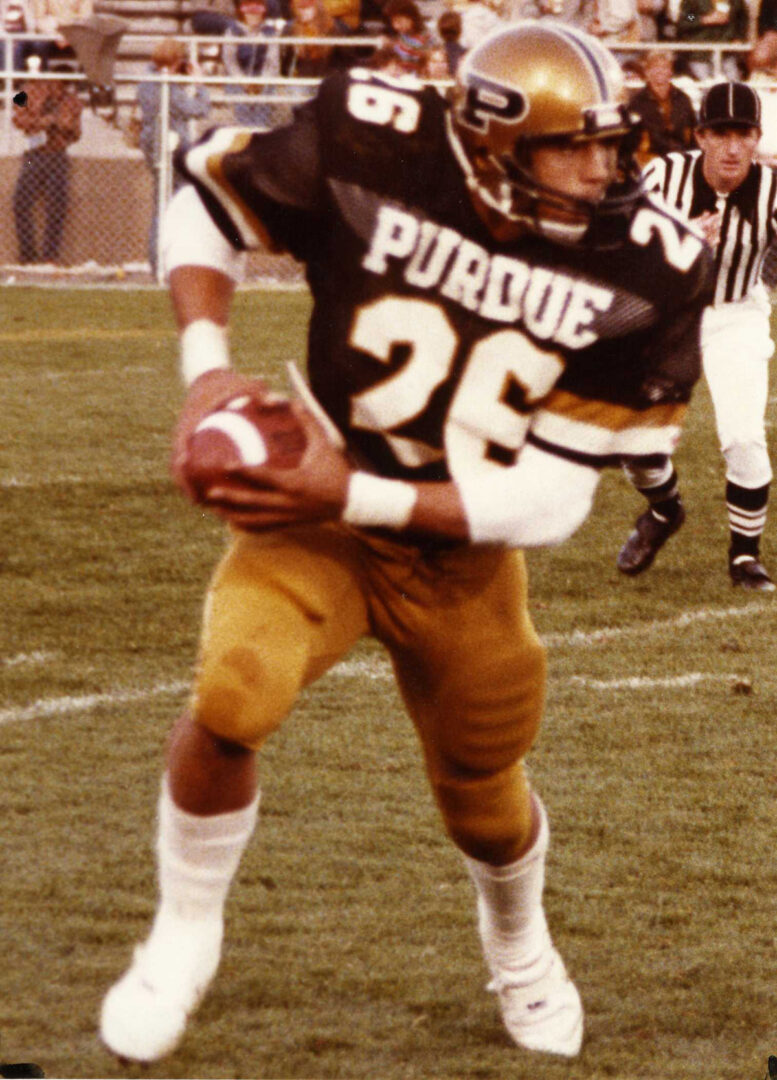
This period is best remembered for the one-off look in the Old Oaken Bucket game in 1986 … otherwise known as the “Rod Woodson Game.” That day, Purdue warmed up in its traditional black jersey. But when it returned from the locker room for kickoff, the squad was wearing gold jerseys, reportedly purchased by the players. That energized the crowd and inspired Purdue to a win for coach Leon Burtnett, who had Woodson play offense, defense and special teams in one of the most memorable efforts in Ross-Ade annals. The big change during the 1980s: “PURDUE” was added across the top of the jersey front. Opponents would know who they played when Jim Everett was chucking bombs before becoming the No. 3 overall pick in the 1986 NFL draft.
Also of note: For the first time, Purdue often wore all-black at home, eschewing gold pants. It was a sinister and sweet look that would be replicated often in the coming decades.
The decade also closed with a big uniform twist under coach Fred Akers in 1989: black helmets. The team hadn’t sported black headgear since the 1950s, but it didn’t last long during a dreary end to the decade.
1990s
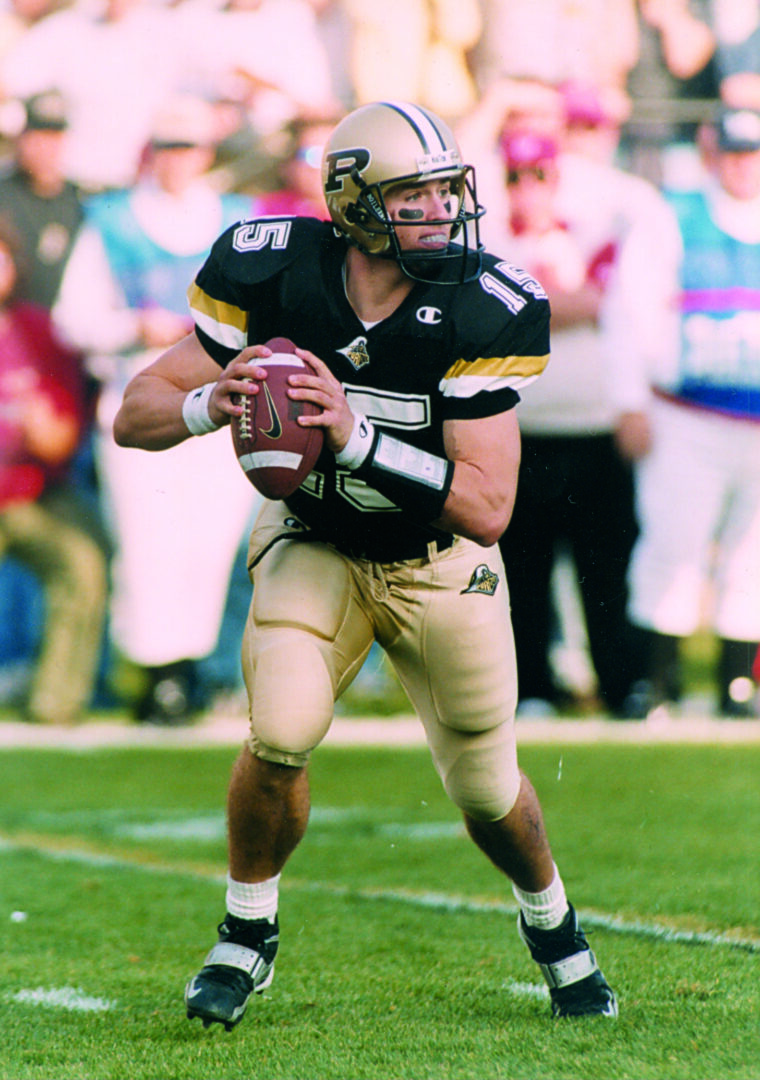
Lots of change. First, the black helmets were mothballed after 1990. Enter Jim Colletto, who smartly handed off to Alstott in new uniforms. The last things opponent saw before being trucked by the A-Train was “PURDUE” across this chest. In 1994, Purdue had a patch on its jersey to commemorate the 125th anniversary of college football.
Take note of 1996, as it’s when we would see a big alteration to the helmet: a motion “P” that remains to this day.
Joe Tiller brought basketball on grass to Purdue — and a lot of uniform incarnations. No more “PURDUE” across the jersey chest plate. Jerseys now featured thick gold and white stripes on the sleeves and a Purdue train logo under the neckline. Numbers popped with outlining, and “Old” gold gave way to the lighter “Vegas” gold.
The new look was part of a new winning tradition that saw Drew Brees help ignite a run of 10 bowls in 12 years under the iconic Tiller.
2000s
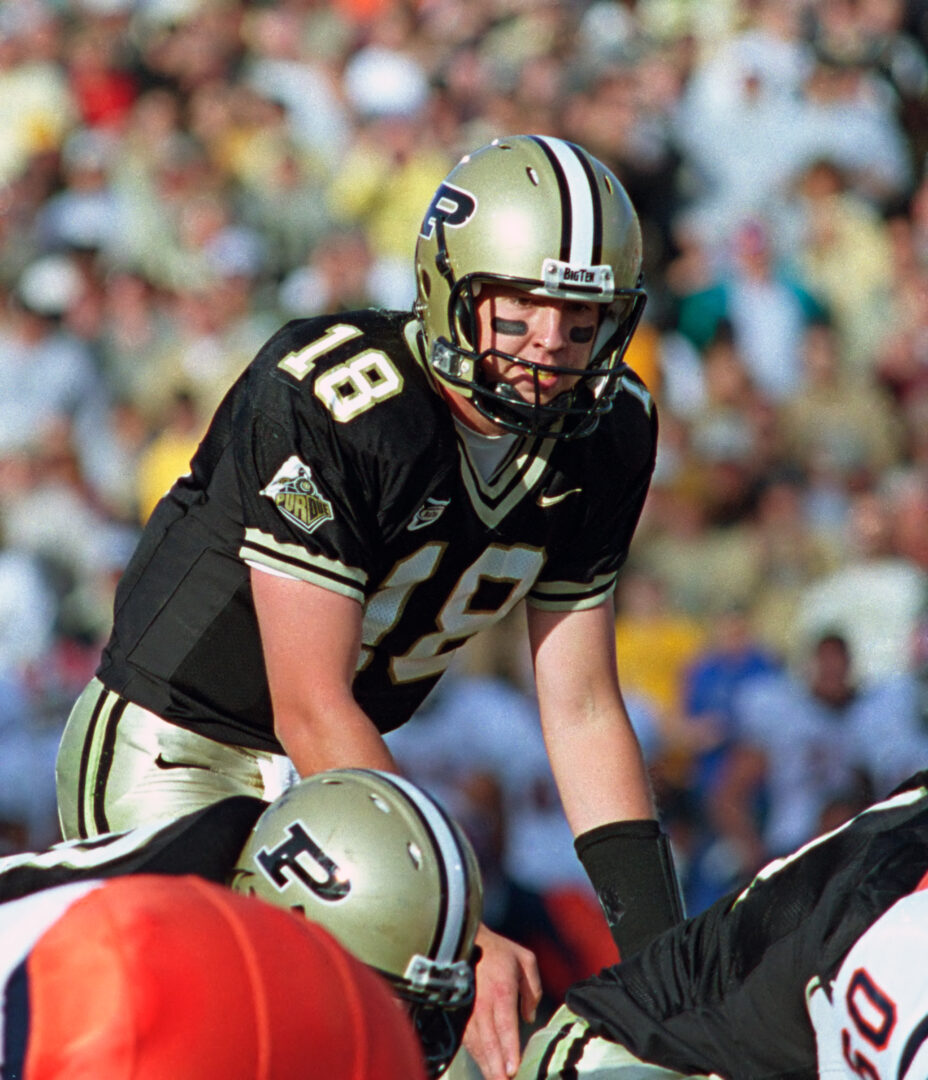
There was no fear of Y2K in West Lafayette with Brees back for his senior year in 2000. And he didn’t disappoint, leading the Boilermakers to the Rose Bowl. The helmets of Brees, Tim Stratton and Vinny Sutherland featured a rose woven into the “P.”
Following the World Trade Center attack, Purdue, like all college teams in 2001, wore an American flag on its jersey.
A bigger change came in 2002 when Purdue brought back gold jerseys with white numbers outlined in black. It was a look Tiller apparently wanted with his wife Arnette’s assistance. And who’s gonna argue with him? Tiller’s squads kept on winning, and winning, and winning. Purdue reverted back to black jerseys early in 2003 when Kyle Orton looked good, dropping dimes in a black-gold-black v-neck jersey with a Purdue train logo on the sleeves.
When Danny Hope took over in 2009, Purdue often wore all black or all white. The pants were accented with a Purdue train logo affixed to a hip.
2010s to today

By the middle of this decade, the black helmets were back and included a train track running down the center from front to back — an homage to the Boilermaker Special. One incarnation of jersey numbers had “motion.”
This decade saw one of the most unique touches ever. In 2014, Purdue had a helmet “P” that included photos submitted by season ticket holders and students … around 240 in all. That same year, Purdue had a neon yellow stripe running down the center with a neon yellow ribbon on the back. The Purdue “P” also was neon yellow. To continue the theme, players had neon yellow shoelaces, socks and gloves. It was all to support cancer research conducted at Purdue.
The year before, the team once sported a “P” illustrated like a flag.
Brohm took over in 2017, and a slick gold chrome helmet was introduced. That kicked off what has become an anything-goes era that continues to this day.
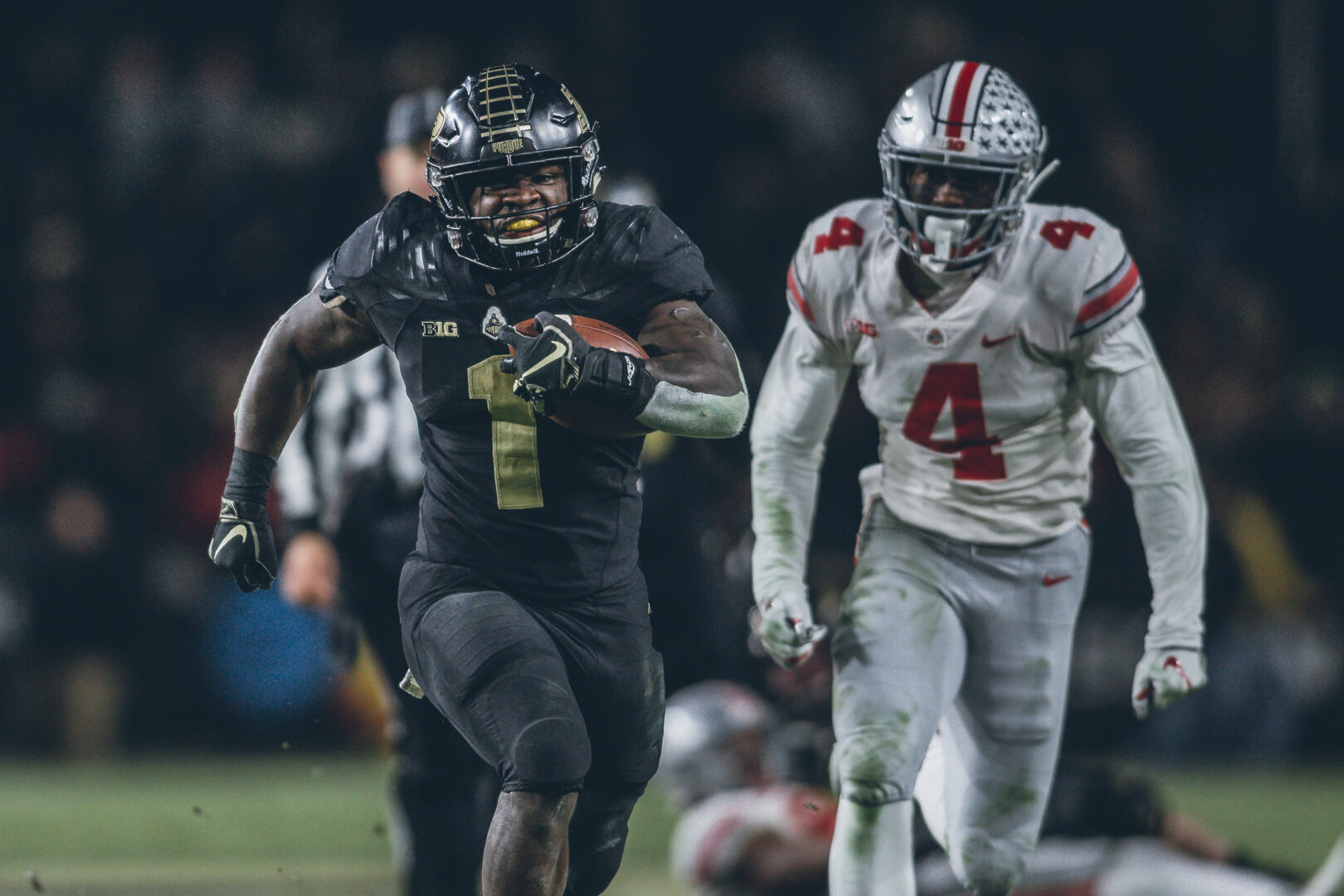
Black helmet, gold helmet, gray jerseys and pants, two-tone jerseys. Of note: In 2019, the squad wore an all-white uni designed to replicate the look of an astronaut in honor of the 50th anniversary of NASA’s Apollo 11 lunar mission and Purdue’s status as the Cradle of Astronauts™. The helmet featured a chrome stripe down the middle with footprints emblematic of alum Neil Armstrong’s first steps on the moon.

Now, the Boilermakers embark on a new era of threads, with some of the best elements of the past and present mixed into a sleek but classic look.
The new jerseys are available in the Purdue Team Store.
Written by Tom Dienhart, associate editor of GoldandBlack.com
Babak Anasori accelerates innovation, hands-on learning for students in nanomaterials
One of the world’s top engineering scholars is driving the creation of nanomaterials known as MXenes in his Indianapolis and West Lafayette research labs.
Babak Anasori is kind of a big deal. He ranks No. 1 in the U.S. and No. 7 in the world among all mechanical engineering scholars based on a ScholarGPS analysis of more than 140 million publications.
Research.com places him at No. 4 in the U.S. and No. 15 in the world in the 2023 Rising Stars of Science.
Yet, to his students at Purdue University, he’s also a mentor and friend — the approachable and engaging principal investigator in the Anasori Layered Materials and Structures Lab (LMSL) and the Reilly Rising Star Associate Professor in the School of Materials Engineering and the School of Mechanical Engineering.
Anasori’s Purdue lab reflects his commitment to students, especially in helping them discern their paths.
“I didn’t know what materials science and engineering were when I was entering university,” he says. “With that insight in mind, I’m always looking for students who might be a great fit for materials engineering, but who also might not know exactly what it is or what they want to do in life.”
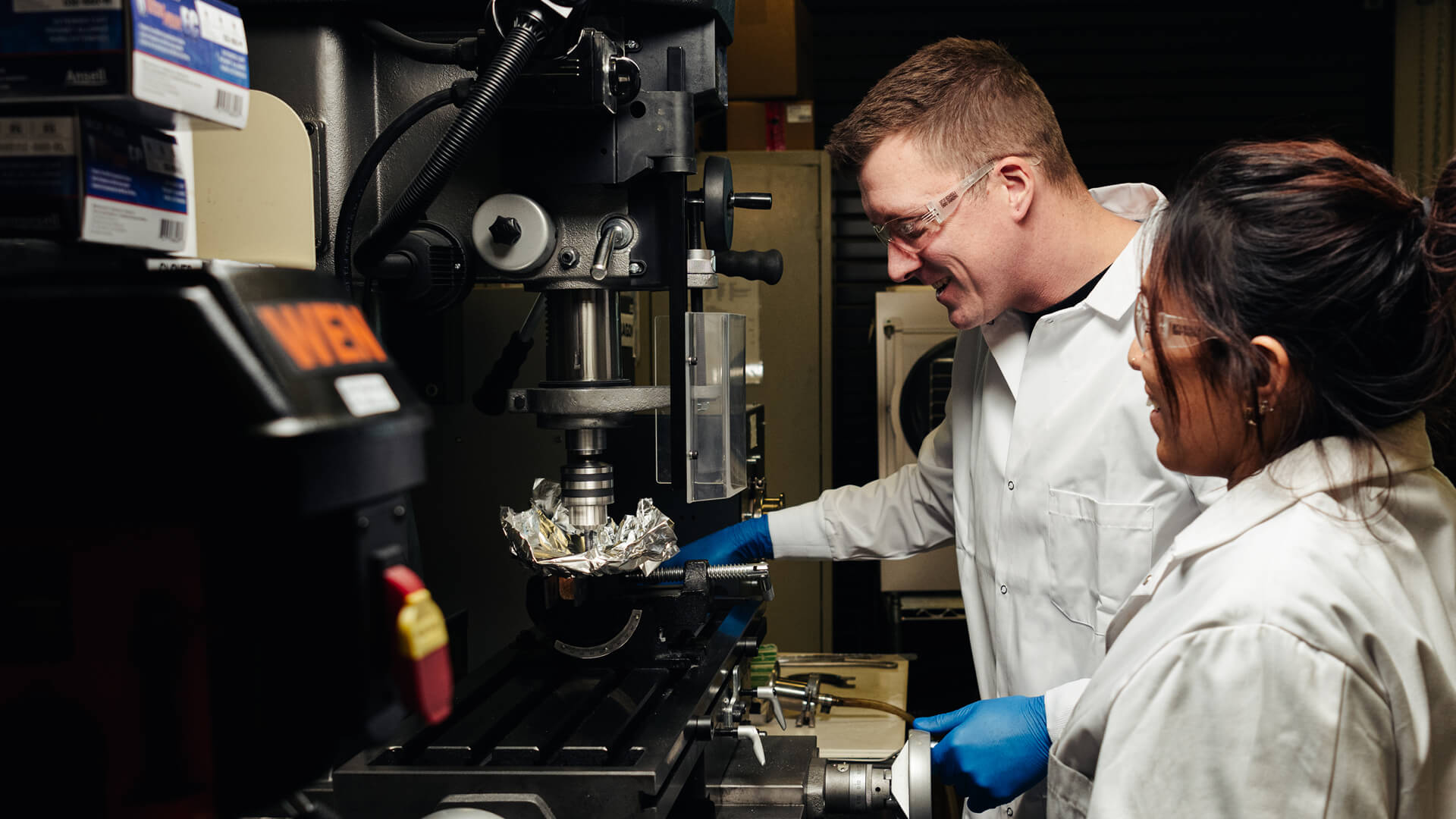
A journey that started in Iran
Being open to new possibilities is important to Anasori, as he likes telling his students: “I didn’t choose materials science. It chose me.”
Iran, where he is originally from, has a standardized nationwide university entrance exam. “You have four hours to take an SAT-style exam,” he explains, “It’s competitive, and it not only determines where you can study, but also what you can study.”
Anasori qualified for his top choice: Sharif University of Technology, located in Tehran.
When it came time to name the academic disciplines he would like to pursue, he chose majors that were familiar and reflected his love of building things: mechanical engineering, civil engineering, industrial engineering; to round out his list, he added materials science and engineering even though he didn’t really know what it was.
“The results came out, and I was selected for materials science and engineering,” he says. “The discipline I knew the least about. But little by little I got so interested in the field. I found that I could pursue my passion for building at the smallest scale possible by putting atoms together.”
After earning an undergraduate degree from Sharif and a master’s degree from the University of Tehran, Anasori moved to Philadelphia to earn his PhD at Drexel University, which has one of the top materials science programs in the world.
His research in Michel Barsoum’s and Yury Gogotsi’s labs at Drexel helped lead to the creation of a subfamily of novel nanomaterial known as MXenes (pronounced “maxines”).
The feeling of discovery
Given his background it’s no surprise that Anasori takes a scientific approach when it comes to inviting students to consider STEM majors and careers. He starts by asking a lot of questions.
“Anytime I teach a class or meet a student on campus, I always try to ask them: What is your goal in life? What is your goal for your job? What do you enjoy doing?” he says.
“If a student tells me they like to fix things or do projects around the house, I see cues that they may enjoy materials science and engineering. Because it is all about building things, putting things together.”
Anasori recognizes that students might need help understanding what translating their interests into a career looks like, so he shows them.
“If I find undergraduates who are a good fit for my lab, I invite them to come. I set this culture with my graduate students and postdocs, too, telling them that we always want to help the next generation and mentor them,” he says.
“Some students find that research is their life’s work; others realize that it’s not something they want to do forever,” he says. “But in the lab, we have a culture that says everyone is involved; everyone has the opportunity to discover their passions and maybe even novel materials.”
And MXene discovery is what it’s all about in the Anasori lab. “Basically, students experiment with atoms, with elements,” he says. “Sometimes we discover new materials.”
Anasori tells his students that this experience means that they now know something that no one else on the planet does until they share it with the world.
“And that’s the feeling of a discovery,” he says. “When I discovered a group of MXenes at Drexel, the feeling was incredible. I want as many students as possible to have the opportunity to feel the same exhilaration.”

If a student tells me they like to fix things or do projects around the house, I see cues that they may enjoy materials science and engineering. Because it is all about building things, putting things together.
Babak Anasori Reilly Rising Star Associate Professor
School of Materials Engineering
School of Mechanical Engineering
A ‘recipe’ for MXenes
MXenes are nanomaterials, a family of two-dimensional (2D) transition metal carbides, carbonitrides and nitrides that are conductive, durable and impermeable to electromagnetic radiation.
As a relatively new material, applications for their use are continually evolving, but currently include materials for energy storage and generation, lighter and stronger composites, electromagnetic interference shielding, biomedicine, and carbon capture and utilization.
Always trying to make science more approachable, Anasori likens the work done in his lab to a familiar process: cooking.
“When we make material, we refer to this as synthesis, which is similar to some degree to cooking,” he explains. “The elements are our main ingredient. Basically, we go and look at the periodic table. We mix varying moles or ‘scoops’ of titanium, aluminum and carbon. We measure mass and then molarity, and based on the molarity we mix them together.”
One blender in the Anasori lab rotates or “mixes” slowly, sometimes overnight. Another is strong and can rotate fast, blending materials in a few hours.
“We let the atoms blend together. And then we take them out and put them in the oven,” he says. “And our oven is, obviously, way hotter than the average oven. We sometimes go to 1,600 degrees Celsius or around 3,000 degrees Fahrenheit. I have furnaces that even can go above 2,000 degrees Celsius.”
Anasori leans into the cooking analogy not only because he thinks it’s an accurate one, but also because it makes the detailed, technical work that he does relatable to a wide audience.
“As much as I can relate materials science to normal life, I know that I can attract more students,” he says. “So yes, what we do is ‘cooking,’ but the results can be something so novel, something no one has ever thought about before.
“Whether it is in electronics, computers or space travel, we take the MXene material and we ‘cook’ up new ways in which they can be used,” he says, “and instead of tasting what we cook, we then test them in many different ways, for example, by using different forces, X-ray or electron beams, to understand how the new materials that we made behave (‘taste’).”
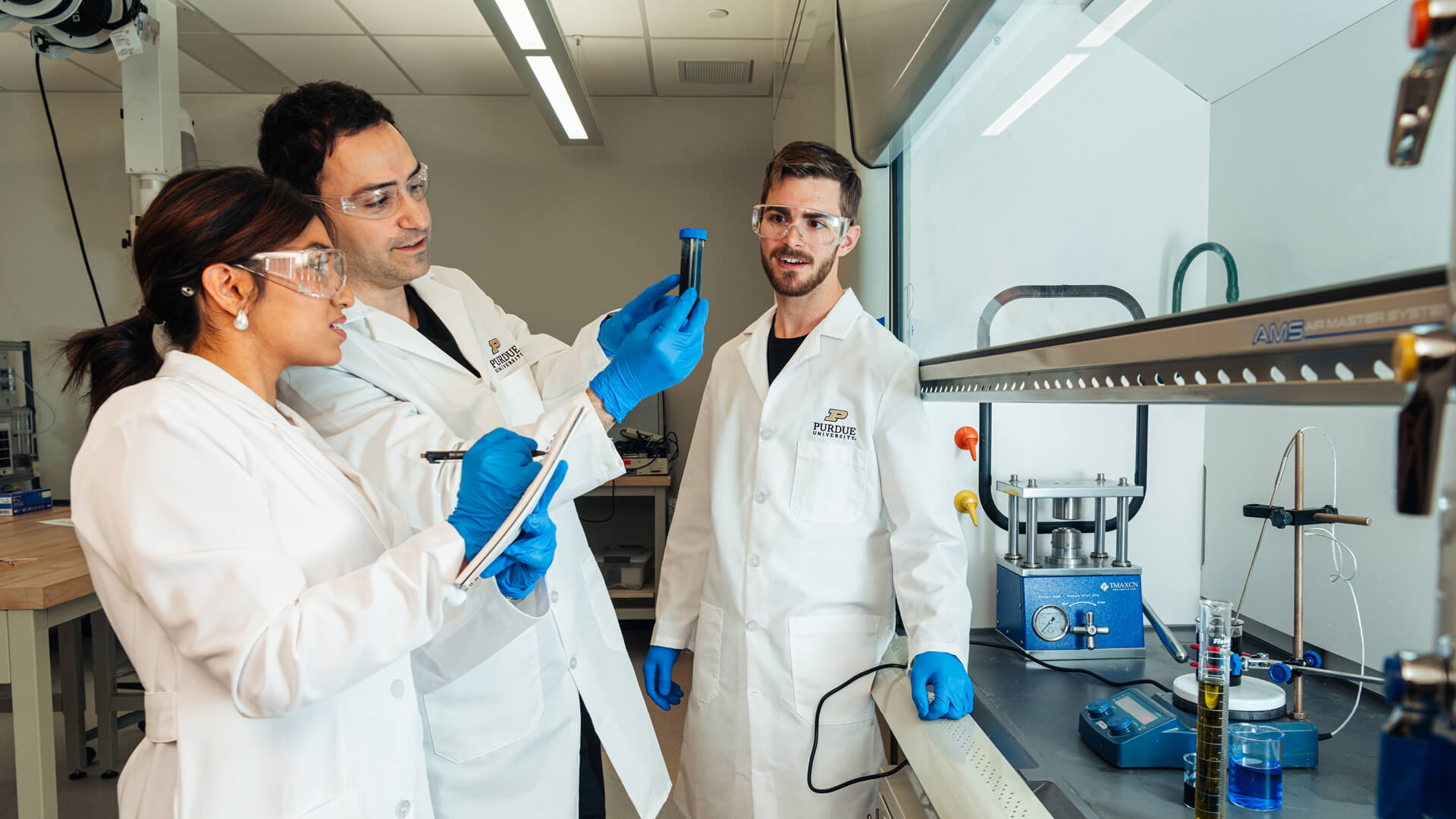
Nanoart
An additional, and unexpected, application for MXenes that Anasori discovered is in the world of art. It turns out that MXenes aren’t just useful; they’re also beautiful.
“Nanoart became a hobby for me while I was working on my PhD,” he says. “The best distraction when I was feeling overwhelmed.”
Anasori had never done nanoart before Drexel, but he was intrigued. “I started working with the MAX phases and every time I would do microscopy, I would capture a lot of interesting features because they’re layered structures.”
In Photoshop, he colored the layers, and images began to emerge. “Microscopy images are generated by electrons scanning instead of light, so they are not ‘real’ in a sense. They emerge from the computer in black and white. It’s really up to the person, to the scientists, to the artist, to interpret what they are seeing and add color.”
Nanoart stretched Anasori’s creativity. “I like to visualize things,” he says. “Imagination is a big part of my materials discovery research.”
Eventually he began entering his colorful pieces in competitions, earning awards as he went.
When Anasori became a professor, he realized that he wanted to make an experience that had meant so much to him available to his students.
“I started the NanoArtography competition specifically to have a venue that is open to everyone,” he says. “At the beginning it was an unknown competition. It has grown organically, such that last year we had 300 submissions from 36 countries.”


Freethinking Friday nights
Outside the lab, Anasori invests time fostering a positive group culture. He wants everyone to be involved, to mentor and help each other, and to understand that their voices matter.
To accomplish these goals, he holds a Friday evening meeting that’s more relaxed, less technical. He encourages students to think outside the box and to share their ideas freely. He also invites a wide range of students from a variety of academic disciplines.
“They come to the meeting and start basically thinking out loud,” he says. “If you find a crazy idea that you want to try, let’s discuss it in the Friday evening meeting. There is no judgment, no wrong or right there. And sometimes we come up with some new ideas that can lead to new directions for research or even materials discovery.”
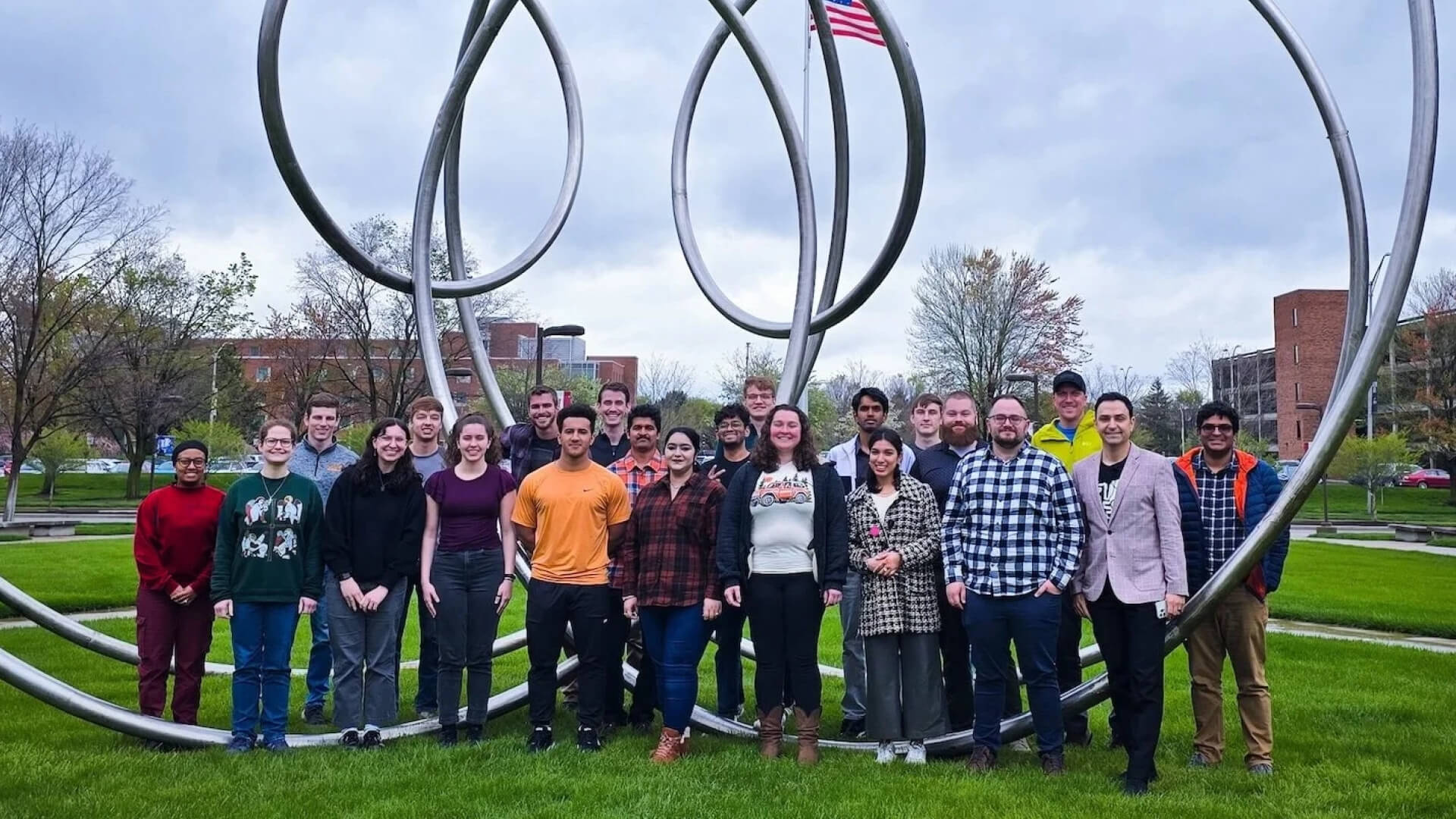
Living the Hard-Tech Corridor
In addition to Anasori’s thoughtful mentorship, Purdue students in Indianapolis benefit from the campus’ position at one end of the university’s Hard-Tech Corridor.
“For undergraduates, an urban campus is exciting; they have access to so many fun things,” he says. “And for students who like to do research, being in a setting where there are so many companies nearby makes internships and interactions that much easier.
“I have two labs: one in Indianapolis and a new lab that we’re building in West Lafayette,” he says. “We’re really going to live the Hard-Tech Corridor, the vision of President (Mung) Chiang.”
He says students are excited that the Indianapolis lab will extend to West Lafayette because the new lab will contain different equipment and new opportunities for interaction and collaboration.
“Being in both places will allow us to have access to the best of both campuses,” he says. “I can’t wait to see the impact.”
For undergraduates, an urban campus is exciting; they have access to so many fun things. And for students who like to do research, being in a setting where there are so many companies nearby makes internships and interactions that much easier.
Babak anasori
Reilly Rising Star Associate Professor
School of Materials Engineering
School of Mechanical Engineering
Purdue collection is overtaking alum’s space – but he’s fine with that
Casey Stultz’s Purdue fan cave features plenty of unique Boilermaker sports memorabilia, and that’s not all
Casey Stultz has a problem. The avid Purdue collector has been running out of room to display his ever-expanding assortment of Boilermaker memorabilia.
To remedy his situation, Stultz (BS organizational leadership ’14) remodeled an existing barn on his property in Parke County, Indiana.
“I just need more space,” Stultz says with a chuckle. “I keep on buying and collecting.”
Stultz’s Purdue collection dates back to childhood, when his Boilermaker parents frequently brought Casey and his two brothers to campus for games when they weren’t camped out in the front room of their Fountain County, Indiana, home watching the likes of Steve Reid, Todd Mitchell, Troy Lewis and Mark Herrmann on TV. Stultz’s first Purdue autographs are on a yellow handkerchief signed by two-time All-Big Ten basketball selection Lewis and teammates Mitchell and Everette Stephens, both of whom went on to play in the NBA and other professional basketball leagues in the U.S. and overseas.

I just need more space. I keep on buying and collecting
Casey Stultz BS organizational leadership ’14
Stultz’s extensive set of Boilermaker autographs includes those of well-known Purdue football players, basketball players and wrestlers. He also has approximately 20 signed football jerseys of former Purdue stars — including NFL standouts like Mike Alstott, Matt Light, Akin Ayodele, Rob Ninkovich and Rosevelt Colvin — some of whom Stultz has remained in contact with since befriending them during their college days in the 1990s.
“It’s always good to have them come back and go to Harry’s (Chocolate Shop) and chew the fat with them,” Stultz says.. “It’s just like we haven’t missed a beat, and we’re talking about being 25, 35 years removed now.”
A favorite jersey that did not come from one of Stultz’s contemporaries is that of Leroy Keyes, the two-time football All-American who finished third in Heisman Trophy balloting in 1967 and was runner-up to University of Southern California running back O.J. Simpson the following year. Stultz jokes that the Keyes jersey, which he purchased at an estate auction in Ohio, has made some of his pals in the Boilermaker collecting community jealous.
“Everybody wants that one,” he says, “but I’m like, ‘Nope, I’m not letting that go.’”
Not just sports stuff
The many Purdue sports items are probably the most eye-catching part of Stultz’s collection. However, he has plenty of stuff that has nothing to do with athletics.
There are items of personal significance, like his dad’s green beanie designed by fellow residents of Purdue’s Cary Quadrangle Residence Hall in the 1970s. Attached to the beanie is a button featuring characters from the iconic “Peanuts” comic strip, with Charlie Brown holding a Purdue flag and saying to Snoopy, “Good grief, another Cary man!”
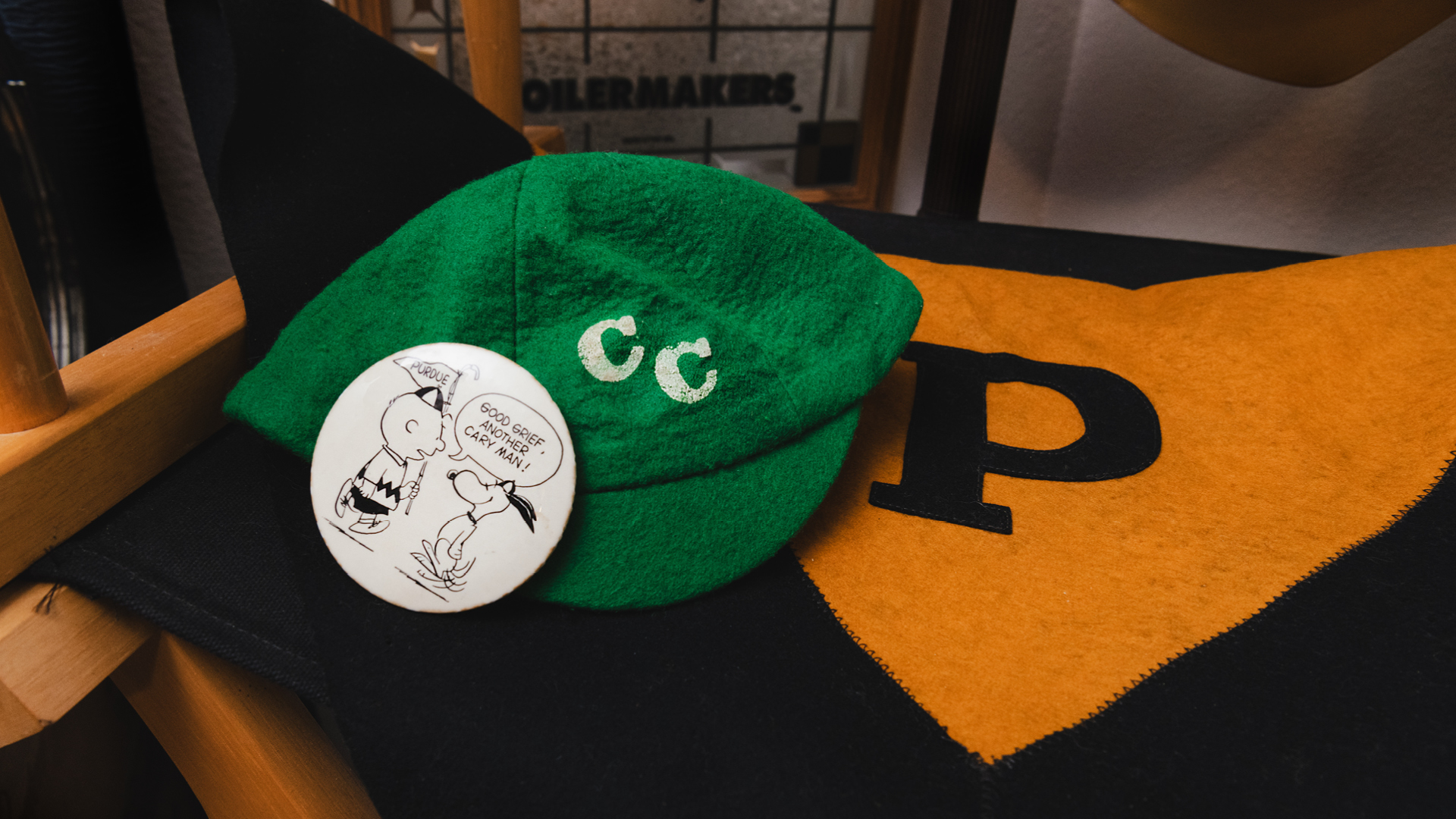
Stultz also has a small book documenting the men of Cary Club’s annual spring dance, held May 21, 1948, at Purdue Memorial Union. Among the guests listed inside are Purdue administrators Frederick Hovde, R.B. Stewart and Frank Hockema; Indiana Gov. Ralph Gates; and none other than President Harry S. Truman and his wife, Bess.
Spread among the autographed balls, photos and other sports memorabilia on the walls and shelves in Stultz’s fan cave are additional items that document Boilermaker life through the years: a framed photo from the earliest days of the Purdue campus; Debris yearbooks from the early 1900s; a poster promoting the Grateful Dead’s 1969 concert at Purdue Memorial Union; a frame featuring lids and labels of cheese and butter products once sold at the Purdue University Creamery; and a Purdue barrel tabletop signed by former university president and Indiana Gov. Mitch Daniels.
“It’s all Purdue,” Stultz says. “I look for anything with Purdue on it.”
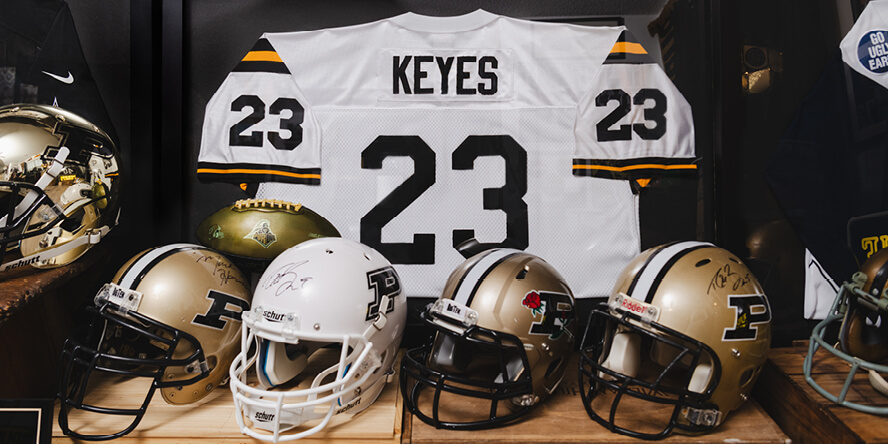

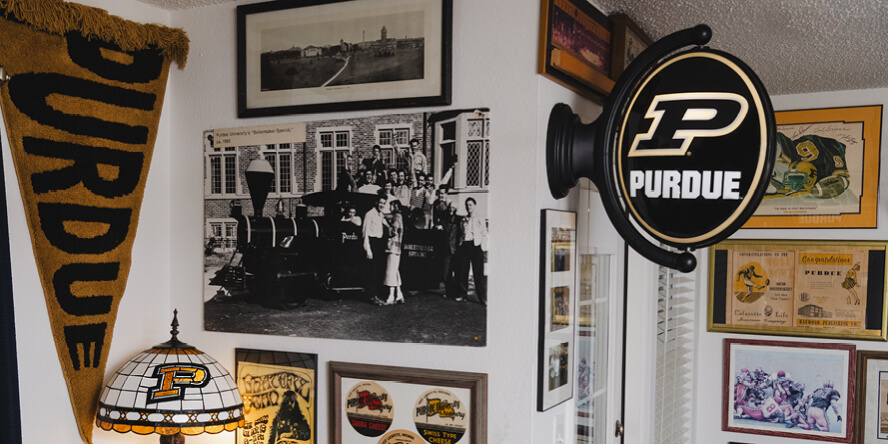
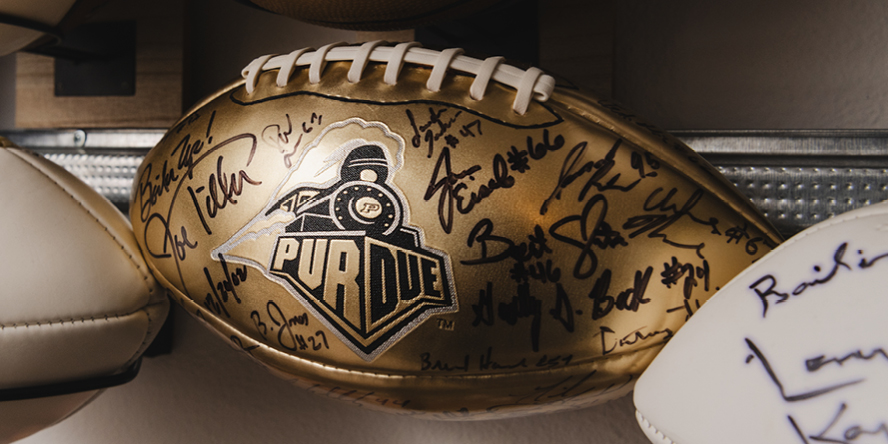

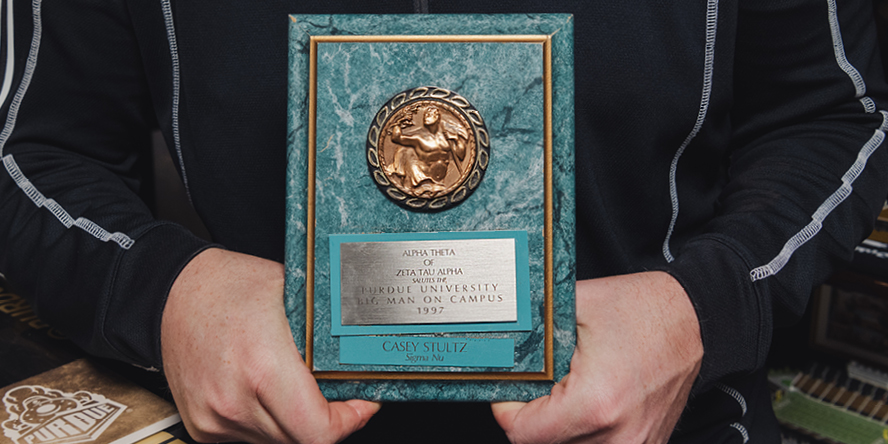
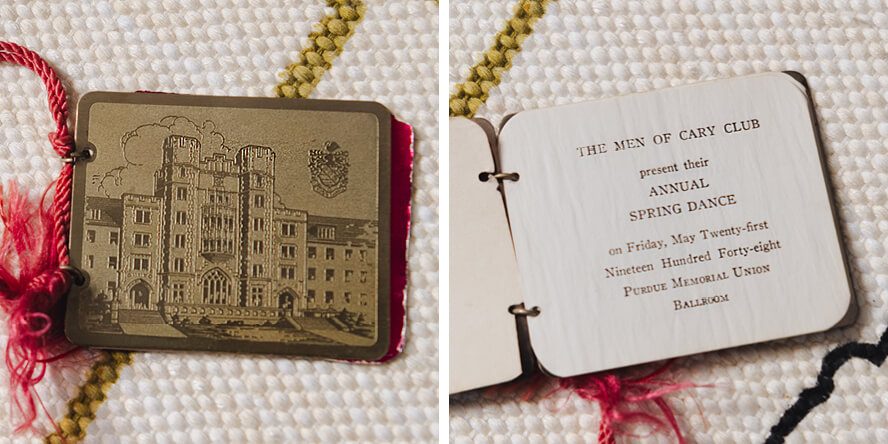
Knowing where to look
Stultz says he found many of his vintage Purdue pieces on Facebook Marketplace and also knows a couple of memorabilia shop owners that he occasionally checks in with about new Boilermaker items that have crossed their radar. He recently picked up a number of pieces at the estate sale of a former Boilermaker football player, including an extremely rare 1960s-era helmet.
“His daughter called me and said, ‘I heard you’re a big Purdue collector.’ So I sent her photos of my collection, and she said, ‘I want you to have a lot of this stuff,’” Stultz says.
What dictates his strategy when such a prime buying opportunity presents itself? It depends on items of historical or personal value to him.
After living in New York state for 17 years, Stultz returned home to Indiana three years ago to be closer to his family and beloved alma mater. Today he lives in rural Parke County and works as a production team member at Nucor, a producer of steel and steel products.
Now, with his newly remodeled fan-cave barn, he plans to have lots of get-togethers with his Purdue buddies — just as one might expect from a lifelong Boilermaker.
“I definitely bleed black and gold. Anything Purdue, I collect,” Stultz says. “I enjoy the history, and I really like to support my team. Purdue has done a lot for me, so I definitely put that representation in my fan cave.”
Purdue alum’s unexpected path to Paralympics leadership
Julie Dussliere planned to become a diplomat. She just didn’t expect that it would be as chief of Paralympics for Team USA.
Editor’s note: On Aug. 26, 2024, the Purdue for Life Foundation announced that alumna Julie Dussliere will succeed Matt Folk as the alumni organization’s president and chief executive officer, starting Oct. 1.
As a Purdue swimmer in the 1990s, Julie Dussliere never expected to work in sports after college.
Once she finished her bachelor’s degree, Dussliere (BA Russian ’94) intended to complete a master’s program, and then it was on to law school. International diplomacy was in her future.
And that’s what happened — just not the way she envisioned it at the time.
“I had no indication or thought that I was going to work in the sport world when I graduated. That was not the plan,” Dussliere says. “But then I ended up taking a coaching job instead, and I’ve been in the sport world ever since.”
Saying she’s “in the sport world” would be selling Dussliere a bit short, though. She is a groundbreaking administrator with the U.S. Olympic & Paralympic Committee (USOPC), the organization that oversees the Olympic and Paralympic movements in the United States.
Since joining the organization in 2003, Dussliere has filled multiple leadership roles, including her current position as senior vice president and chief of Paralympics and internally managed sports. In this job, she oversees planning and support for 28 summer and winter Paralympic sports and the operations of the 10 Olympic and Paralympic sports currently managed by the USOPC.
I’m actually doing the job I always wanted to do, just doing it in a different space than I thought I might be.
Julie Dussliere (BA Russian ’94), chief of Paralympics and internally managed sports for the U.S. Olympic and Paralympic Committee
At the 2024 Paris Games, she will serve as Team USA’s chef de mission, a chief leadership role she has held at multiple winter and summer Paralympics and Parapan American Games to ensure U.S. athletes and their coaches have the resources necessary to succeed.
And that’s only the most recent highlight in a career that certainly tests the diplomatic skills she began building as a Boilermaker student-athlete.
“International relations in the sport world is not too different from the government level,” Dussliere says with a laugh. “There’s just as much politics. It’s just in its own little space.”
A groundbreaking career
As a Purdue student, Dussliere was certain she didn’t want to teach. She remembers discussing that aversion — which made her an outlier among her classmates in the School of Languages and Cultures — in frequent conversations with her advisor, Marianne Gupta.
But guess what she loved most about her first coaching job?
“Funny enough, it was the teaching aspect, even though I had all those conversations with Marianne where I didn’t want to teach,” Dussliere says of that initial job with the USA Swimming club team in San Jose, California, which she took to fill the time between grad school and law school. “You never know until you do it.”
Indeed, she turned out to be great at it. She worked as a coach and administrator at several USA Swimming clubs over the next eight years and eventually crossed over into Paralympic coaching.
For the most part, she found that coaching athletes with disabilities was just like coaching any other athlete. The biggest difference was that it required more creativity than had been previously necessary.
“About 99% of what you’re doing is exactly the same: training, planning, physiology, biomechanics, sport-specific expertise,” she explains. “It’s taking your coaching expertise to a higher level in that you have an athlete who may not be able to do things the same way based on what the disability is, and you’ve got to get creative. You’ve got to figure out how you get the same training cycle, same training methodology and so forth.
“I would say the coaches we have in Paralympics are some of the best in the world because of that, because they’ve all moved into Paralympics at some point in time, typically based on an athlete-coach relationship where they’ve gotten involved, and they have a tendency to stay in Paralympics once they come over.”
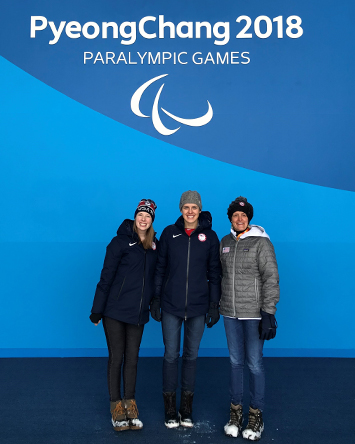
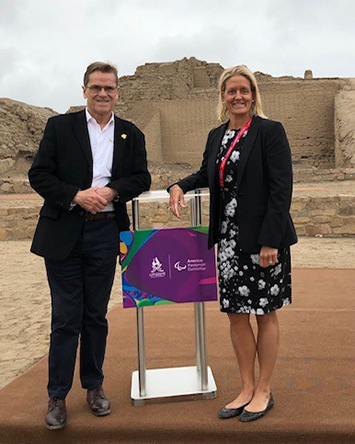
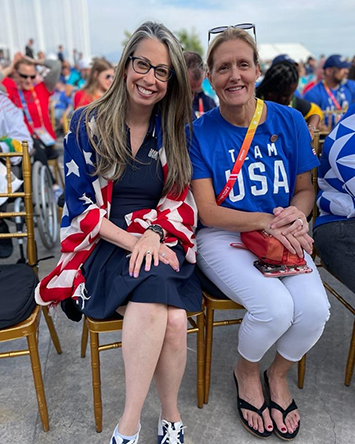
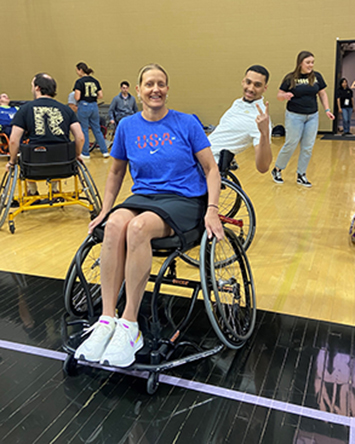
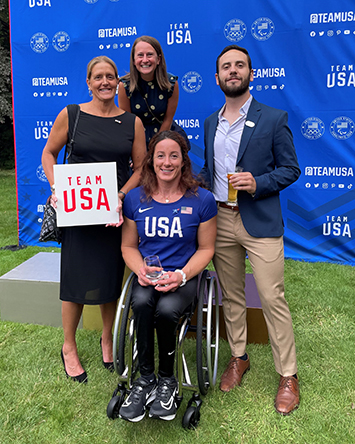
Dussliere coached in Paralympic swimming for a decade — including as an assistant at multiple international competitions — before making history as head coach of the U.S. team at the 2002 International Paralympic Committee Swimming World Championships. In that role, she became the first woman to serve as head coach for any American swimming team (Olympic or Paralympic) at a major international championship.
“It wasn’t until our communications folks looked at it and said, ‘Hey, wait a minute!’ that we realized [I was the first woman head coach],” Dussliere says. “So, it really was not a huge deal at the time, and I didn’t really think about it. I’d been on coaching staffs, knew how to lead coaching staffs. It wasn’t anything out of the norm, so to speak. But it was a big deal when we realized it afterward.”
Dussliere would break more ground as an administrator 16 years later. After serving as vice president of the Americas Paralympic Committee — one of five regional organizations that make up the worldwide Paralympic community — she was appointed in 2018 as the committee’s president. That made her both the first woman and first U.S. representative to oversee the Americas region.
It was yet another opportunity to test her skills as a communicator and diplomat.
“It required a lot of coaching skills and mentoring and leading people because doing it in that environment was very different than any other environment,” Dussliere says. “No one else on the board was from North America. I didn’t have any colleagues from the Caribbean or Canada. So, it was very Latin America-based, which made it a very interesting dynamic based on how they operate, how they do business. It was very different than how we operate here in the U.S. It was truly an exercise in international relations.”
Paying it forward
Dussliere cites her Purdue women’s swimming coach, Cathy Wright-Eger, as a strong leader who still influences her today. That mentorship benefited Dussliere in her career and inspired her to pay it forward to the students who followed her at Purdue.
She gives back whenever possible, whether meeting with Boilermaker student-athletes during campus visits, participating in the Old Masters program or reminding College of Liberal Arts students that they can do anything they want with their degree.
“Julie is a great source of inspiration for liberal arts students,” says Lori Sparger, chief operating officer in the College of Liberal Arts, who helped develop and for many years taught the SCLA 300 (Liberal Arts Influentials) course where Dussliere has appeared multiple times as an alumni guest speaker. “For most of our students, their major does not directly translate into a job title. Julie’s work for the Paralympics melds her degree in Russian and her passion for sports to provide a real example for our students to chart their own high-impact careers.
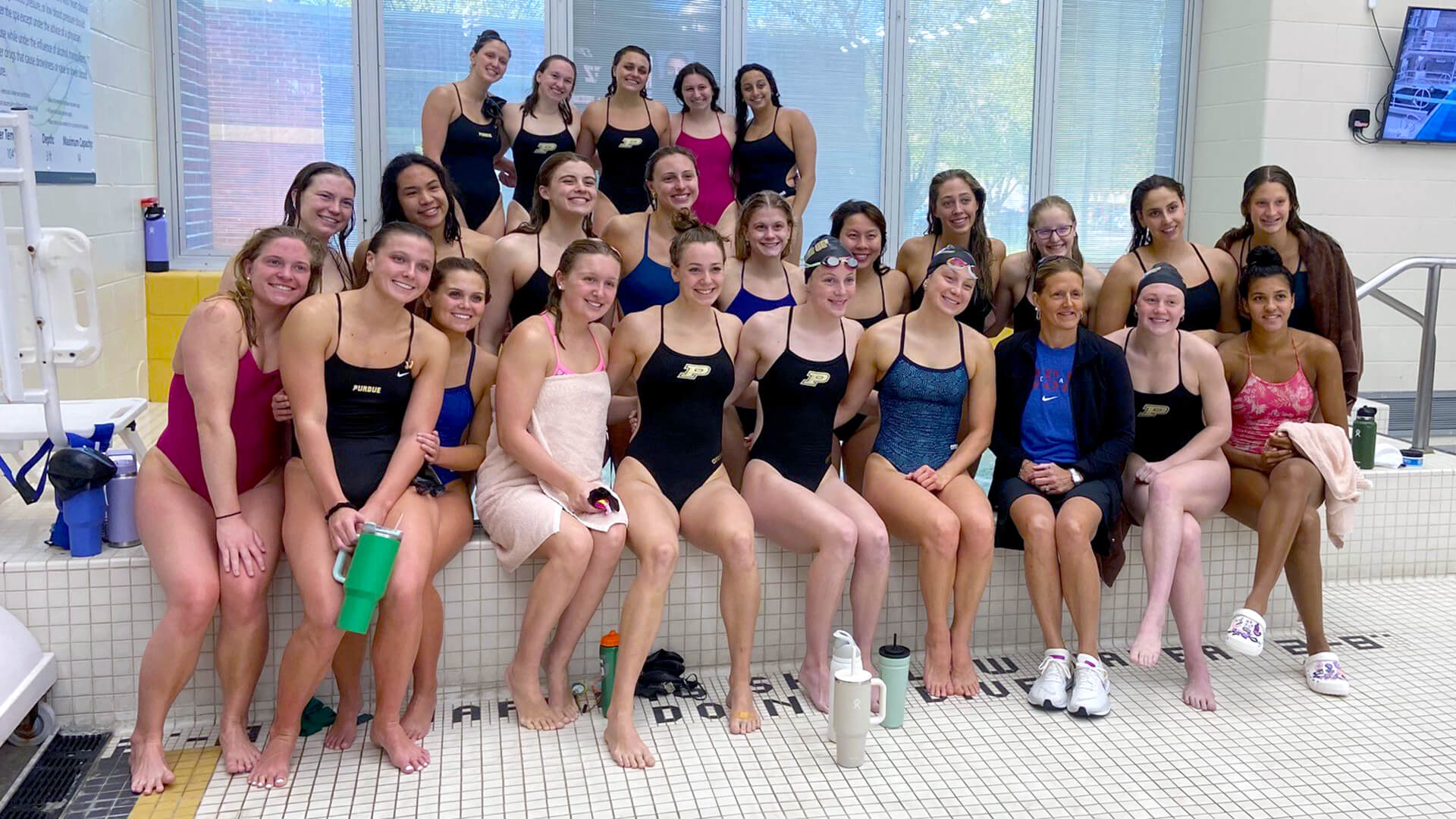
“I am very grateful that she chooses to return to campus to speak in class and provide support and guidance. When they meet people like Julie, who care about their success, our students are encouraged to pursue their boldest aspirations as they consider their professional lives after Purdue.”
Dussliere is similarly encouraging when meeting with Purdue student-athletes, like the members of the women’s swimming team with whom she has so much in common. As a former Boilermaker competitor herself, her words have special resonance when discussing topics like the importance of time management in establishing necessary work-life balance.
According to Purdue women’s swimming and diving coach John Klinge — Dussliere’s contemporary as a Boilermaker swimmer in the early 1990s — it’s a perfect example of how an active alumni base can benefit today’s student-athletes.
“There’s a couple of really good things,” Klinge says. “It’s a highly successful woman — so she’s a really, really good role model for our team — but it’s also someone who was in their shoes not too long ago and can maybe offer a little advice on succeeding in just about any field.”
Dussliere’s reason behind staying involved is simple: “It’s because of the Purdue family” that influenced her and helped shape the accomplished professional she would become.
“You get to the point where, whether you’re giving back in terms of philanthropy or time or other types of resources, it’s just important,” she says. “Purdue was a big part of my life for obvious reasons, and I just love staying involved on campus.”
‘One of my idols and mentors’
Sometimes opportunities to support other Boilermakers emerge in unexpected ways, as well.
Former Purdue women’s basketball player Léony Boudreau (BS biomedical engineering ’21, MS biomedical engineering ’22) was completely unaware of the Boilermaker connection she shared with Dussliere until she first prepared to reach out to the U.S. Paralympics chief about an adaptive sports student organization Boudreau co-founded at Purdue. But once they made contact, Boudreau quickly began to view Dussliere as someone she now calls “one of my idols and mentors.”
“I did a little bit of research on Julie, and I was like, ‘Oh my gosh, she’s a Purdue alum and she’s so involved with athletics,’ so I reached out to her,” Boudreau says. “Honestly, the first time I reached out to her, you know those people you connect with right away? She was so fantastic and so generous with her time. It was kind of history from there.”
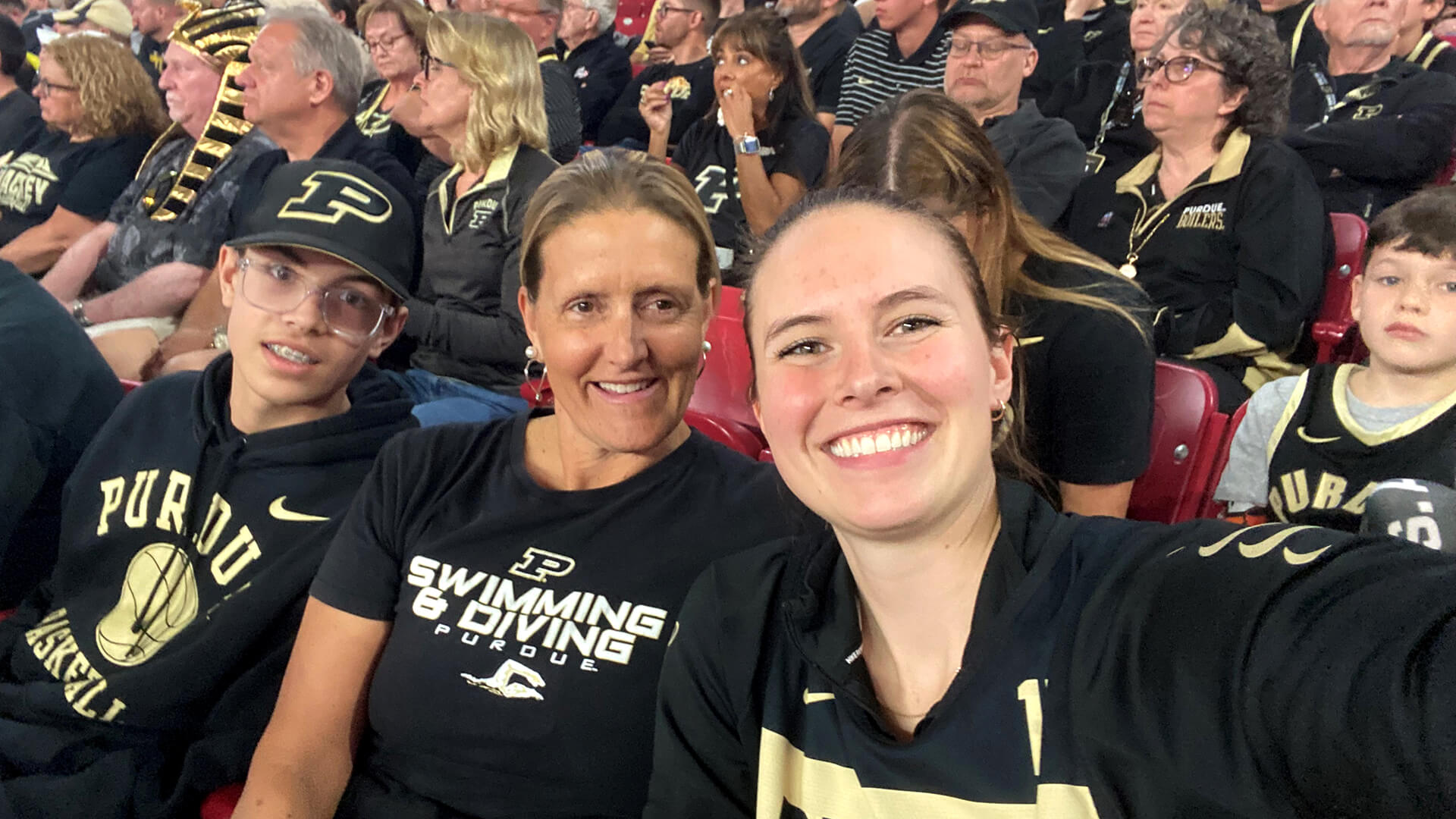
Dussliere continues to support that student organization — RIISE (Reinventing the Interface of Inclusivity, Sports, and Engineering) — which Boudreau co-founded with Shelby Gruss (PhD plant breeding and genetics ’21), a former captain of the U.S. women’s wheelchair basketball team, and a group of Purdue students inspired by their opportunity to make an impact within the Paralympic Movement. Dussliere even traveled to campus in April to attend the third annual Wheel RIISE event, which aims to raise community awareness of adaptive sports and highlight the connection between engineering and athletics.
“Even with her stature and all of the impact and power that she’s gained over the years, she’s one of the most humble people I know and one of the most authentic people I know,” Boudreau says. “I had so much fun with her when she came on campus. She’s definitely an incredible advisor for RIISE and a fantastic mentor for me personally.”
The impact of successful alums like Dussliere was so important during Boudreau’s student-athlete journey that she now also aspires to be a positive influence for current and future Boilermaker competitors.
“Having somebody like Julie stepping in while I was still an athlete at Purdue was huge,” she says. “It opened my eyes on all the other things that are happening in life and all of the impact that you can bring as an athlete to use your platform to just expand your impact broader than your own performance as an athlete.”
Focus on Paris Games
For the next several weeks, though, Dussliere’s primary focus is athlete performance. Team USA, which will compete in the Summer Paralympic Games between Aug. 28 and Sept. 8, includes two athletes with Purdue ties: team captain Evan Austin, a former volunteer assistant coach with the women’s swimming team who still trains at the Morgan J. Burke Aquatic Center, and men’s track and field senior Joel Gomez.
She has supported thousands of successful American athletes through the years and looks forward to seeing many more bring medals home from Paris this summer. No matter how many international competitions she attends, that excitement never gets old.
“It’s about our Team USA athletes getting out there on the field of play and doing what they’ve been training eight, 12, sometimes 20 years to do,” she says. “And just being there to support them and provide them with the support they need to get out there and do their best.”
In two decades at the USOPC, Dussliere has played a direct role in the tremendous growth of international Paralympic competition in athletic performance, participation and visibility. So, while her current occupation might not be the diplomatic role she pictured as a Purdue student, many athletes across the globe — especially those in her home country — have benefited from the way her plans evolved.
“I’m actually doing the job I always wanted to do, just doing it in a different space than I thought I might be,” Dussliere says. “This is a very, very good use of a lot of the big international relations focus from back in my Purdue days.”
I had no indication or thought that I was going to work in the sport world when I graduated. That was not the plan. But then I ended up taking a coaching job instead, and I’ve been in the sport world ever since.
Julie Dussliere (BA Russian ’94),
chief of Paralympics and internally managed sports for the U.S. Olympic and Paralympic Committee
Purdue Olympian Chukwuebuka Enekwechi reflects on Paris experience
Former Purdue All-American thrower Chukwuebuka Enekwechi had a unique perspective on his Olympic experience.
“It was so different from Tokyo,” says Enekwechi, who competed in Paris for Nigeria, the nation in which he holds dual citizenship. “In Tokyo, we called it the ‘Covid Olympics’. You didn’t get that super-fun experience you dreamed about because you competed in empty, massive venues. I contrast that with what I experienced on August 2nd and 3rd, [when] there were 80,000 fans.
“I have competed in stadiums before in front of 50,000 fans, but when I walked out in Paris to a crowd of 80,000 on prelim day, it was amazing. You are already nervous because it could be the end of your Olympic run, but they swallowed me alive when I saw the capacity crowd. There was a constant buzz in the crowd, and I felt it.”
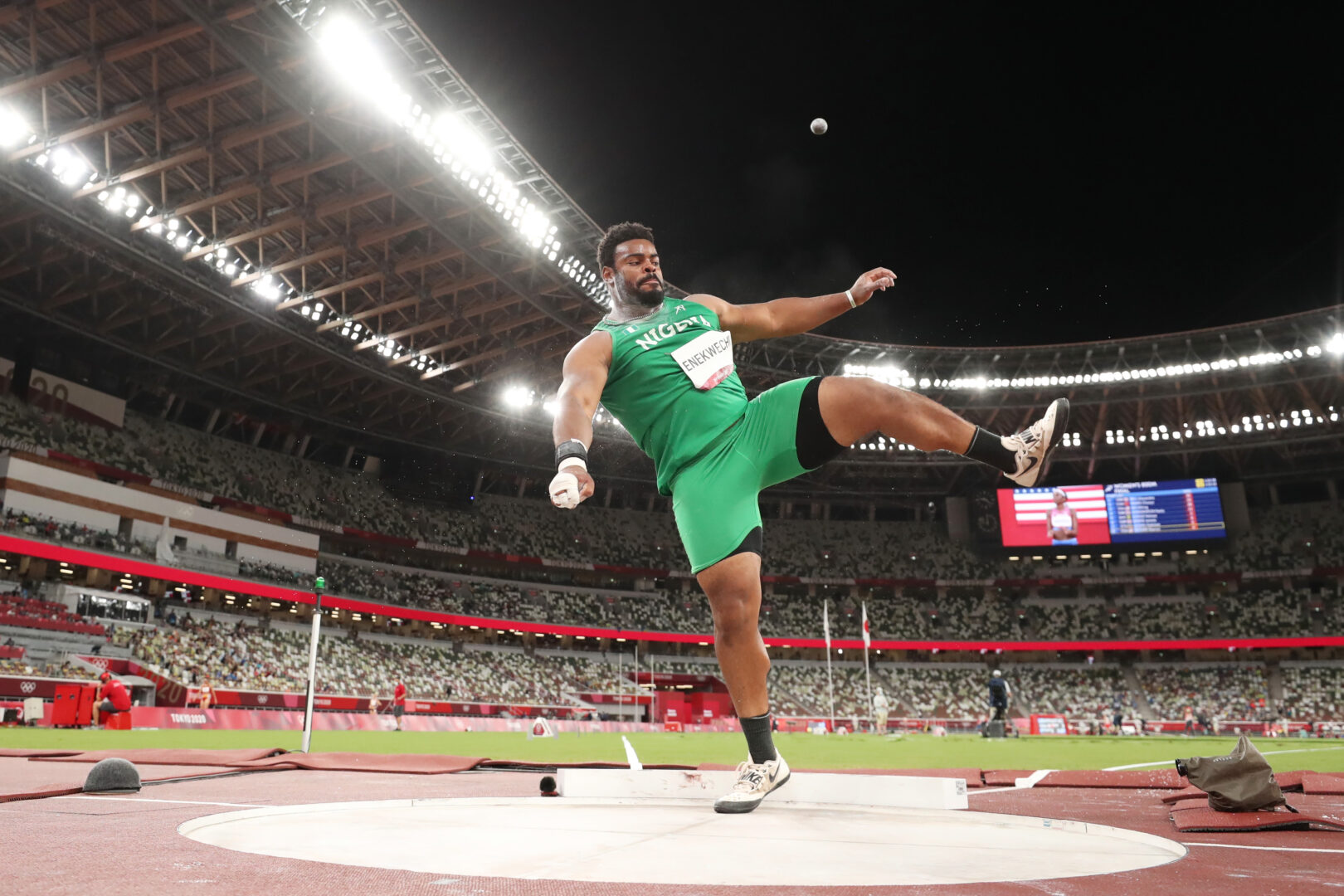
Enekwechi, a self-proclaimed showman, played to the crowd and was pleased that his overall finish from three years prior was cut in half. He finished sixth in the shot put with a throw of 21.42 meters in Paris after a 12th-place finish in Tokyo.
“A crowd like that can help you, or it can hurt you,” says Enekwechi, who visits Nigeria at least once a year. “You have to know how to channel that. You can’t not do your job and then have as much fun as possible because you will look like a fool. So, the first step is to throw far, and then the next thing is to entertain the crowd.”
Ranked ninth in the world entering the Paris Games, he was pleased to finish higher than his ranking and achieve his goal of qualifying for the next day’s final.
However, there was much more to Enekwechi’s Olympic experience than just his two-day competition. While he was disappointed that he could not experience the opening and closing ceremonies, he did have the chance to watch the track & field events, some beach volleyball, and break dancing. He will never forget being in the infield when the 4×100 mixed relay was run, one of the more memorable events of the Games.
“There is a different vibe for track & field in Europe, and when you add the Olympics on top of that, it is taken into the stratosphere,” says Enekwechi, who also ran into a few ‘stars’ including tennis legend Serena Williams. “I take it one competition at a time, but if I am good enough, I would like to compete in Los Angeles in 2028.”
Enekwechi says he is at his physical peak now, at age 31, and looks forward to continuing training and honing his skills as a coach and instructor in the sport. He expects to spend the rest of his professional life doing these roles.
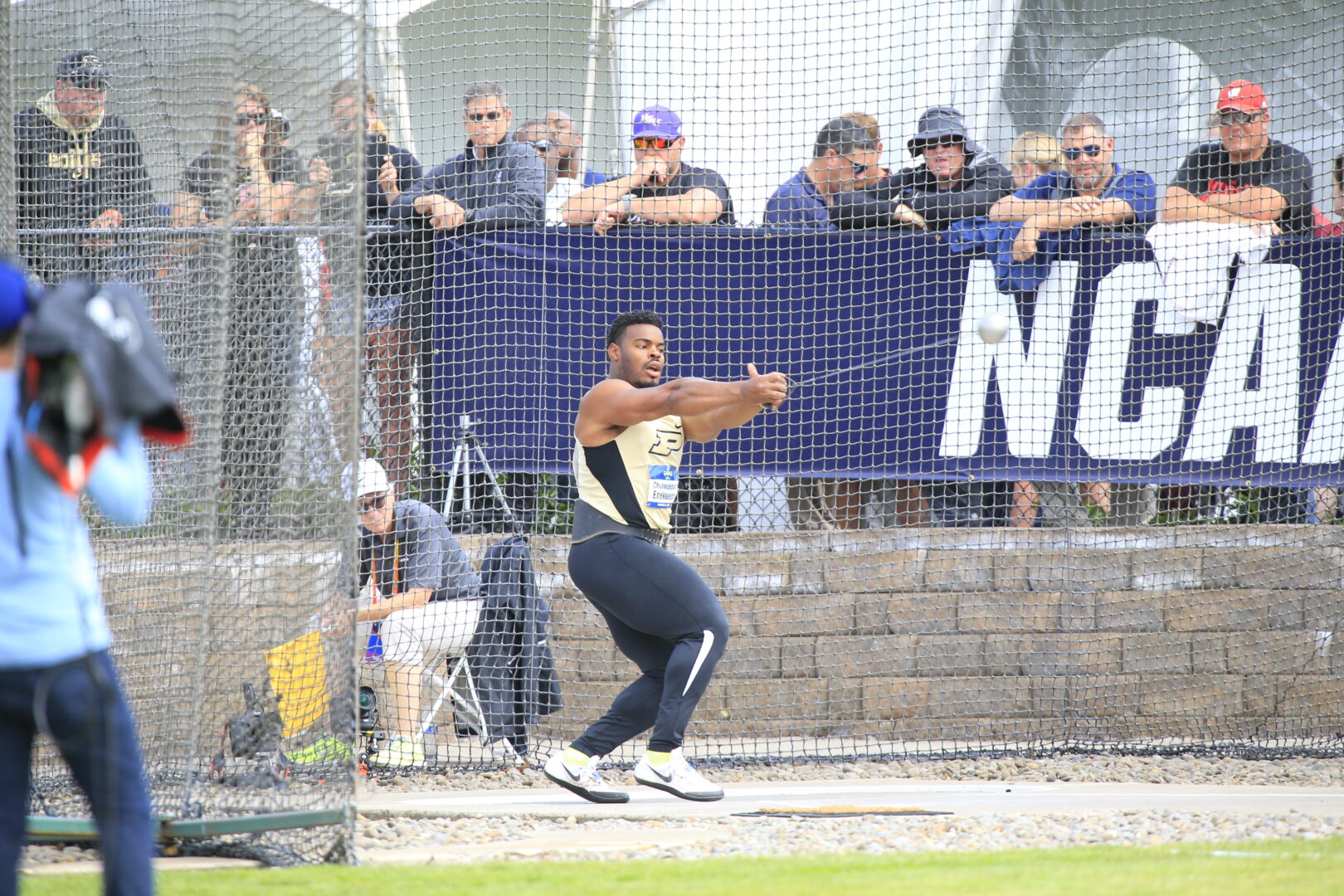

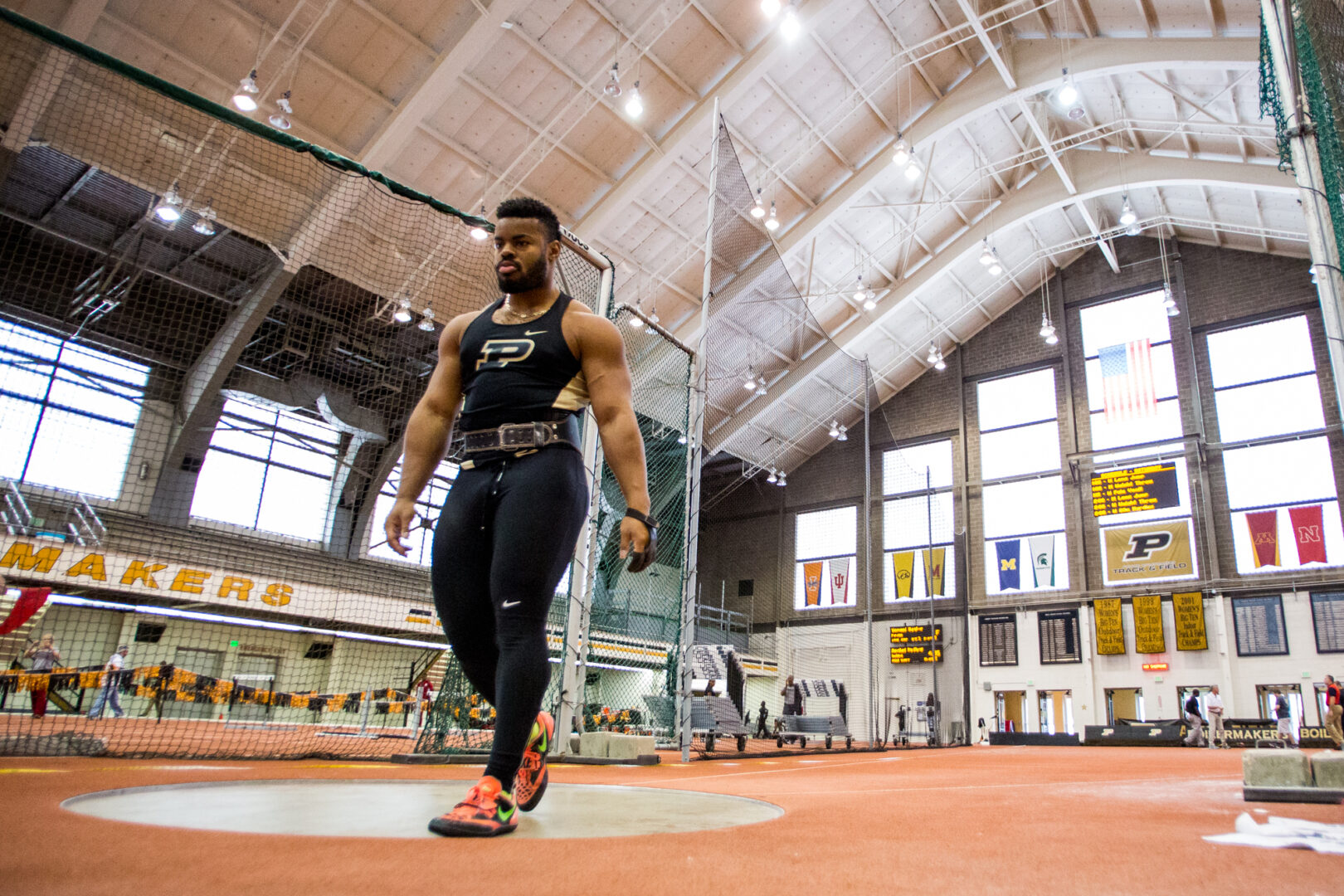


Purdue was not far from his mind during his memorable time in the City of Light. He ran into fellow Boilermaker track & field athlete Devynne Charlton and watched the Bahamian finish sixth in the 110-meter hurdles. He ran into volleyballer Annie Drews, part of the silver medalist USA squad.
Along with five other Boilermaker greats from years past, the trio of Enekwechi, Charlton and Drews will return to campus in October to be inducted into the Leroy Keyes Purdue Athletics Hall of Fame.
“I get goosebumps when I think about my time at Purdue,” says Enekwechi. “I am a pretty sentimental person, so it is an honor to be an ambassador for the school. That is why I stick around campus and want to pay it forward by helping those who experience some of the same angst and struggles I did.
“I wouldn’t be where I am without Purdue.”
Written by Alan Karpick, publisher of GoldandBlack.com
‘Life is too short for a boring career’
At 50, fun-loving Patti Bertolino says Purdue Global redeemed her opportunity to earn the master’s degree she always wanted.
Patti Bertolino (MS instructional design ’24, Purdue Global) is never boring. She really hates boring.
Her favorite leisure activities are all excitement — she likes to ski. She scuba dives. She travels. So when it comes to her career, why shouldn’t that be exciting, too?
In particular, she’s passionate about making learning fun, so designing the instruction for corporate training sessions was a perfect fit. But as she neared 50 and a post-COVID-19 world started to see cutbacks and layoffs in the corporate sector, she wanted stability.
As much as Bertolino lives for excitement, wondering whether she’d be able to continue on her path if layoffs came around was not what she had in mind. She knew that gaining an edge over the competition would have to involve earning a master’s degree.
“A master’s gives me authority as a subject matter expert,” she says. “It’s a well-respected credential that will help me stand out if I’m ever in the position of searching for a new job.”
Freshly graduated from Purdue Global, she reflects on how her online master’s changed everything.
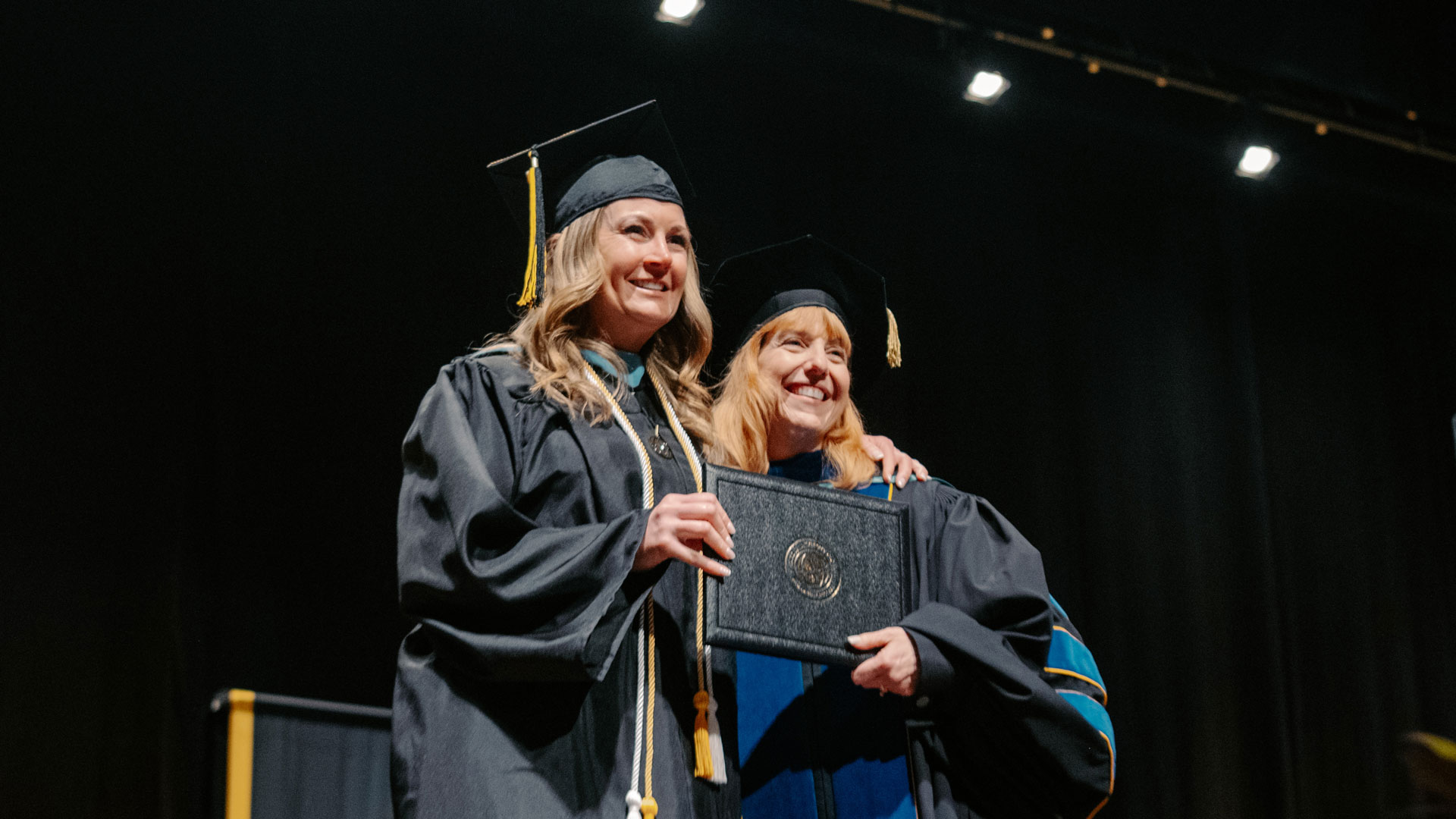
Making learning fun as an instructional designer
It was during a staff training session when she was new to corporate America that her mind started to wander. She fantasized about how she’d make the session fun. How could it be interactive? How would she get people excited about the information?
Her career was born in that moment.
“I realized I wanted to be the person in front of the room,” she says. “I’m eager to learn, but I’m also eager not to be bored! So I became a trainer for a national financial services corporation. It was a very high-traffic training situation because mortgage rates would go down — we’d hire 500 people. A new law would get passed — we’d hire 400 more.”
Before she knew it, she was teaching thousands at a time at a well-respected corporation, learning everything she could from YouTube and reading books. She was making escape rooms. She was modeling trainings after “The Amazing Race.” In every way, Bertolino was killing it.
As she continued down this path, the next step seemed to be an advanced degree. Her company was covering tuition for employees, and Bertolino says it couldn’t have been a more accessible setup.
“We had tuition reimbursement. They literally came to our building and taught classes. It was almost a no-brainer,” she says.
It was so reachable, in fact, that it was easy to take the opportunity for granted. She’d do it someday.
But time ran out.
The professors really let me be me on the discussion boards. … I was one of the few who already works in corporate. They allowed me to share (my experience) with my peers in class.
Patti Bertolino
MS instructional design technology ’24, Purdue Global
A missed opportunity
In 2018 the company Bertolino had worked at for 20 years was bought. Employees who designed curriculum were among the first to be laid off. On top of the upheaval and emotional devastation, there was regret over the degree she never got.
“It would have been so easy. It was right there!” she says.
Finding another job wasn’t easy, but eventually she began doing what she loved again at another prominent financial institution. Unfortunately, four years later, in a post-COVID-19 economy, that company had to shutter its doors, and she was in the job market once again.
She was rattled. With layoffs becoming more and more common, she had to do something to secure her place in the field she loved. And she couldn’t help but remember that she’d once had the chance to make herself stand out.
But rather than wallow in that mistake, Bertolino vowed not to make it again.
“It really shook me,” she says. “When I was hired at Prudential, I thought, ‘This time, I’m getting a master’s degree.’ I wasn’t going to let an opportunity like that slip away again.”
An online education to stabilize the future
“I picked Purdue Global because companies are moving into a more global, work-at-home scenario. There were local options, but everybody’s heard of Purdue,” she says.
Bertolino found that her classes didn’t just teach her what works in her job — she already had a strong knowledge base from her 20 years of experience — but she learned why her techniques worked.
“I got to learn the theory behind many of the practices I’ve been using for years, and it gives me credibility,” she says.
During her experience as a Purdue Global student, she also felt respected for the wisdom she’d already earned in the field.
“The professors really let me be me on the discussion boards,” she says. “A lot of the people in my class were teachers who wanted to move to a corporate model because of COVID. I was one of the few who already works in corporate. They allowed me to share ways I engage my audience with my peers in class.”
And now that she has her degree in hand, she hopes when others hear her story, they’ll know their limitations might not be as limiting as they think.
“I want to inspire others because sometimes people think they can’t go back because they have a baby, or they’re not in their twenties anymore, or they work full time. I tell them, ‘No, you can! I’m 50!’” she says. “It’s never too late to learn.”
Companies are moving into a more global, work-at-home scenario. There were local options, but everybody’s heard of Purdue.
Patti Bertolino MS instructional design technology ’24, Purdue Global
Boilermaker Olympians on the world stage
(Editor’s note, Aug. 11: Former Purdue All-American Annie Drews became a back-to-back Olympic medalist on Sunday when her U.S. team claimed a silver medal in women’s volleyball, having previously won gold in the Tokyo Games. Drews was one of 12 Boilermakers competing in Paris, a group that also included two sixth-place finishers (Devynne Charlton in the women’s 100-meter hurdles and Chukwuebuka Enekwechi in the men’s shot put) and an eighth-place result in 3-meter synchronized diving by Tyler Downs and Greg Duncan. Meanwhile, a trio of Purdue divers — Daryn Wright (19th place), Jaye Patrick (22nd) and Maycey Vieta (24th) — competed in the women’s 10-meter platform; diver Brandon Loschiavo took 17th in the men’s 10-meter platform; incoming graduate transfer swimmer Matheo Mateos placed 20th for Paraguay in the men’s 200-meter individual medley; swimming alumnus Nikola Aćin competed on the Serbian team that placed 11th in the 4×100 freestyle relay; and South African Paula Reto tied for 44th in women’s golf.)
No matter how you measure it, experience served as a teacher for the Purdue athletes participating in the Paris Summer Olympics.
In diving, the sport of four current Boilermakers, there was the added benefit of having four-time medalist David Boudia as an assistant coach of Team USA.
“I don’t know if it is cooler to make it as an athlete or watch someone make it,” said Boudia, who is in his fourth year as a coach with the Boilermaker diving program and who recently took over the head coaching position when Adam Soldati stepped down for health reasons. “Anytime you go to an event at this level, the athletes who will have success are the ones that can control (what is going on in) their heads. I love working with them on that part of the sport.”
And Boudia’s message is resonating. Maycey Vieta was the first to qualify, competing for Puerto Rico and assuring Purdue was represented in diving for the fifth straight Olympics. She has been in several international championship events, but this was her first time at the quadrennial showcase.
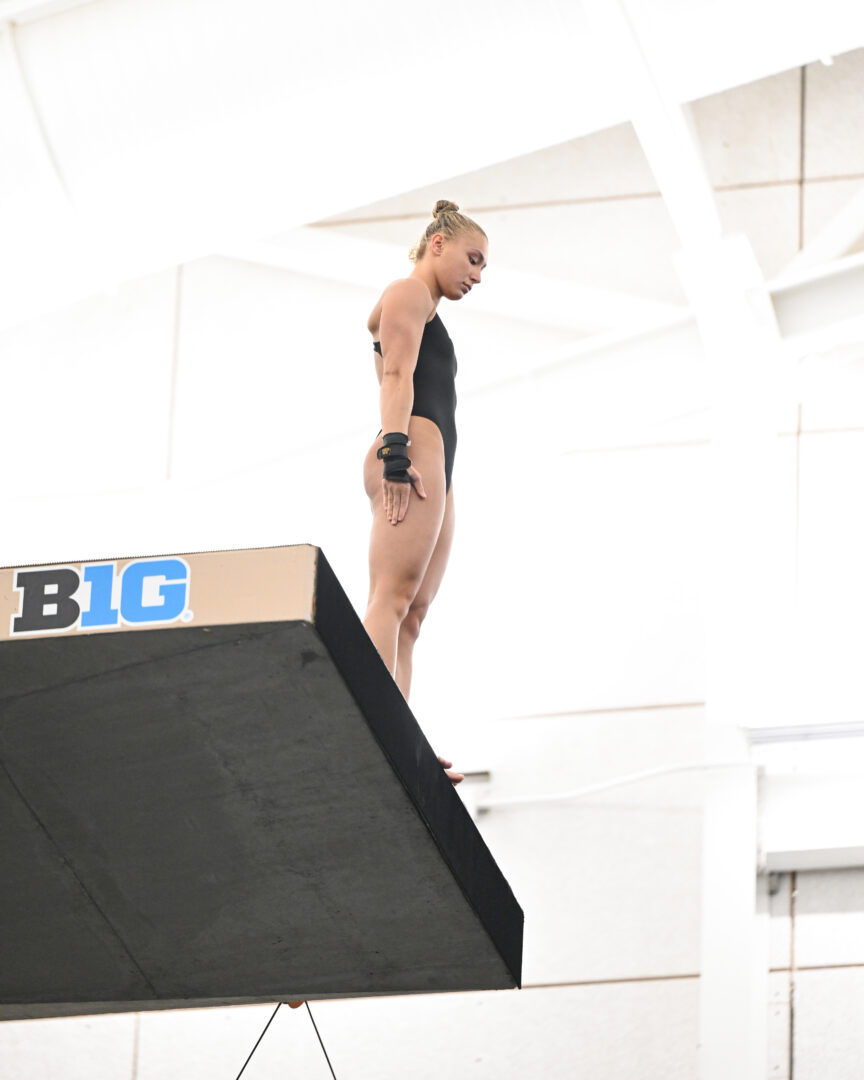
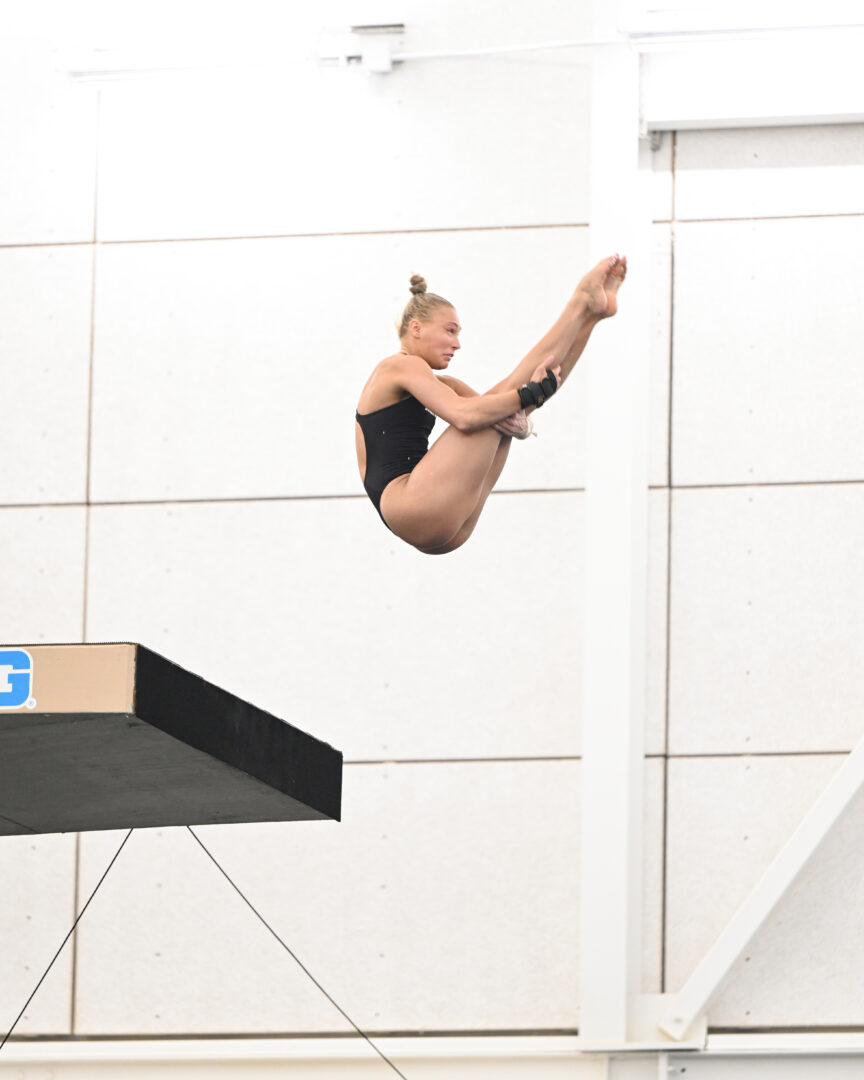
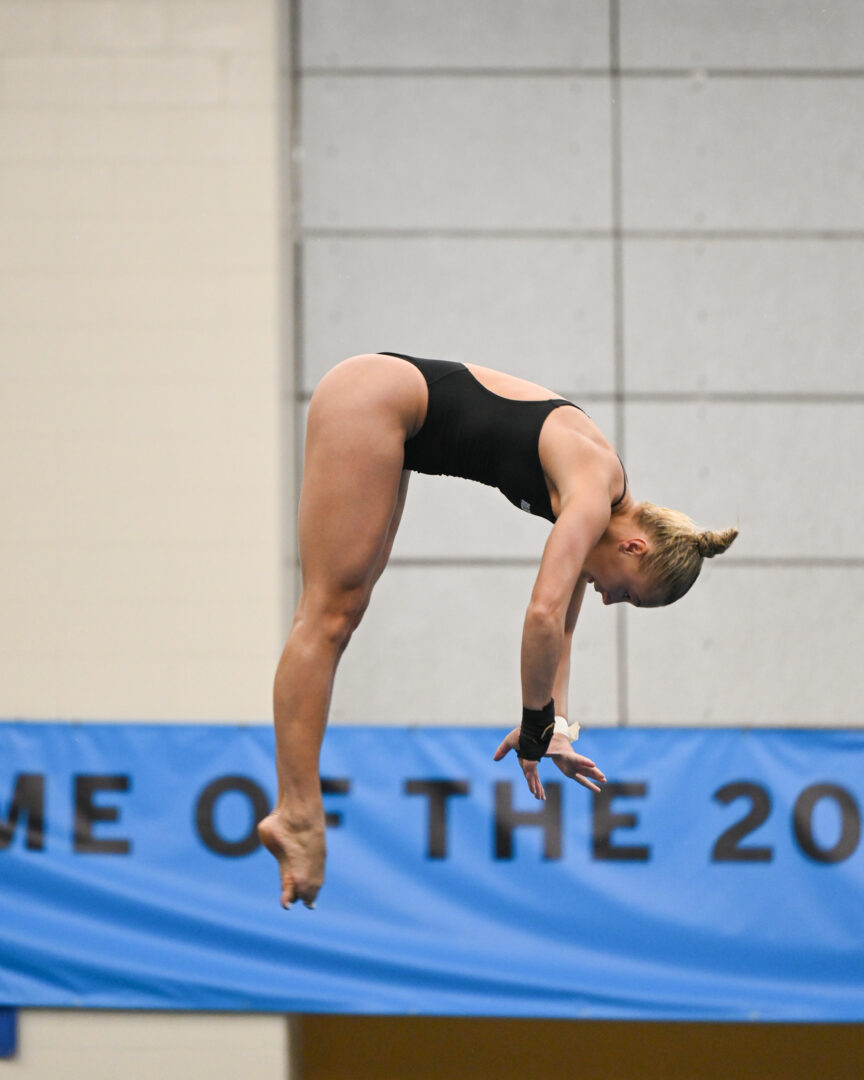
“My goal is pretty simple; I want to execute my cues on all five dives,” Vieta said prior to leaving for Paris. “That is what Dave and I have worked on. These are the same five dives I have done (in competitions) for the last four years.”
It was a bigger stage, to be sure, but it was also about having the mind lead the body into flawless execution.
While Boudia coached Vieta at the Games, it was also extra special for her to have support from Boilermaker teammates Daryn Wright (representing the U.S.) and Jaye Patrick (Latvia) while the trio competed in the 10-meter platform event. (And to be proposed to by fellow Boilermaker Olympic diver Greg Duncan in Paris).
“It feels like home having all the Purdue divers in Paris,” Vieta said. “It is very comforting to have all my teammates there. Dave and Adam warned us that it would be a new experience and, at times, emotionally exhausting because of other events like the opening ceremonies. Still, we will represent our country, which is the focus.”
It feels like home having all the Purdue divers in Paris.
Maycey vieta, former purdue diver (2020-24)
Boudia, who will help coach Brandon Loschiavo on 10-meter on Friday, also worked with Duncan and Tyler Downs in the 3-meter synchronized event. Duncan is a four-time All-American and teamed with Downs, who spent a year at Purdue and won the 2022 NCAA title on platform.
Loschiavo did not learn he had qualified until a day before the opening ceremony when a quota spot opened up late for diving. Like Wright, he had finished as the runner-up on 10-meter at the U.S. Olympic Team Trials in June.
Downs and Loschiavo competed in the Tokyo Olympics three years ago, while Duncan, age 25, made his first appearance on the world’s biggest athletic stage.
“This team (at Purdue) is built with Olympians and those that treat the sport with respect,” said Duncan, who admitted he would rely on his diving partner’s previous Olympic experience. “If we do what we are expected to do, it will turn out great.”
Although all of the divers except Downs were first-time Olympians, all are veterans of elite international competition. Wright (20) is the youngest and Downs turned 21 in mid-July.
Patrick began her collegiate career at Northwestern before spending her fifth year as a graduate student training at the Morgan J. Burke Aquatic Center under Soldati and Boudia. She credited Boudia for convincing her to continue her career after she competed for Latvia at the 2023 World Aquatics Championships in Japan.
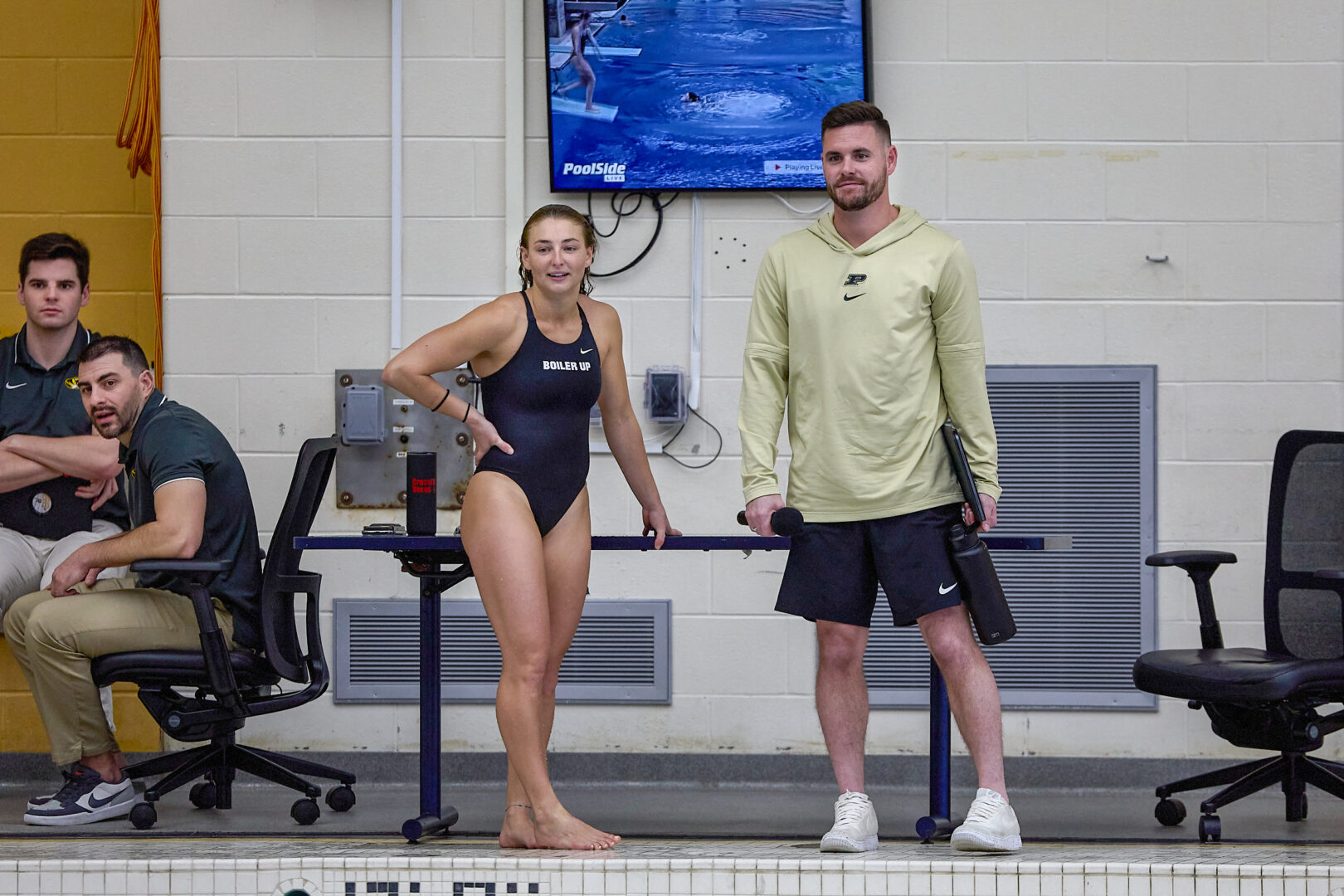
“I was always realistic, thinking, ‘No, this can’t be me who will make it to the Olympics,’ especially since I started so late,” Patrick said. “Dave said, ‘You are not done yet; we will work on this and get you to the Olympics.’ So it became a realistic dream of mine about a year ago. He worked on the mental approach, and it changed everything.”
When Patrick arrived in the City of Light, her approach was simple. “I want to keep my head on straight and do my best,” she said. “I used to be alone at international competitions in past years, but now I have teammates and coaches (that I know). It means so much.”
Wright said Boudia and Soldati’s approach to the mental aspect also helped her earn a spot on Team USA. And she utilized their “one day at a time” approach when the competition began. Especially after some heartbreak in past international competitions.
“(The Olympics) is the same thing I have done for a long time,” Wright said. “It just has a fancy name attached to it.”
Experience also permeates Purdue’s non-diving Olympians
Boilermakers Annie Drews, Chukwuebuka Enekwechi, Devynne Charlton, Nikola Aćin and Paula Reto all made their second trip to the Olympic Games.
Drews played a vital role on USA’s first women’s volleyball gold medal team in the Tokyo Games, while Enekwechi looked to improve on his 12th-place finish in the shot put. Charlton had a sixth-place finish in the 100-meter hurdles in the 2020 Olympics, representing the Bahamas. She is now a world record holder in the 60-meter hurdles, traditionally an indoor event. Aćin earned a second trip to the Olympics after being part of Serbia’s victorious 4×100-meter freestyle relay at the European Aquatics Championships in June.
Former Purdue golfer Reto made her second appearance after competing for South Africa in Rio in 2016.
“It is such an accomplishment to have ‘Olympian’ next to your name,” said Reto, a freshman on Purdue’s 2010 national championship team. “It is one dream to get there and another to win something.”
Reto, who has competed on the LPGA Tour since graduating from Purdue in 2013, won’t be able to attend the opening or closing ceremonies as golf takes place in the middle of the Games, sandwiched between LPGA events. But she planned to support her Purdue brethren, even if it was from the stands.
“My goal is to see many other sports and other Purdue athletes perform in Paris,” Reto said. “I fondly remember cheering David on in Rio.
“Purdue changed my life,” she added. “We had such a great coach in Devon Brouse. Everything we had at Purdue was in top shape, and I love that the tradition of athletics excellence lives on at the Olympic Games.”
Boilermaker gold in past summer games
Purdue has been a frequent participant in the Summer Games and has had success, winning 14 gold medals, seven silver medals and six bronze medals.
Ray Ewry’s 10 gold medals in the standing high jump and long jump from 1900-08 boosted the school’s medal totals. Purdue went without a medal for the next nine Olympiads before swimmer Keith Carter won a silver in the 200-meter breaststroke in London in 1948. Four years later, Coach Richard “Pappy” Papenguth coached the U.S. women’s swimming and diving team. Papenguth led the Boilermaker swimming program until 1969.
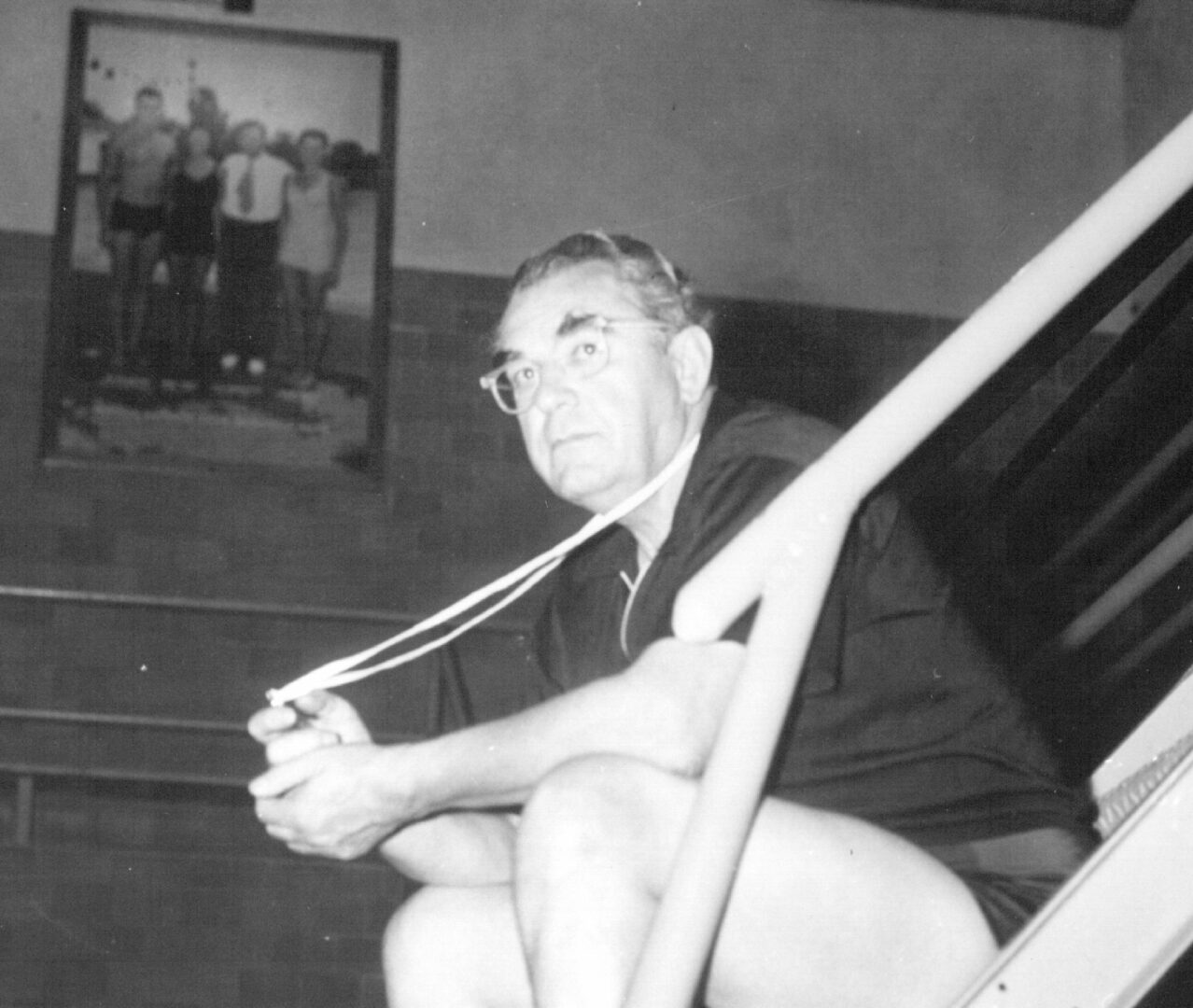
Howie Williams (1952) and Terry Dischinger (1960) are the lone Boilermaker men’s basketball players who earned medals (both gold). Fifty-two years later, David Boudia dramatically brought home the gold in 10-meter diving in London. Amanda Elmore became the first Boilermaker woman to win gold. Elmore won it in rowing in 2016, followed by Annie Drews in volleyball in 2020.
Purdue’s participation in the Summer Games in the 21st century is by far its most remarkable run of success since the modern Games began in 1896. In total, 55 athletes with Purdue ties have competed since summer competition began, 31 since 2000.
Written by Alan Karpick, publisher of GoldandBlack.com since 1996.
2024 Boilermaker Olympians (years at Purdue)
- Nikola Aćin, Swimming (2019-22) — Serbia (placed 11th in 4×100 freestyle relay)
- Devynne Charlton, Track & Field (2014-17) — The Bahamas (placed sixth in 100m hurdles)
- Tyler Downs, Diving (2021-22) — USA (placed eighth in 3m synchronized springboard with Greg Duncan)
- Annie Drews, Volleyball (2012-15) — USA (team won silver medal)
- Greg Duncan, Diving (2019-22) — USA (placed eighth in 3m synchronized springboard with Tyler Downs)
- Chukwuebuka Enekwechi, Track & Field (2012-16) — Nigeria (placed sixth in shot put)
- Brandon Loschiavo, Diving (2016-21) — USA (placed 17th in men’s 10m platform)
- Matheo Mateos, Swimming (incoming graduate transfer) — Paraguay (placed 20th in the men’s 200m individual medley)
- Jaye Patrick, Diving (2024) — Latvia (placed 22nd in women’s 10m platform)
- Paula Reto, Golf (2010-13) — South Africa (tied for 44th in women’s golf)
- Maycey Vieta, Diving (2020-24) — Puerto Rico (placed 24th in women’s 10m platform)
- Daryn Wright, Diving (2022-) — USA (placed 19th in women’s 10m platform)
2024 Boilermaker Paralympians (years at Purdue), the Paralympic Games begin Aug. 28
- Evan Austin, Swimming (volunteer assistant coach 2019-22, currently trains at the Burke Aquatic Center) — USA
- Joel Gomez, Track & Field (2023-) — USA
Guild partnership with Team USA has athlete chasing down the next dream
This four-time U.S. Paralympian and Purdue Global student looks toward a future that includes a master’s degree in education.
Focus.
Drive.
Determination.
Strength.
You’d expect to be able to describe any elite athlete with these words, and four-time U.S. Paralympian Rose Hollermann exudes all of them. But perhaps one thing that’s visible in her face, her body language and how she speaks is a trait that makes her exceptional on a completely different plane — something that may be surprising to see in someone who has suffered so much.
Joy.
When she was 5, Hollermann, along with her mom and three older brothers — Seth, Shane and Ethan — were in a car accident that partially paralyzed Rose from the waist down and claimed the lives of Shane and Ethan.
“When something really bad happens to you, you’re sad for a while. You grieve. After a long time, that first moment you feel happy again …” She pauses, searching for words to describe it.
“That kind of happiness is really hard to describe. It’s like a breath of fresh air. It’s intense. You’ve seen how bad things can be, and it makes you appreciate more.”
As she worked toward functionally walking again, 5-year-old Rose participated in adaptive swimming and soon went competitive with it. Then, she couldn’t be stopped. She tried sled hockey, archery, tennis, cross-country skiing, and track and field sports. But when she discovered wheelchair basketball, she found family.
“I have a hard time calling it work,” she says. “I think if you’re doing something you like, then it isn’t work. It’s something more joyful than that. Finding things I’m passionate about really motivates me.”

It has motivated her all the way to the top of her sport. At 15, she became the youngest person to qualify for the national team. She competed in her first Paralympics in London in 2012. She came back to win gold in 2016 at the Rio Games, and then for yet another round in the Tokyo 2020 Games, where she helped lead a young, completely new team to the bronze. Now, she’s on her way to her fourth Paralympics appearance in Paris.
But her plans don’t end there. She’s seeing a future beyond basketball — one helping kids find their happiness, just like the volunteers in her community who helped her after her accident.
“The reason we are who we are as individuals is because of the people who gave back to us. Growing up as a disabled kid, I was surrounded by people who were volunteering. Their time was dedicated just for us to have a little bit of happiness,” she says. “I hope, after basketball, I can spend my life giving back to others, whether it’s being a teacher or working in the sport.”
Team USA and Guild came together at just the right time, then, to inspire Hollermann to earn a master’s degree in education from Purdue Global.
I think as a 5-year-old, realizing that maybe something you thought was taken away from you is actually something you can work really hard to gain back — I think that was a really great lesson for me, and I’ve held onto that.
Rose Hollermann
U.S. Paralympian, Wheelchair Basketball
MS Education
Learning to walk again
Hollermann says it was first thought that her paralysis from the waist down was complete, and there was no hope of walking again.
But in a shocking moment, she confided to her uncle, who sat in the room with her.
“I told him, ‘They’re saying I can’t feel my feet, but I can feel my feet.’”
This sent her uncle chasing down a doctor, who ran more tests and concluded that her spinal cord injury was partial, not complete. It would be possible after all for her to learn to walk again. But it was going to take a lot of hard work.
Although her capacity to walk would be limited (she still uses a wheelchair most of the time because her affected gait has a history of causing her severe knee pain), the mental shift had a profound impact on her young mind.
“I think as a 5-year-old, realizing that something you thought was taken away from you is actually something you can work really hard to gain back — I think that was a really great lesson for me, and I’ve held onto that,” she says.
The long process of relearning to walk and the lessons it taught her carried her through other challenges down the road. She became stubborn. Then she became determined.
“As an adult, looking back at the therapy I had to do to learn to walk again, I learned valuable lessons about putting the physical work into your body to reach a goal,” she says. “Now, as an athlete, it’s something I get to feel every day — setting goals for myself that I can try to reach to become a better player.
“My mom likes to say, ‘If you want Rose to do something, then tell her she can’t.’ When I started wheelchair basketball, I was always the only girl. So just the idea of someone saying, ‘You can’t do that; you’re a girl,’ was something that really motivated me. I wanted to prove that we’re the same.”
But when it came to narrowing her scope to one sport, there was something healing about playing with a team as opposed to competing in individual sports like archery or tennis.
“I really liked basketball because it was a big group of people working together, which was something I’d lost,” she says. “Our family was basically cut in half, and that whole big-family feeling is the thing I miss the most.”
The joy only increased as her training intensified, and she started to have success in her chosen sport. Now, as a member of Team USA, Hollermann says it has the ultimate large family feel to it, especially when she became the youngest on the team at age 15.
“I grew up on the national team. It was my first opportunity to have sisters, and my team really treated me like their little sister. I think the second youngest was 10 years older than me,” she says. “They really brought me under their wing.”
That year at the London Games, Team USA barely missed the podium, finishing in fourth place. But the experience was life-changing, and Hollermann was ready to gain some speed.
But it was the next Paralympics in Rio that would change her relationship with basketball forever.
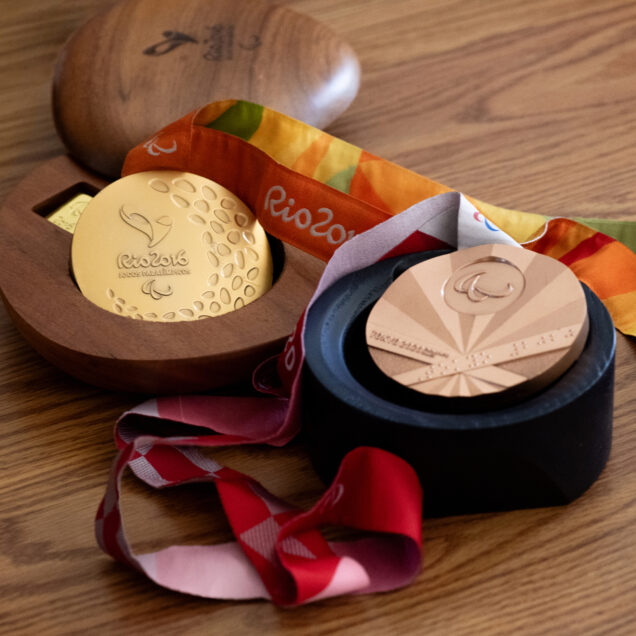
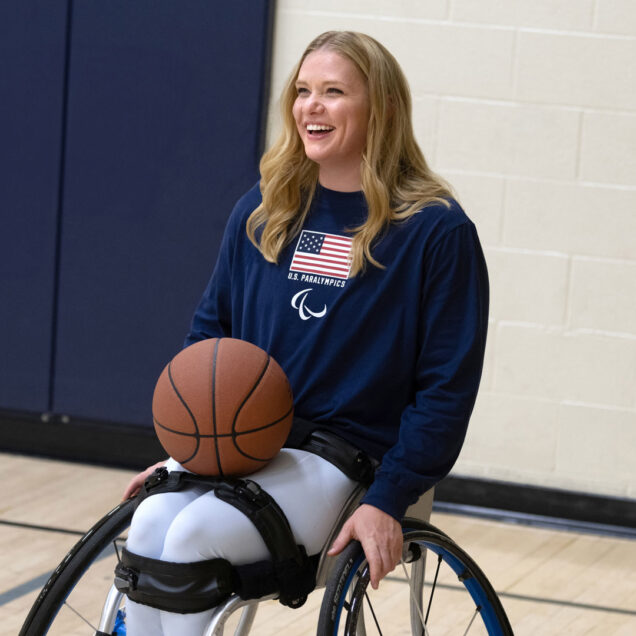
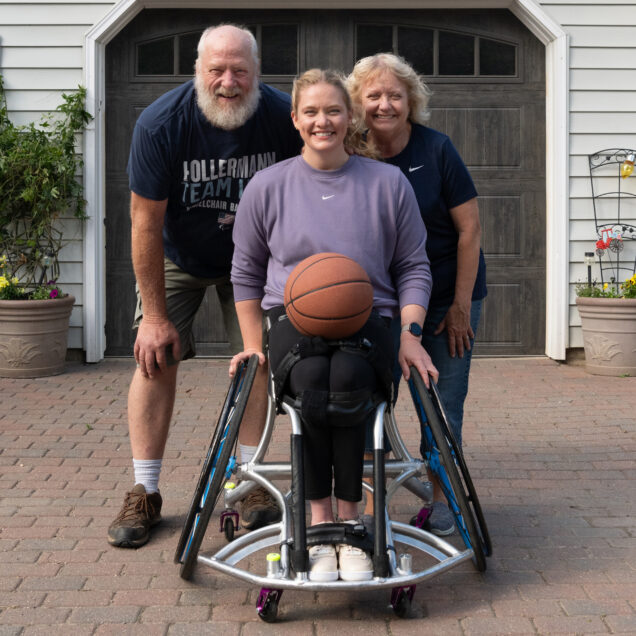

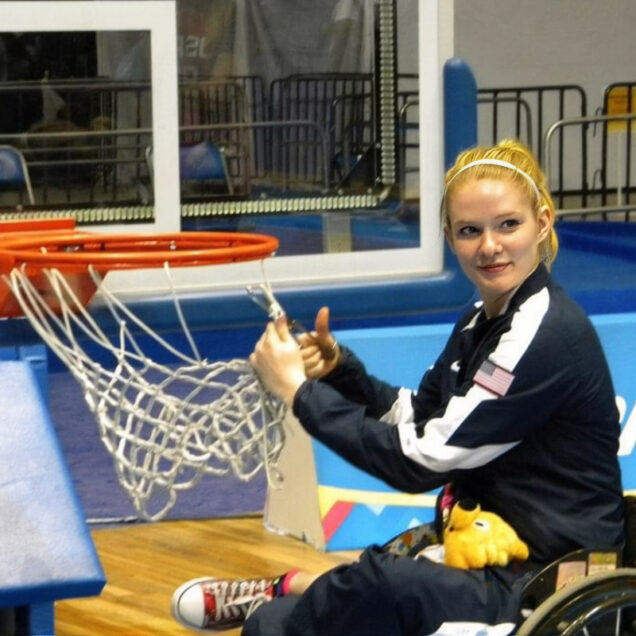
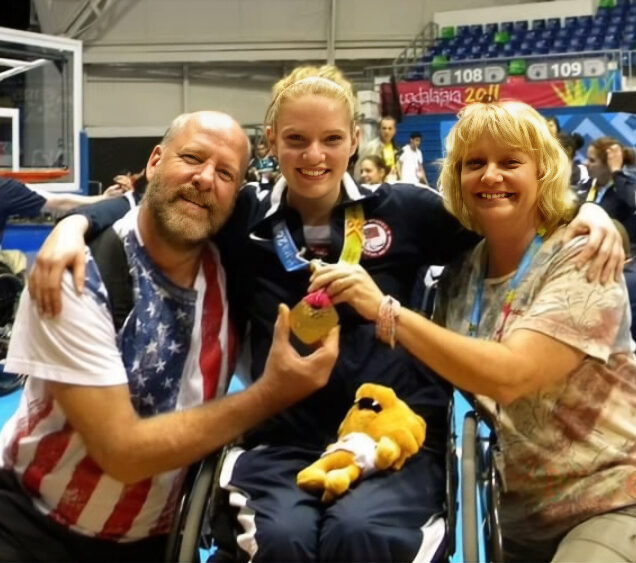
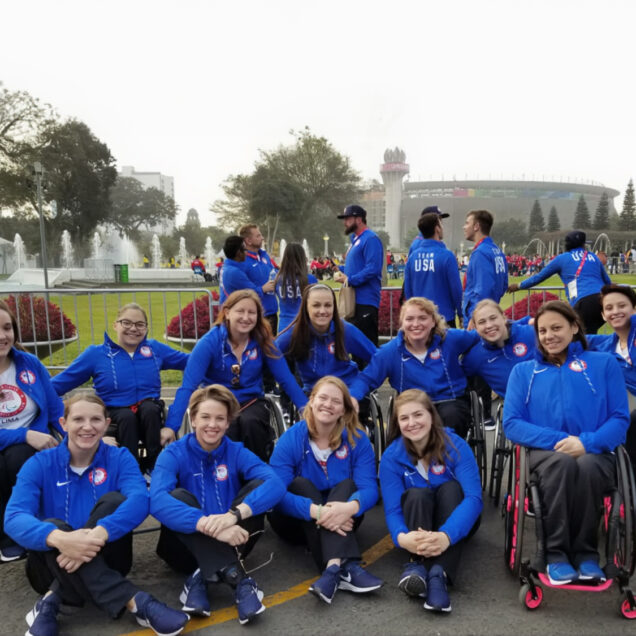
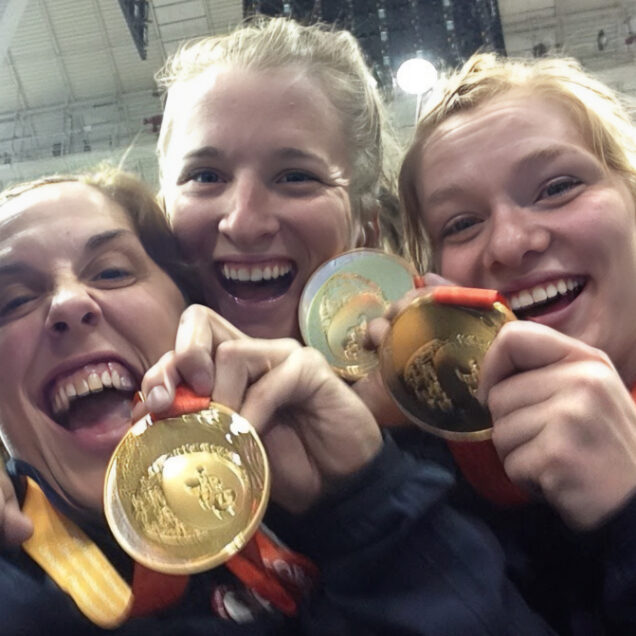
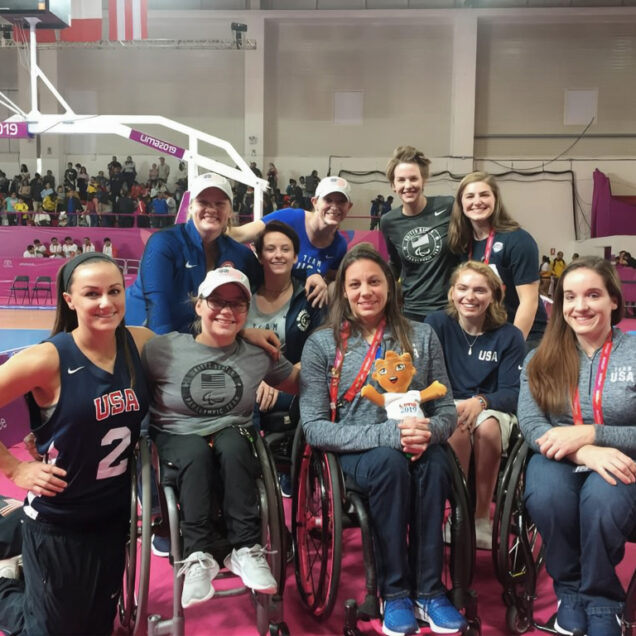
Gaining speed, facing setbacks and moving Team USA forward
It was the ultimate win — Hollermann helped Team USA bring home the gold in 2016.
“We won gold in Rio. It’s a dream come true for every athlete; you’re always striving for gold,” she says. But that ultimate high was followed by what felt like an overwhelming challenge.
“In 2016 we had all but three girls retire after the Rio Games, which is something that’s actually really rare in wheelchair basketball,” she says. “In 2020 we brought a really young group of girls, super inexperienced, to the Tokyo Games.”
Hollermann was thrust into leadership on that team, working relentlessly to help each of her teammates maximize their skill set and develop the team chemistry.
“We had to really grind for everything we earned, and that made it really special,” she says. “We ended up winning bronze in Tokyo, and it felt really great, knowing how much work we put into it. I think we put more work into the bronze medal than we did the gold just because we came from so far behind. We had to learn and grow together to get to that position.”
In 2019, while training for the Tokyo Games, Hollermann earned her bachelor’s degree in elementary education and was almost simultaneously presented the opportunity to earn her master’s — a one-year-only offer.
“I thought going abroad for the first time and playing professionally, I would be too overwhelmed to be taking classes on top of that,” she says. “I always regretted it because I just didn’t get the opportunity again.”
But when she took a trip to Japan to visit a college friend, she started reconsidering.
“My friend was from Japan and got his master’s in the States. When he went back to Japan, he started a program for adaptive sports. During my visit, you could see how much his master’s degree helped, how much he was able to do with it. Having that real-life experience, seeing him thriving, I was ready to start exploring options,” she says.
That’s when the opportunity of a lifetime landed in her email.
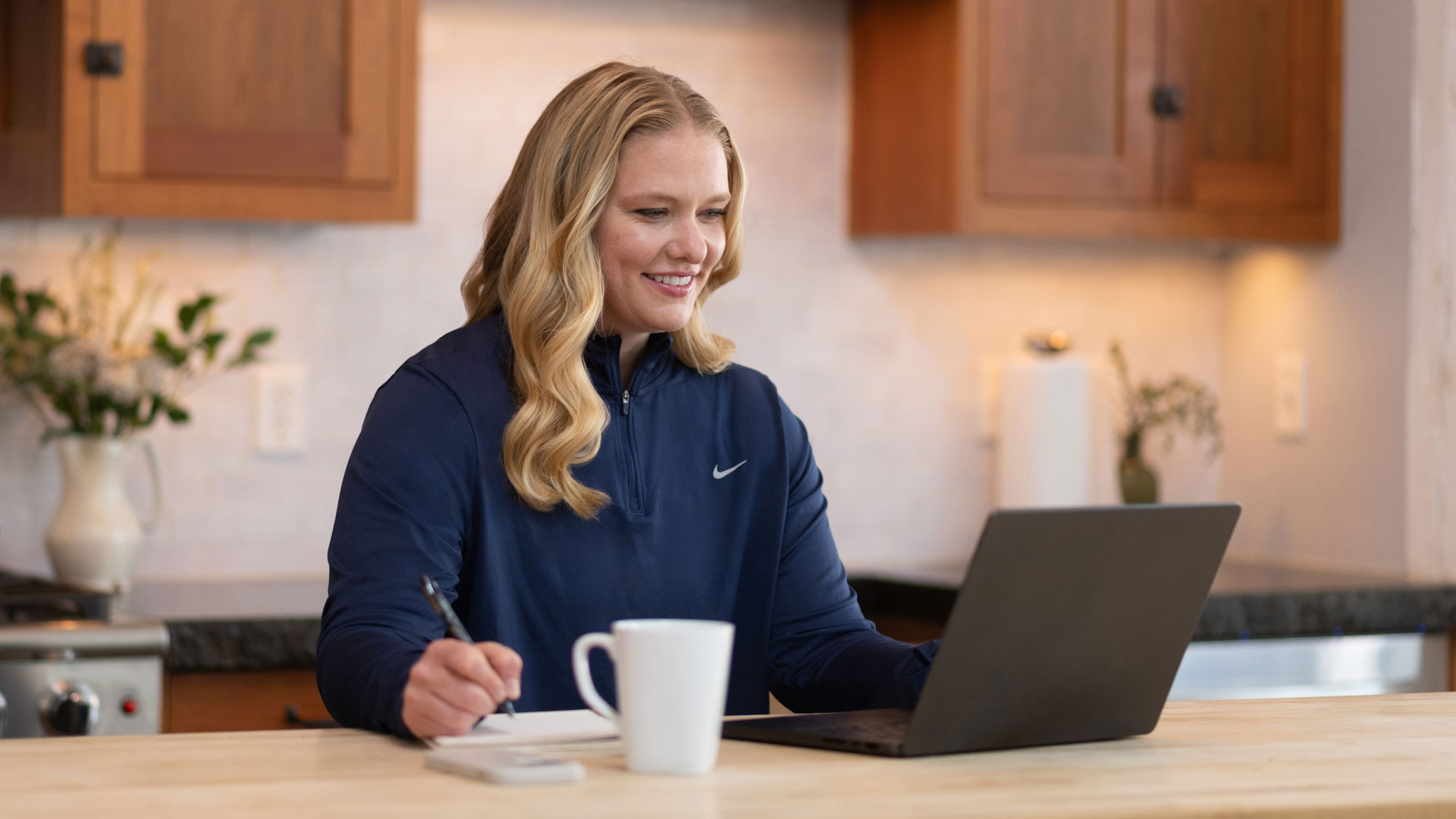
Chasing dreams at full speed with Purdue Global
“Instantly” is the best way to describe how Hollermann responded to the email announcement that Team USA was partnering with Guild to provide athletes with the educational opportunities they needed to build a future after sports.
“As soon as I read the email, I applied immediately,” she says. “I’d been waiting for something like this.”
And her experience with Purdue Global has already shown that it will go above and beyond for its students.
“Already, the process with my advisor has been really good with getting set up. When I was applying for my bachelor’s with other universities, I didn’t have quite such an interactive experience with that person as I have with Purdue Global,” she says. And the online platform, to her, makes all the difference in making her return to classes an attainable goal.
“As Olympians and Paralympians, we dedicate our lives to something that’s a short-term thing. We’re spending countless hours on a sport where retirement comes at such a young age. So you have to be prepared for what’s next after that point, but there’s not many hours in the day to fit it in,” she says. “It’s great to have a platform that’s flexible and inexpensive for us.”
For Hollermann, the future with her team and beyond is taking clearer shape. But first, the Paris Games are upcoming, and she’s ready to bring home some hardware.
“Basketball is growing so much, and it’s in a unique position where it’s more competitive than it’s ever been before,” she says. “So going to this Paralympics, of course we always want to win golds. We want to have something shiny wrapped around our necks at the end of it. But I think Team USA is in a really great position to be able to do that this year. The team is so deep, so competitive, and we’re really looking forward to the Paralympic Games.”
In the meantime, Purdue Global is there, so she’ll be ready to chase what’s next. It’s all joy, and she can’t wait to pass it on to others.
“There are a lot of dreams outside of basketball. I want to have a family and a house and live a happy life,” she says. “As a disabled female athlete, I’ve had a lot of moments of insecurity. I hope that being entirely myself and being confident in who I am gives other girls the ability to be confident and happy in their own skin, too.”
If you’re doing something you like, then it isn’t work. It’s something more joyful than that.
Rose Hollermann U.S. Paralympian, Wheelchair Basketball
MS Education
Boilermakers Beyond Borders: a transformative trip to Costa Rica
Purdue student-athletes, staffers travel abroad to build athletics court for underserved youth
The mission is simple. It couldn’t be any more straightforward.
“Transforming lives through building courts and cultural exchange.”
It states that right on the Courts for Kids website. But it begs the question, whose life is being transformed? Is it the Costa Rican kids the Boilermakers Beyond Borders group served by helping construct a concrete basketball court in early June? Or is it the 15-member party that represented Purdue Athletics in the Central American country?
“This experience will stick with me forever,” distance runner Geno Christofanelli says. “We learned that so much can be done when communities work together.”
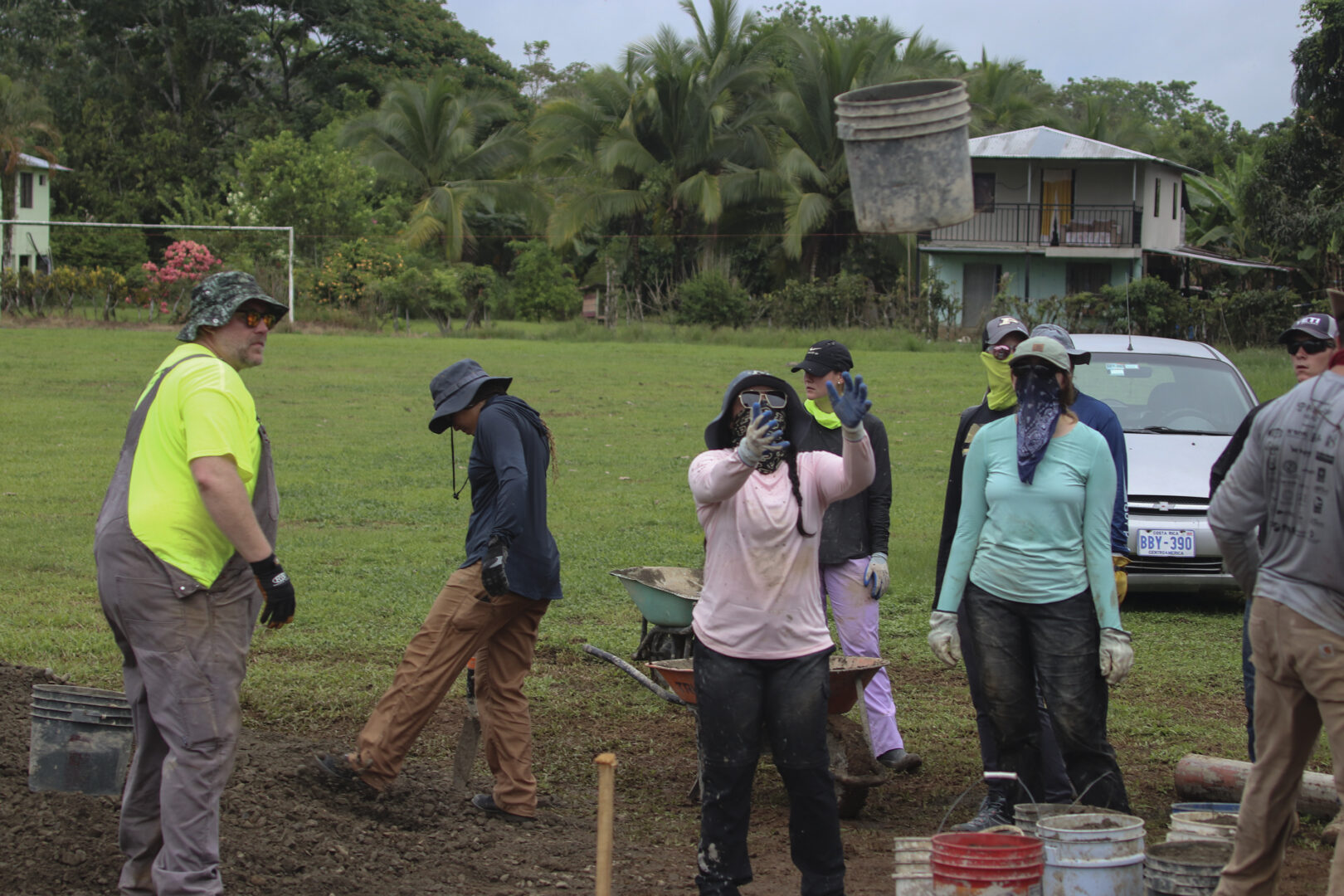
Boilermakers Beyond Borders is a recently formed international travel program for Purdue student-athletes and staff made possible under the John Purdue Club’s Forging Ahead campaign. The program allows Boilermaker student-athletes to give back and expand their worldview through a mission trip benefitting local youth in an underdeveloped country.
This week-long experience wasn’t easy for the Purdue crew. It was stifling hot, the work hours were long and sometimes a bit chaotic, and accommodations were far from luxurious – yet it didn’t seem to matter.
The Purdue contingent provided labor, ranging from clearing rocks from the area to hauling water buckets and cinder blocks.
“It was hard, I am not going to lie,” says Amiyah Reynolds, a member of the women’s basketball team. “To the Costa Rican workers, it was nothing, but we needed breaks, lots of breaks.
“There were ants and bugs, and we slept on the floor. The fact that the locals lived in that and were OK with it taught me a lot. They were energetic and were fighting for a spot to help us.”
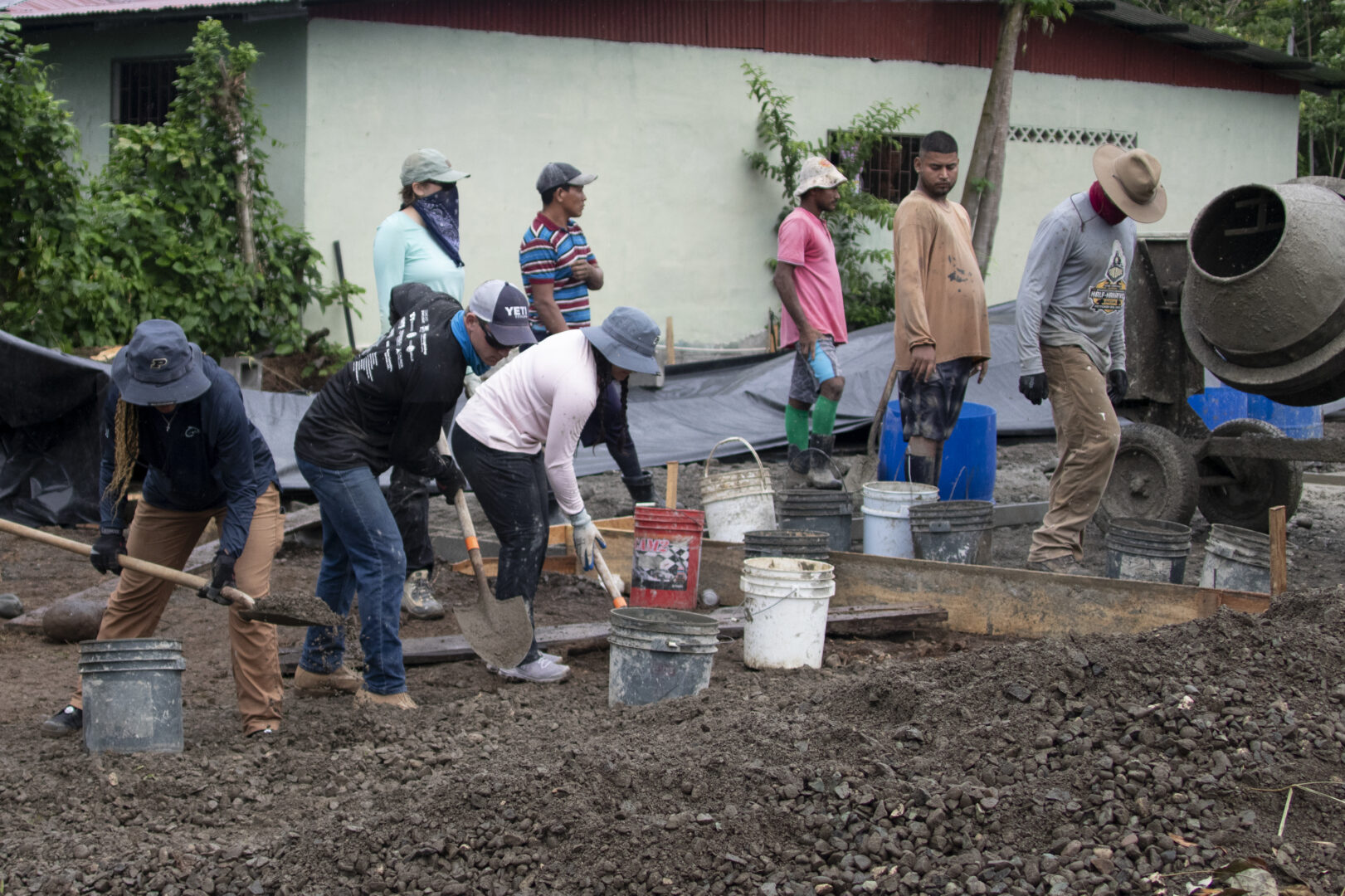
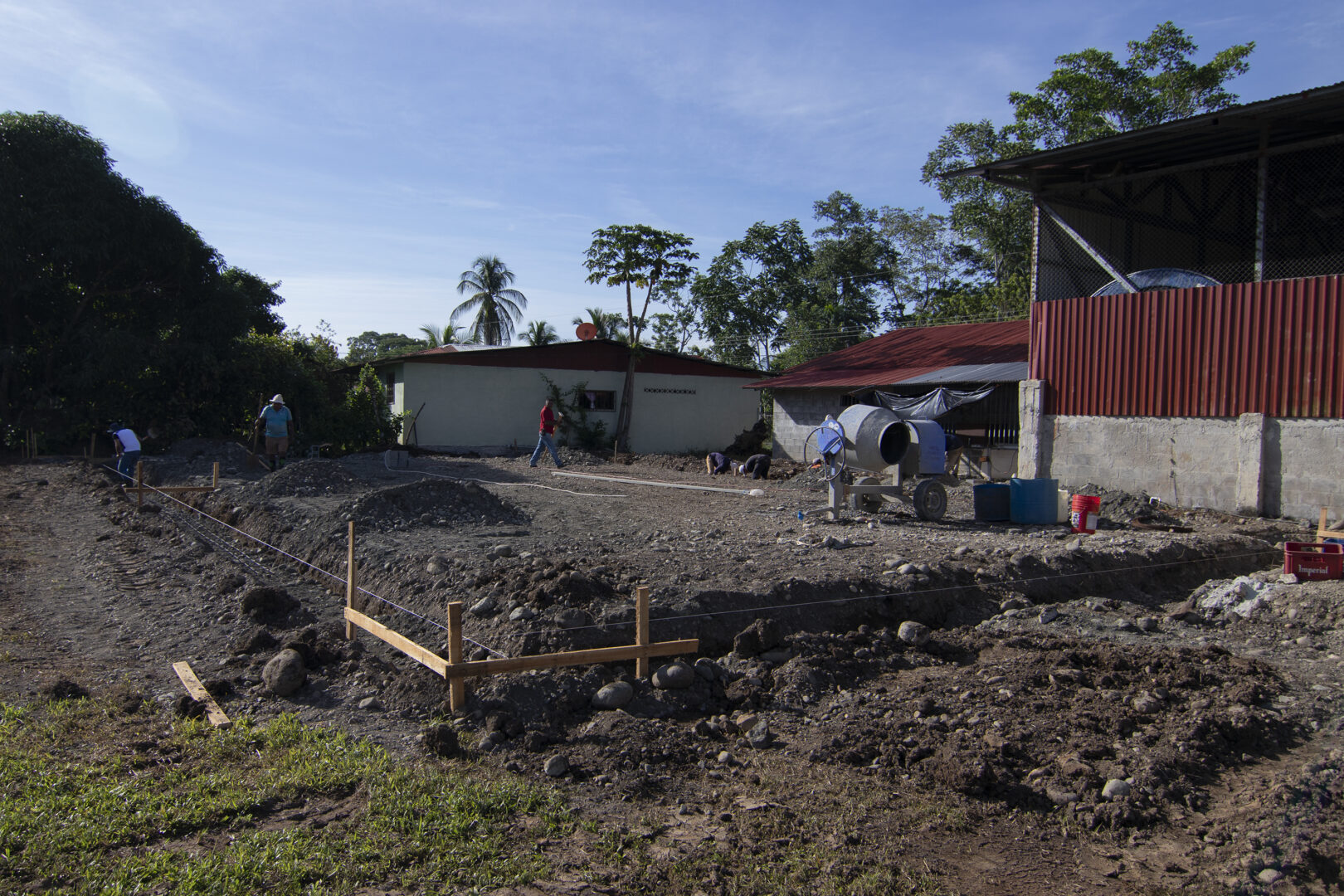
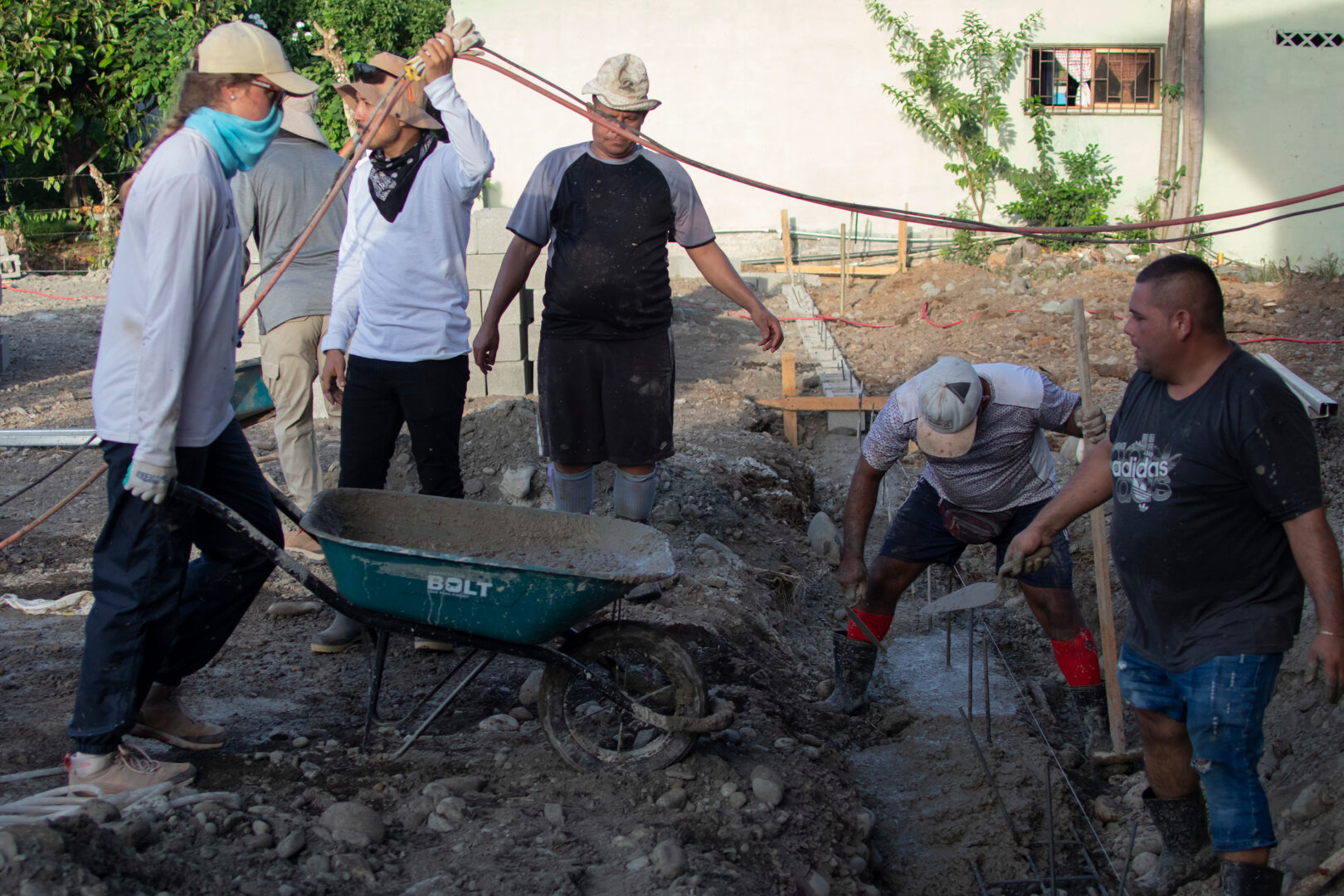

Reynolds said that the locals would race home from their work at the local banana processing factory to get involved, and the kids would do the same when they came home from school. They were all simply happy to pitch in.
Transforming the dirt square into a playing surface took most of the week. The locals eagerly worked alongside the Purdue group, and despite the language barrier, the common thread was finishing the court.
“It was like a team bucket brigade,” says Logan Sandlin, a decathlete for the Boilermakers and recent graduate. “A big takeaway for us is you don’t have to plan everything for it to go well.”
With the work, the locals expressed joy and plenty of it. They worked past dusk most nights, using flashlights to get the job done.
“Life is simple there, but the people seem so happy,” Christofanelli says. “They aren’t at all hung up on the things that we as Americans seem to be, and that was a teaching moment for all of us.”
And the cultural experience came from many different facets of the trip.
“The food was awesome,” Christofanelli says. “We had rice and beans for 21 meals, but it was different and delicious every time. And the fresh fruit was like nothing I have ever had.”
Boilermakers Beyond Borders was, in part, the idea of Kelli Briscoe and Candace Britten, who serve as assistant directors in student-athlete development. The duo also made the trip. After attending a conference, the pair earned support from the athletics department senior staff after submitting a proposal.
Funding for the group’s approximately $35,000 for travel and lodging came via crowdfunding and from the John Purdue Club. Britten says one of the challenges was finding a time when Purdue’s busy student-athletes could go.
“Our job is to help our student-athletes prepare for the real world,” Britten says. “Sometimes they are focused so much on their sport that they don’t see anything past their bubble. Many of our sports don’t have an opportunity for international travel, so this brings it to them. I am a big believer that it is part of a well-rounded experience.”
A common refrain from these Boilermakers was that they gained more from the experience than they put in.
“I got so much out of the trip, but what was special for me was the time spent with our student-athletes,” Britten says. “We had absolutely zero issues. This trip provided memories that will last a lifetime, unforgettable memories. Knowing that Kelli and I helped make that happen is very satisfying.”
Reynolds, who admits to being very introverted, summed up the experience of her fellow student-athletes.
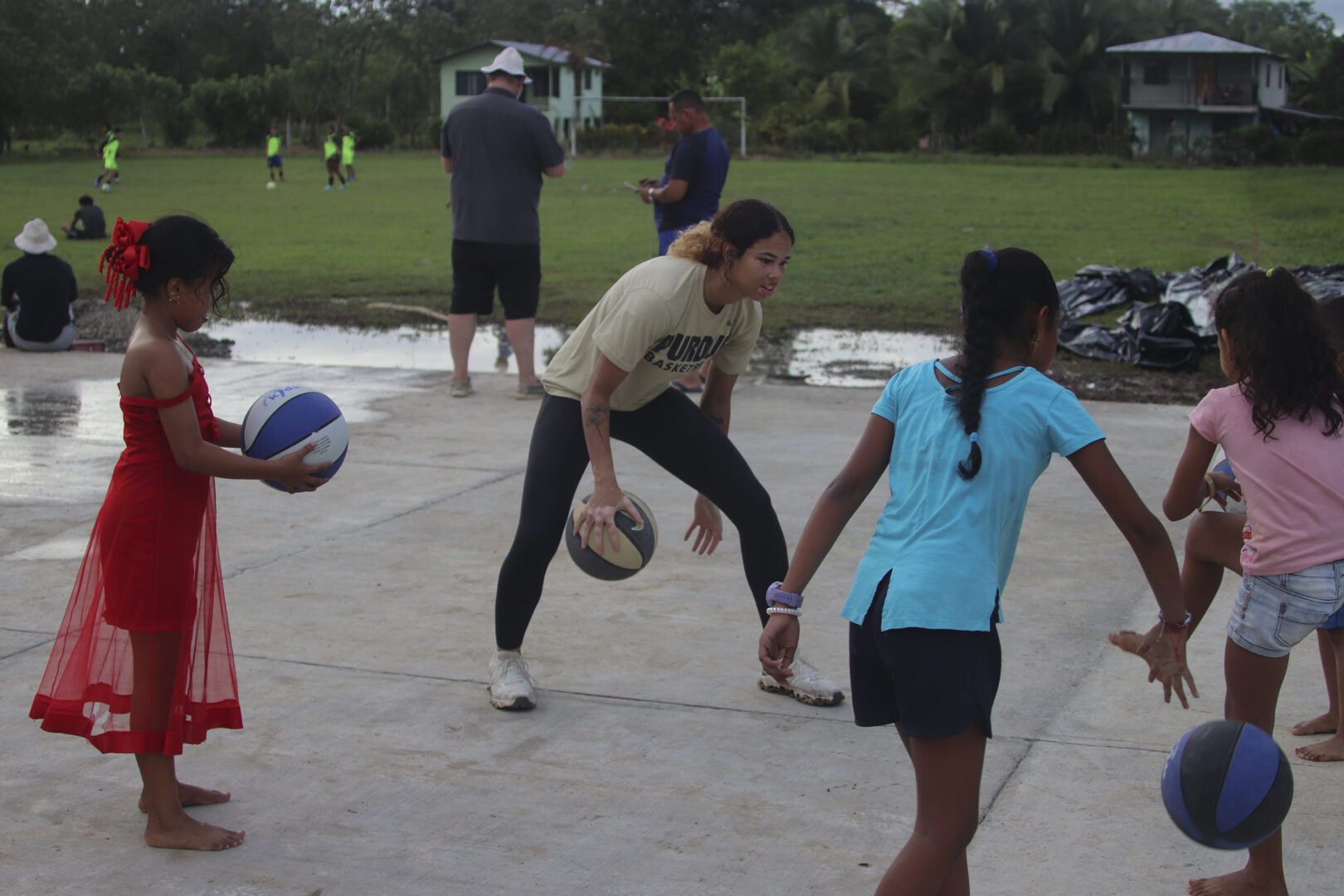
‘It was the most I have ever danced,” says Reynolds, who had a brief opportunity to impart her hoops skills to the children. “Even at 9 p.m., they were blasting music. It got me through those long seven days.
“But it was also so important that I learned about the lives of my fellow athletes at Purdue. I didn’t know their names when we first started preparing for the trip, but by the time we got back home, I felt like we were lifelong friends.”
The group’s experience with the community’s children undoubtedly left an indelible mark.
“The most fun part of it was playing and interacting with the kids,” Sandlin says. “I am so bad at soccer, but it didn’t matter. It was great to connect with them physically, even if we didn’t speak the language. It helped bridge all gaps.”

For Christofanelli, it made him proud to be at Purdue.
“It was great to bond with other Purdue student-athletes, and the experience really embodied what it means to be a Boilermaker,” he says.
In the end, it was about hard work and giving back. But it was also about having fun in an experience that will last a lifetime.
By Alan Karpick, publisher of GoldandBlack.com since 1996.
‘Purdue Global made my dream job possible’
This Purdue Extension educator says an online master’s degree in health education got her exactly where she wanted to go
When someone is trying to make a life change in nutrition or fitness, those who are there to guide often say to “trust the process.” Follow the plan; see results. But because the work is outside a person’s comfort zone, it’s a common experience to lose faith, to wonder if all the hard work is going to accomplish what it promises.
As someone who has spent her whole adult life in the health and wellness industry, Mandy Gray (BS health education ’21, MS health education ’23, Purdue Global) has seen the evidence countless times that food and exercise can heal and prevent disease. Over the years, it’s become second nature to her to trust that process.
“Public health is a huge passion of mine,” she says. “I was a personal trainer for a long time, and I really wanted to try to help people understand that there are so many things we can do to keep our bodies healthy — with nutrition, movement, exercise, mental health. We can prevent disease instead of being reactive.”
But “trusting the process” wasn’t easy in every area of her life.
When she started her bachelor’s degree in 1996, she got two years in before she felt burned out. Having made it halfway through, she found a way to get an associate degree out of the time she put in.
“Finishing the four-year degree was always in the back of my head,” she says. “But I had my first child in 2001, and I thought there was no way I could go back now that I had a baby.”
Once she’d raised that child and then a second one into their school-age years, she decided she wanted to work outside her home part time. And she found the perfect fit as a nutrition education program advisor with Purdue Extension.
“I loved what I did — it was community education,” she says. “I knew this was my thing. But I felt like I could do more. I started classes with Purdue Global as a NEPA because I couldn’t move forward from that with an associate degree, and the job I was really dreaming about required a master’s.”
It would have been easy for her to look at her dream job, recently filled by a qualified person, and decide it wouldn’t be worth it to start a yearslong process to become qualified for it herself. But Gray went in another direction — she decided to have faith that starting the journey toward her bachelor’s and eventually her master’s degrees would lead to the right opportunity for her and her family.
Setting up a comeback with Purdue Global
Even from the start of her role as a nutrition education program advisor, Gray had her eye on a role a little higher up — a Purdue Extension educator — that would give her more autonomy over designing and teaching programs.
“I loved what I did as a NEPA, but I wanted to be able to do more community health programs, and I wanted to stay in my county,” she says. “Extension educators are allowed to teach programs in any single area you can think of that falls under the health and wellness umbrella. It even opens up opportunities for different types of certifications.”
There was no promise — in fact, it was unlikely — that the exact job she wanted would be available at the end of the exact number of years she needed to earn the qualifying degrees. But she had faith in the power of education.
Then it was a matter of figuring out how she could make that process work for her family. When she found an online option through Purdue Global, the pieces slid into place.
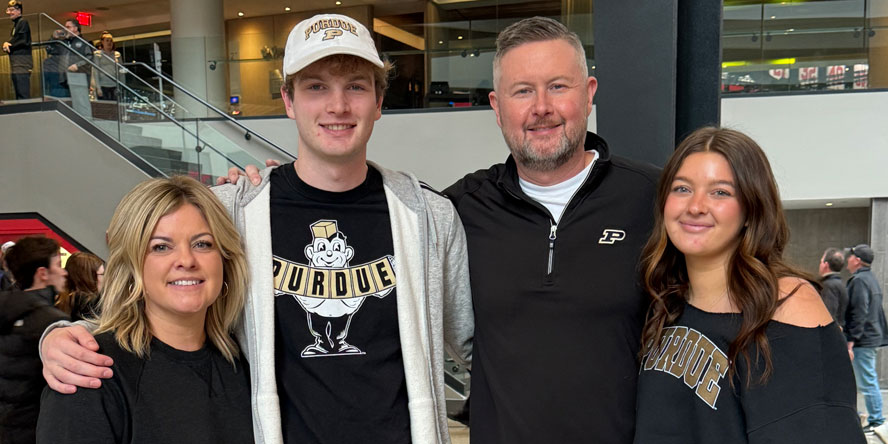
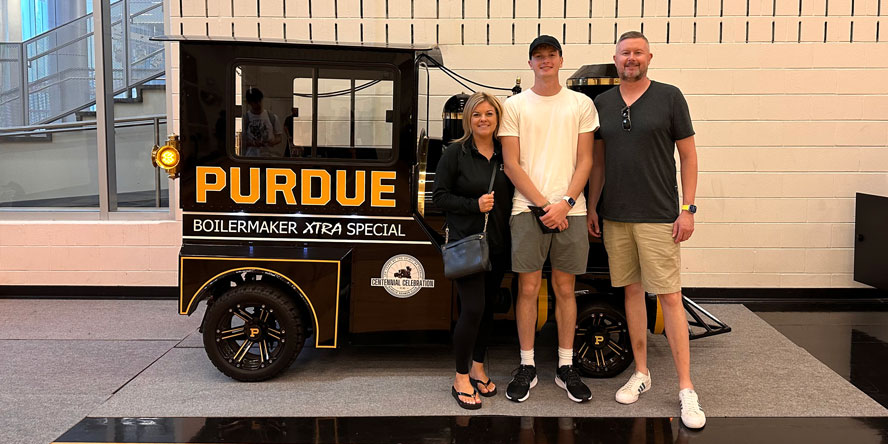
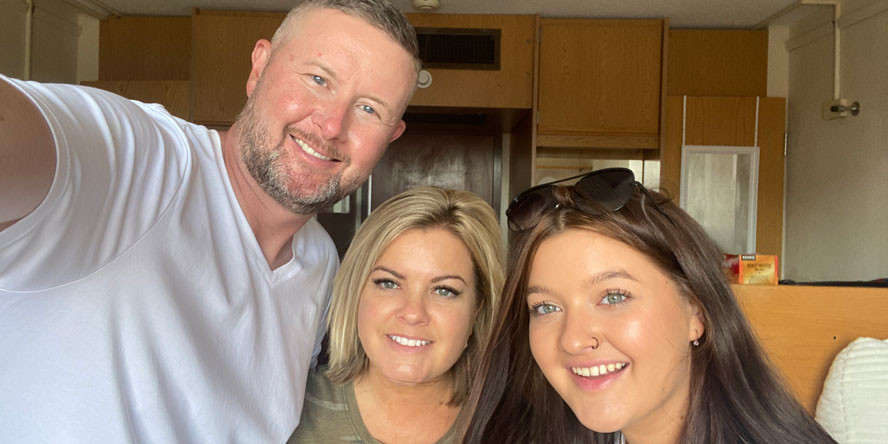
“We’re a Purdue family, through and through. We’ve all gone to Purdue — my kids are at Purdue, my husband graduated from Purdue,” she says. “It was doable, first of all, because it was all online. I could do my classes from anywhere in the world. I could be present for class if we were on vacation, or if I was on the way to a volleyball or a baseball game. I could still be a part of everything my family was doing,” she says.
“I never missed any important moments — ever. I remember going on vacation during my kids’ spring break. Some of the group went to dinner and I said to them, ‘I have a seminar I really can’t miss, but I’ll be here when you get back.’ I may have missed out on a dinner or two, but I still got to go on those trips.”
She finished her bachelor’s degree in 2021. But she still had her eye on the dream job, and that would require a master’s.
I never missed any important moments — ever.
Mandy Gray
BS health education ’21, Purdue Global
MS health education ’23, Purdue Global
A master’s in health education pays off
The Extension educator role in her county wasn’t an open position, but Gray decided to trust the process of setting herself up for the right opportunity. She would continue with Purdue Global and work toward that master’s degree.
“When I was working as a NEPA, someone new had just taken over the Extension educator role in my county. I thought the chances of the job opening up anytime soon were zero. I thought she’d retire from there,” she says.
Halfway through, the unthinkable happened.
About a year before she was due to complete her master’s, she got a phone call. The person who was currently in the job Gray wanted had decided to move on to a different opportunity, and she wanted Gray to have the first swing at it.
“She said, ‘I know you’re close; you’re already working on your master’s degree, so they’ll let you apply.’ I couldn’t think straight!” she says.
“I went through the interview process, and I got it,” she continues. “I wanted it forever. I’ve been promoted a few times since then, and I absolutely love what I’m doing.”
Now Gray looks at her experience as an adult student and says that, while she can’t promise others will be presented with the unicorn of a job she was, she’s proud that she took the steps she did. If she’d banked on the odds and decided against earning her master’s degree, she would have missed the opportunity of a lifetime.
“I don’t do the same thing every day,” she says. “I can teach mental health first aid today. Then I can go teach a ServSafe class tomorrow. The sky’s the limit. With the education I got from Purdue Global, I am able to create the programs I want because I have the training and education behind me. I know how to do that now.
“And I cheer my colleagues on, too. At least five of my colleagues are taking Purdue Global classes right now. I get to help motivate them and cheer them on.”
With the education I got from Purdue Global, I am able to create the programs I want because I have the training and education behind me.
Mandy Gray BS health education ’21, Purdue Global
MS health education ’23, Purdue Global
The path from Nigeria to a future in medicine in the U.S.
Get to know Sade Adeojo and how she achieved her childhood dream with Purdue Global.
Sade Adeojo moved from Nigeria to the U.S. in 1996. From working two jobs to earning a Purdue Global degree, Adeojo’s story is one of resilience and determination, fueled by her passion to help others.
Growing up in Nigeria, Sade always had one goal in mind — to become a doctor.
“I always wanted to be in the medical field. It’s always been my passion,” she says.
As she grew into a young adult, her goal remained the same. In Nigeria, she took some college classes in science technology, which proved to be only her first step in higher education. What she didn’t know at the time is that with Purdue Global’s support, she would go on to earn her nurse practitioner certificate.
“Ever since I was in elementary school, I have always told myself, ‘I’m going to be a doctor,’” she says.
Ever since I was in elementary school, I was always telling myself, ‘I’m going to be a doctor.’
Sade Adeojo
Doctor of Nursing Practice, Purdue Global ’18
From Nigeria to New York
When Adeojo decided to move to the United States in 1996, she knew it would take a lot of hard work to reach that goal of becoming a doctor. In New York, she was putting in long hours working two jobs as a cashier at a 99 cent store and Burger King. The hope of going back to school kept her going during the long days and nights working for minimum wage. And the whole time, she was also busy teaching herself how to live in an entirely new country.
“When I first came to this country, it was a challenge for me to navigate,” she says. “I was able to overcome that culture shock and embark on my academic journey, and I love it here.”
After taking the time to acclimate to her new home, she was ready to go back to school. Not quite sure where to start, she took the first step toward medical school by earning her bachelor’s degree in biology. After she got married and became a mom, she didn’t want to overburden herself by going right into medical school, so she put her dreams on hold. She chose instead to join the medical field by becoming a nurse. That allowed her to keep that same passion for helping others and give her family the best version of herself.
In 2013, after years of working as a bedside nurse, Adeojo was looking for a way to open a new door in the medical field. Her friend told her about Purdue Global’s family nurse practitioner certificate. This was a chance for her to use her years of experience as a nurse to move forward. She graduated from the program two years later but didn’t want to stop there. Her thirst for learning had barely been quenched and, after all, that childhood dream of becoming a doctor hadn’t disappeared yet. That original goal was still lingering in her mind and, with Purdue Global, she finally realized it wasn’t a distant wish. It was possible.
“In 2016, not long after I graduated, I wanted to go back. My goal was always to become a doctor, and at Purdue Global, I saw that it was an option for me,” she says.
She jumped right back into school, earning her doctor of nursing practice (DNP) from Purdue Global. And by 2018, she had the doctorate she had always wanted.
Let nothing stop you from going to school and becoming the best you can be. I encourage people to always move forward.
Sade Adeojo Doctor of Nursing Practice, Purdue Global ’18
Life after earning her DNP
With her DNP finally in hand, Adeojo knew she could start enacting real change in people’s lives. She now works in Pennsylvania as a family nurse practitioner. She’s grateful for how Purdue Global prepared her for this next big step.
“Purdue Global provided the background to be able to start my practice as a nurse practitioner and to be able to care for my patients,” she says. “I learned a lot and it prepared me for what I’m doing now.”
She says her favorite part of her job is being able to recognize the medical problem a patient is having, give them a treatment plan and, when they come back to her, see them happy and healthy. Nothing makes her happier than noticing her patients’ lives have improved in some way after she treats them.
“I love the ability to take care of my patients. When people come back and tell me I helped them or I see a review that says how knowledgeable I am, that makes me so happy,” she says.
But as her number of patients grew, Adeojo realized she needed to offer a new kind of care. She noticed that many of her patients needed psychiatric help, which, with her current skill set, she couldn’t offer. She wished she could help them all in one place, without having to refer them to another clinic. She became determined to earn her psychiatric certification so that instead of referring those patients to someone else, she could help them immediately.
“I started seeing patients that had medical needs, but some of them, I noticed that they have psych issues as well,” Adeojo says. “I said to myself, ‘Let me just go back to school and get my psych certification so that instead of referring those patients, I can see them in my clinic.’”
For a lot of her patients, finding another clinic to treat mental health needs added stress and Adeojo wanted to be able to help. She wanted to be sure that people had access to the same quality of psychiatric care as they had with medical care. Once again, she went back to Purdue Global.
With her postgraduate psychiatric mental health nurse practitioner certificate, she’s excited that she can now expand her clinic to offer additional services.
“It is very important to me because I love to take care of my patients. It has always been my passion,” she says, beaming with joy. “I love what I do in the medical field, and I see that a lot of people need help mentally and emotionally as well. I know I have what it takes to be able to provide that kind of care that they need.”
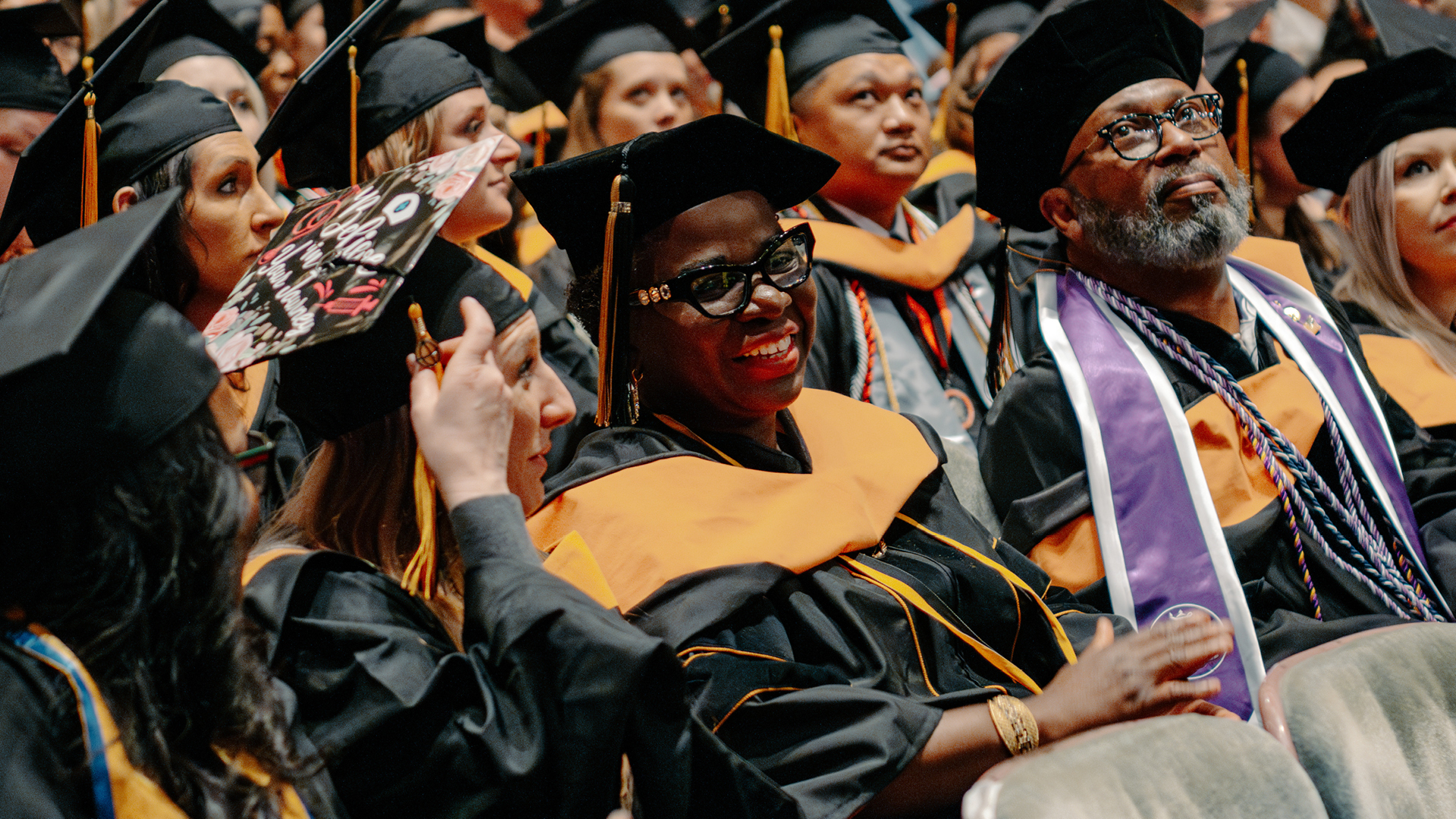
A legacy of education
Beyond her patients and her practice, Adeojo’s educational journey is also important in the paths of people closer to home.
Taking inspiration from her mom, Adeojo’s daughter graduated from her undergraduate program and was shortly thereafter admitted to a doctorate of psychology program. In fact, two of her three kids have dreams of becoming doctors.
As she’s talking about her children, anyone can tell how much it means to her to see her kids inspired by her passion for education and helping others.
“They see their mom graduating at this age and think, ‘If Mom can do it, I can do it,’” says Adeojo, smiling ear to ear.
“My family was very happy and very supportive of me when I decided to go back to school for more education,” she says. Her husband and kids couldn’t be prouder, but Adeojo says she wishes her dad was here to see this moment.
Her father, who passed away before she graduated high school, always told her to never stop learning. So, she kept his words close to her heart: Never stop learning. This is the legacy of learning that stays alive within her and she is proud to pass on to her kids.
“My dad’s legacy was education, so anywhere he is today, I know he would be so proud of me.”
The dream that became reality
As she thinks about her achievements since moving to the United States in 1996, Adeojo emphasizes the importance of persevering through life’s biggest challenges.
“Never give up. Anything is possible,” she says. “Look what I have accomplished at my age!”
“I was working at Burger King. I was working at a 99 cent store. And now I have a doctoral degree. I am able to practice on my own. So, let nothing stop you from going to school and becoming the best you can be. I encourage people to always move forward,” she says.
Beyond her certificates and degree, she says she is always learning from her family and from her patients. And she is overjoyed to be able to positively impact lives every day as a nurse practitioner.
“I feel fulfilled. I feel happy. This was my goal in life, and I’ve achieved it,” she says.
Adeojo is grateful to her support system for what she has achieved. Her faith, in particular, played an essential role in the confidence she needed to persist.
“My husband is very supportive throughout my educational journey, and I can’t thank him enough. Above all, these achievements in life were made possible through the help of God. He has destined me for what I am today, and I am grateful to my maker for all that he has helped to accomplish.”
What’s in a name? Purdue’s Caitlin Clark follows unique path into Navy
Political science alumna juggled sorority life and Navy ROTC commitment while working to fulfill a childhood dream
Caitlin Clark understands all too well the crowd’s reaction when she crossed the stage to accept her diploma at Purdue’s spring commencement ceremony.
It has been a source of amusement over the last few years that she shares a name with a certain superstar athlete — maybe you’ve heard of her — so the commencement attendees’ murmurs, cheers and laughter when they heard her name called were more of a pleasant surprise than a shock.
“It’s made it funny to have restaurant reservations. People never know who’s going to walk in,” says Clark (BA political science ’24), whose hometown, Carmel, is roughly 15 miles from Gainbridge Fieldhouse in Indianapolis, where the other Caitlin Clark is a rookie on the Indiana Fever. “I have gotten a lot of memes about me being a world-famous basketball player. I get a lot of comments, people striking up conversations when I’m out to dinner or at a store or something like that. It’s been interesting — a little bit more attention than I’d gotten previously.”
While their response was understandable, most commencement attendees were probably unaware that there were good reasons to cheer for the Purdue Caitlin Clark’s achievement. That weekend, she joined both her mother and uncle as Purdue alumni and was commissioned into the U.S. Navy, fulfilling a dream she’s had since she was 8 years old.
An unusual fascination
That’s not an exaggeration. Clark became intrigued with the Navy during early childhood when visiting her aunt and uncle in Annapolis, Maryland, home of the U.S. Naval Academy, and interacting with the midshipmen their family sponsored. Her fascination only grew when interacting with the active-duty and special forces service members she met through her dad’s work providing board certification examinations to U.S. Special Operations Command paramedics.
One Sunday while attending a Catholic Mass at the Naval Academy with her parents, Clark observed the many impressive students decked out in their dress white uniforms and spoke up.
“Caitlin asked, ‘Mom, is this hard?’” recalls her mom, Donna York, recipient of three Purdue nursing degrees: an associate (1980), a bachelor’s (1982) and a Doctor of Nursing Practice (2021). “I said, ‘Oh, I think it’s really hard.’ And then she said, ‘I think this is what I’m going to do. It just seems like the right thing.’ So from that point on, everything was about learning about the Navy.”
Clark’s interest never wavered, right up through participation in Purdue’s Naval ROTC program and her commissioning ceremony as a surface warfare officer two days before commencement.
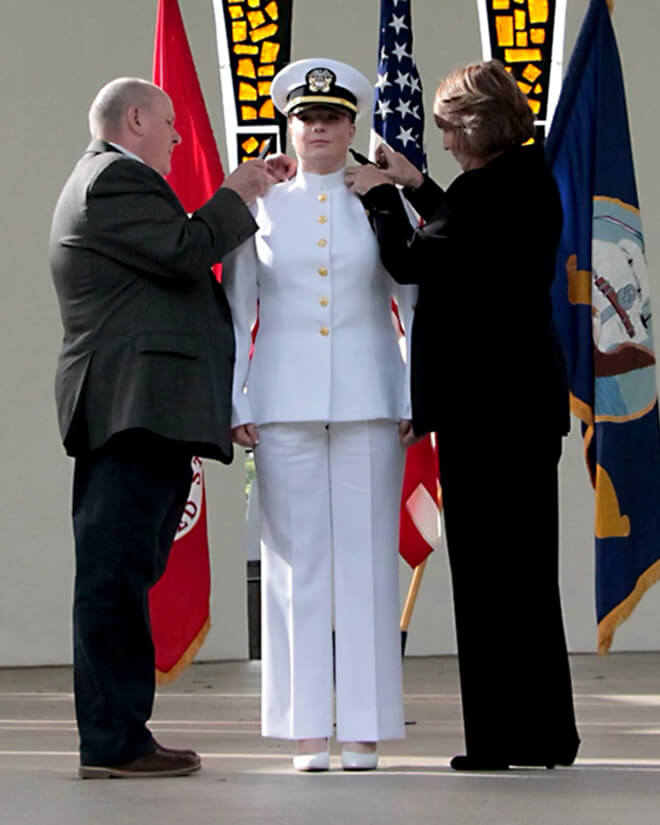
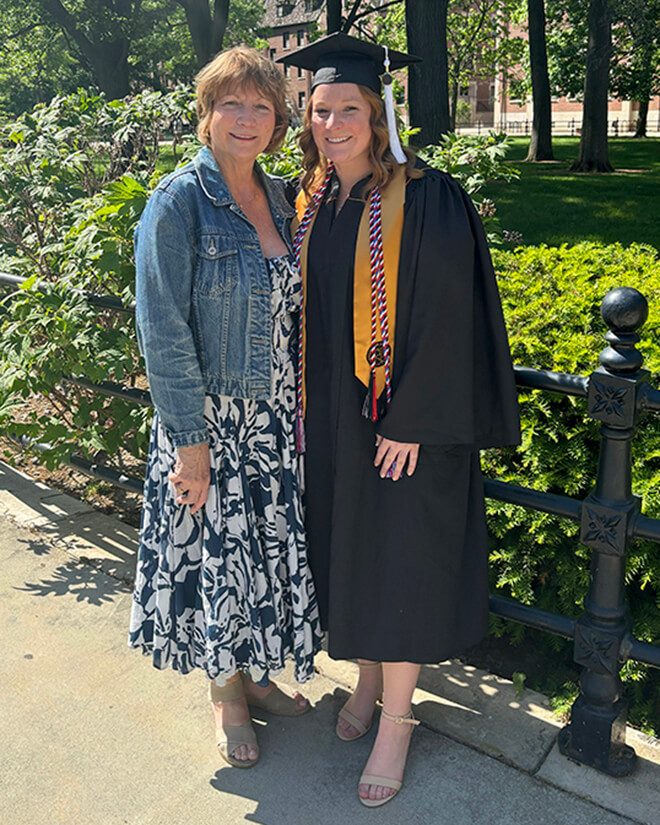
“I’ve kind of geared everything toward this goal of being in the Navy and being the best officer that I can be and being a leader,” Clark says. “That changed what I did in middle school, what I did in high school, where I ended up. It was very surreal for everything that I’ve been wanting in the last 14 years to finally come to fruition and be an actual naval officer.”
In August, she will report for a basic division officer course ahead of a three-year stint aboard the USS Gravely missile destroyer, followed by a two-year shore tour.
“I can’t really tell you why I’ve always wanted to do it, but I have, and I could not imagine doing anything else,” Clark says. “It’s definitely motivating, and it’s motivating to be surrounded by people that think the same way and want to push for the same things.”
A future intelligence expert?
Clark initially planned to follow both of her parents into the medical profession as a naval doctor. However, she jokes that “my love for biology did not persist” as a college student, causing her to change course.
Instead, she found that the classes in her minor, political science, were what truly excited her. That was especially the case when the subject matter dealt with national security and counterintelligence — starting with a course on terrorism taught by assistant professor of practice Melissa Will.
“She was a CIA analyst before, so she had a crazy-cool perspective,” Clark says of Will. “She is an awesome professor, and I think a lot of that stems from all this knowledge that she has from her past life of not just being in academia.”
In addition to sharing perspectives from more than a decade of intelligence-gathering work, Will invites FBI special agents to her classroom to share their real-world experiences with students. Students are often fascinated by this important work, and Will could tell that was clearly the case during conversations with Clark after class.
Pursuing it as a career is somewhat rare, however, so Will was impressed when Clark accepted an internship with the Department of Justice in the summer of 2023.
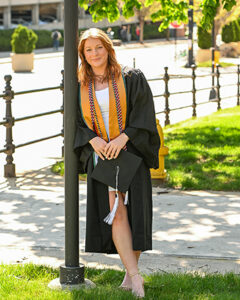
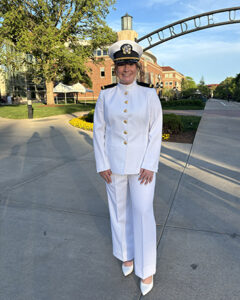
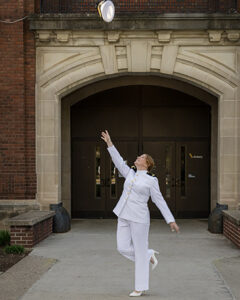
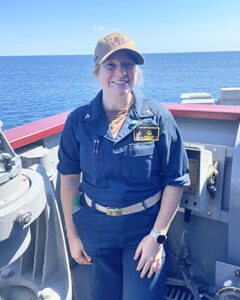

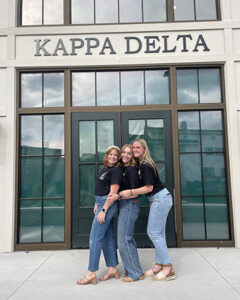
“It was great to see she actually got that internship and was able to take those initial steps down that career path,” Will says. “When she came up to talk to me after class, she didn’t specifically say she wanted to do counterintelligence at that point, but she definitely said she was interested in going into the intel track, which was exciting. I hear that a lot, but then she actually was taking steps to do it.”
Clark built upon that foundation through coursework in her minor, French, including an independent study focused on French foreign policy. Working alongside Jessica Sturm, associate professor of French and applied linguistics, Clark selected relevant news articles to analyze, produced papers and infographics, and created a podcast that explained what she learned during the independent study.
Clark’s interest in counterintelligence evolved during her time at Purdue, to the extent that she now hopes to pursue a master’s degree in the discipline once her three years aboard the Gravely come to an end.
“I feel like I really found my niche,” Clark says. “I wish that I had done it earlier.”
Unexpected extracurricular activity
Clark believes many different aspects of her Purdue experience prepared her for the journey ahead in the Navy.
The ROTC program imparted valuable lessons about confidence, toughness and teamwork to be sure.
“She’s always been confident, but now she knows that if she needs to run 20 miles, she’s going to run 20 miles,” York says. “Nothing is insurmountable, and that’s what I think ROTC helped her see. There wasn’t anything she couldn’t do if she really put her mind to it with the right team.”
Meanwhile, participation in another campus activity — membership in Kappa Delta sorority, which her mom describes as “a juxtaposition that you don’t expect” — sharpened other necessary life skills.
“Kappa Delta taught me a lot about living with the people that you’re leading and living where you work, which I think is going to be incredibly valuable when I’m on my ship in the middle of the ocean,” Clark says.
Clark pledged Kappa Delta at the University of Pittsburgh before transferring to Purdue at the end of a COVID-impacted freshman year where she did not attend a single in-person class and campus de-densification efforts had her living in a hotel room instead of a dorm.
She quickly found a home and community at Purdue’s Theta Nu chapter, which she eventually served as chapter president. Although she was one of only three Boilermaker women who were involved in both the Greek system and Navy ROTC, Clark calls the unusual combination a formative experience that helped her recognize the necessity of employing different communication styles when interacting with two extremely different audiences.
“There’s a switch that you have to make,” Clark says. “The feedback you give to someone in an ROTC setting is entirely different than when interacting with a sorority sister.”
Kappa Delta taught me a lot about living with the people that you’re leading and living where you work, which I think is going to be incredibly valuable when I’m on my ship in the middle of the ocean.
Caitlin Clark, a future surface warfare officer on the USS Gravely
‘Find what makes your soul sing’
Clark’s Purdue journey was unique to say the least, but she looks back and can’t imagine doing it any other way.
She took the steps necessary to fulfill a childhood dream and was exposed to subject matter that could become the focus of her career in the Navy and beyond — and she did it her own way.
“Her dad and I really tried to raise her in a way that we want you to find what makes your soul sing and do it. There’s nothing you can’t do,” York says.
Clark has certainly accepted her parents’ challenge thus far, culminating in the commissioning and commencement doubleheader, which just so happened to occur on Mother’s Day weekend.
“It was like blowing up all your firecrackers all at once,” York says. “It was just amazing.”
Throughout Clark’s time at Purdue, fellow students would marvel at the mettle and time-management skills that were necessary to juggle her military regimen, academic coursework and sorority life. But she pulled it off, providing a template for how students can find ways to make time for the things they love to do. “I feel like I got two totally different experiences that have really helped me become a more well-rounded person,” she says.
She said, ‘I think this is what I’m going to do. It just seems like the right thing.’ So from that point on, everything was about learning about the Navy.
Donna York
on when her 8-year-old daughter, Caitlin Clark, decided that she would someday join the Navy
